When committed to paper, army children's memories often make interesting reading, including, maybe yours, or some that you have read. There follows a small selection.
'My father was a native of Scotland, in the [East India] Company's service; my mother was a Rajpootree, the daughter of a zamindar . . . who was taken prisoner at the age of fourteen . . . My father then an ensign into whose hands she fell, treated her with great kindness, and she bore him six children, three girls and three boys. The former were all married to gentlemen in the Company's service; my elder brother, David, went to sea; I myself became a soldier, and my younger brother, Robert, followed my example.'
Lt Col James Skinner (1778-1841), quoted in Dennis Holman, Sikander Sahib: The Life of Colonel James Skinner, 1778-1841, London, 1961, pp.213-14.
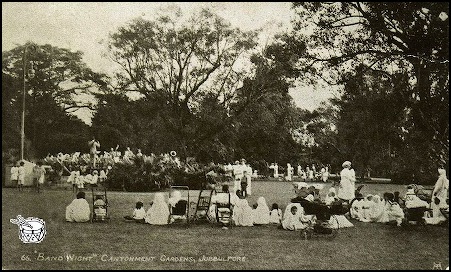
'I remember my father leaving the house and then checking under the car for a bomb before driving to work each morning. This was during the late 1970s, when the IRA was targeting British soldiers serving in Germany.'
TD (b.1964).
TACA CORRESPONDENCE: DO YOU RECOGNISE YOUR YOUNGER SELF?
Michael Few has sent TACA a family photograph (shown here) with a request for help: 'If anyone recognises themselves in this photograph, I would love to hear from you'.
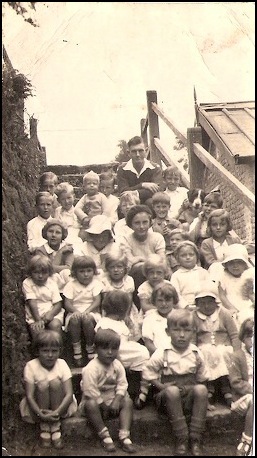
The photograph shows Michael's father, John Few, who was in the Royal Signals, sitting on some stone steps with a large group of children aged between around two to seven years. Written on the back is 'My gang, Sept 1935, Katapahar, Darjeeling, Bengal'. Michael thinks that his father's duties may have included acting as a caretaker at a school in Katapahar, and is keen to learn more. If you can throw further light on the photograph, please e-mail TACA.
PERSONAL STORY: WARTIME IN EGYPT AND SOUTH AFRICA, PEACETIME IN ENGLAND AND SINGAPORE
This army child spent much of World War II in Egypt and South Africa, and later lived in England and Singapore.
'My name is Daisy Caroline Blythe, née Parris, and I was born in Alexandria, Egypt, in 1937. My father, Alfred Leonard James Parris, was in the Royal Army Service Corps (RASC) and married my mother, Georgette Eugenie Youssief, who, according to her birth certificate, was Palestinian, although she, too, was born in Alexandria, Egypt. (Incidentally, all my mother's family were Roman Catholics.)
In 1942, my mother and her children were evacuated to South Africa; my father stayed in Egypt. We were all reunited after World War II.
I have five sisters, including: Valerie, born near Cairo, Egypt (1938); Leonora, born in Palestine (1940); and Christine, born in Alexandria, Egypt (1947); the last two were born in the UK.
We returned to the UK in 1947. After docking in Liverpool, we stayed in a hostel on Lime Street Station (in transit). After that, we were sent to the Isle of Sheppey (in transit).
I met my husband, Gordon (also RASC), when my father was posted to Singapore. We married in Singapore in 1954 and we had four children. My birth certificate and marriage certificate are both army forms.
We have been living in Altea, Spain, since my husband's retirement in 1993.'
Daisy Caroline Blythe (née Parris, b.1937).
PERSONAL STORY: WARTIME IN THE UK; PEACETIME IN MALTA, EGYPT AND OXFORDSHIRE
Chris Fussell's army-child experiences included being billeted in a barn in Northern Ireland and witnessing joyful VE and VJ celebrations in Aldershot. Read on to learn more, and see 'PERSONAL STORY: 'EVER HEARD A SHOT FIRED IN ANGER?'' and 'PERSONAL STORY: BULLFROGS, CICADAS AND MACHINE-GUN FIRE IN EGYPT, 1951' on the 'LIVES & TIMES' page; 'PERSONAL STORY: A MARRIED-QUARTER CRISIS IN EGYPT' on the 'ACCOMMODATION' page; 'PERSONAL STORY: EXPERT FIRST AID IN MALTA', and 'PERSONAL STORY: MAYHEM IN A MALTESE MARRIED QUARTER', below; and the 'SCHOOLING' page ('PERSONAL STORY: MY EDUCATION AS A MARRIED-QUARTERS’ CHILD').
'My dad was a pre-war regular soldier, Royal Warwicks [the Royal Warwickshire Regiment]. He enlisted in 1926, as a starving miner, after the General Strike. He served in Palestine and India (where my sister, Brenda, was born in Poona, in 1935; Alan, my brother, was born in 1930). He rose to be a lance sergeant in the Warwicks' signal platoon (heliographs and semaphore, a few new-fangled radio sets?) by 1939, and was ex-officio keeper of the regimental-mascot antelope. He was severely injured at the start of World War II, but was kept on as 'medically downgraded' in extra-regimental work, away from his beloved regiment, until, eventually 1956!
I was born in Taunton in November 1939. I do not remember it much, and we moved on as Dad became, sadly miscast, a military prison warder in MPSC [the Military Provost Staff Corps]. I remember Northern Ireland vividly, where we lived in the country, near Carrickfergus. There were no married quarters there, so the family – Mum and three kids – lived up a ladder in a farm barn. My first girlfriend, Hazel Clark, aged three, lived next door. (An older woman!) I do recall slow, wartime train journeys; people living in the Tube stations in London; houses in Liverpool backing on to the railway line split open like dolls' houses, with furniture falling out; being sick on the ferry boats; Mum putting a rather oversized toddler (me) into a pram to push me over the Irish Free State border to buy unrationed bacon, butter and eggs, and then wheeling the pram back, with me sitting precariously on top, past winking Southern Irish and Ulster policemen at the border crossing.
Then came Aldershot, North Camp, actually from 1944. Dad was a staff sergeant by then, supervising the cookhouses in the legendary 'Glasshouse' military prison. I recall three or four events of note. There were no school dinners then, so we all spent about ninety minutes' dinnertime at home every day. A test pilot from the neighbouring Royal Aircraft Establishment, Farnborough, crashed a captured German jet plane into the school! There was no school for a while. VE [Victory in Europe] and VJ [Victory in Japan] days – hilariously happy Canadian soldiers touring the area in dazzle-painted jeeps, throwing loads of sweets and toys to the kids in married quarters; Hitler and swastikas and rising suns (for Japan) burning in effigy on huge bonfires. Later, prisoners rioted and set fire to the jail and then sat on the glass roof waiting to be rescued! (Oh, and the sky did go black with planes and gliders once – our lot en route to the Rhine crossing in March 1944?)
Then, in 1947, Malta: sun, sand and swimming. My sailor Uncle Jack coming up from his minesweeper in the Grand Harbour with presents for us from all over the Mediterranean. In 1949, a drab married-families' transit camp back in Hull. Dad left the army briefly, then re-enlisted in the RPC [Royal Pioneer Corps].
Fast-forward to 1951–54, and the Egyptian Canal Zone. Nice flats in Ismailia; riots in 1951; and then quarters in Moascar Garrison. More sun, swimming and sand. My sister could not wait to leave school and worked on the garrison telephone exchange. There was an excellent army children's school, a sort of 'proto-comprehensive' really. I was doing O' level GCEs at the age of thirteen.
Then it was back to reality and Bicester, Oxon, in 1954. Dad's last days in the army. I went to Bicester Grammar School. The girls (I had discovered girls by the age of fourteen!) were all gorgeous and had accents just like Pam Ayres'. (Every time I hear her now on the radio, I’m reminded of the back seat of the school bus.)
I had dreams of "joining the army and learning a trade" (a recruiting slogan of the day), doing my eight years and then investing my gratuity in a nice little radio shop in the corner of Bicester's Market Square (and maybe settling down with Heather from the hairdressers', next to the butcher's shop where I worked part-time after school). Anyway, I went to the Army Apprentices School, Arborfield, in 1954, where by chance I met some "army brats" I'd met before around the world. End of life in married quarters for me?’
Chris Fussell (b.1939).
PERSONAL STORY: EXPERT FIRST AID IN MALTA
Chris Fussell was living in Malta when, as he recounts below, he found himself benefiting from some expert bandaging skills honed during World War II. To read more about his life as an army child, see above, 'PERSONAL STORY: WARTIME IN THE UK; PEACETIME IN MALTA, EGYPT AND OXFORDSHIRE', and below, 'PERSONAL STORY: MAYHEM IN A MALTESE MARRIED QUARTER', and visit the 'LIVES & TIMES' page ('PERSONAL STORY: 'EVER HEARD A SHOT FIRED IN ANGER?'' and 'PERSONAL STORY: BULLFROGS, CICADAS AND MACHINE-GUN FIRE IN EGYPT, 1951'), as well as the 'ACCOMMODATION' page ('PERSONAL STORY: A MARRIED-QUARTER CRISIS IN EGYPT') and the 'SCHOOLING' page ('PERSONAL STORY: MY EDUCATION AS A MARRIED-QUARTERS' CHILD').
'I was attending Sunday school in the Royal Navy dockyard a bit unwillingly. At eight years old, I just wanted to go to the beach! As soon as school was out, I ran for the (glass) doors and stuck my hand out to open them. But my aim was bad, so my hand hit not the doorframe, but a glass pane! So there I was standing there, with my forearm through the door, dripping blood. I couldn't cry – girls, including my big sister (aged twelve), were watching.
A sympathetic chaplain eased my hand out, took me to the vestry and proceeded to "débride" the wound with a very stiff scrubbing brush and cold water. A clucking lady gave me a glass of milk, which I threw up. He slapped on iodine, seemingly by the pint, and bandaged up my arm tightly (a technique that he had learned on the Malta convoys, he rather boasted).
I must have missed the clucking lady when I was sick because she ran us home in her Austin 7, a trendy runabout in those post-war (1947) days. My sister cringed away from me on the back seat for fear of getting iodine or blood on her Sunday dress. Mum scolded me in the kitchen of her little MQ [married quarters] in Corradino and insisted on unwrapping the chaplain's handiwork. She almost fainted at the sight of strips of flesh hanging off my arm. Dad, who was ever underrated in our family, said "Don't be soft, woman!" and snipped off the fragments and repeated the chaplain's dressing – tighter! (He had dealt with casualties on the road back to Dunkirk in 1940, but he never talked about that.)
Two hours later, having skipped Mum's lunch, we were on the beach at lovely Ghajn Tuffieha (today renamed "Golden Sands" or some such for tourists?). I was half-dressed as I tucked into eggs and chips from the beach café. Ever practical, Dad inflated an old motorbike tyre so that I could float on the water, if not swim, secured, tethered to a rock, by our spare clothesline. My sister had stopped moaning. Happy, happy days!'
Chris Fussell (b.1939).
PERSONAL STORY: MAYHEM IN A MALTESE MARRIED QUARTER
Chris Fussell's tale of the night that his family's dogs ran amok on Malta highlights the contact that many army children had with former enemies – in this case, German soldiers turned prisoners of war – in the years immediately following World War II. To read more about Chris' life as an army child, see above ('PERSONAL STORY: WARTIME IN THE UK; PEACETIME IN MALTA, EGYPT AND OXFORDSHIRE' and 'PERSONAL STORY: EXPERT FIRST AID IN MALTA') and visit the 'LIVES & TIMES' page ('PERSONAL STORY: 'EVER HEARD A SHOT FIRED IN ANGER?'' and 'PERSONAL STORY: BULLFROGS, CICADAS AND MACHINE-GUN FIRE IN EGYPT, 1951'), as well as the 'ACCOMMODATION' page ('PERSONAL STORY: A MARRIED-QUARTER CRISIS IN EGYPT') and the 'SCHOOLING' page ('PERSONAL STORY: MY EDUCATION AS A MARRIED-QUARTERS' CHILD').
'Our home in Malta between 1947 and 1949 was a nice little sandstone bungalow in the shadow of the old ramparts of the fortress city of Valletta. The place was called Corradino, the nearest town being Pawla. One of the forts in those ramparts had been converted into a tri-service detention barracks for offenders from the RN, army and RAF. Due to disability, Dad had been seconded away from his beloved regiment, the Royal Warwicks, as a prison officer, and he was a reluctant "screw". There were five of us initially when we went there: Dad, Mum, Brenda (my big sister), me, aged seven, and a big, friendly, nondescript dog, called Bob, I think.
There was no TV in those austere days, and the cinema reigned supreme. The RN ran a good one down in the dockyard area, so most Saturday nights we trooped down there, leaving Bob to guard the house (there were burglars about). This went well until we acquired a second dog, in the usual way of service families, from some friends who had been posted back to the UK and wanted a good home for a well-loved pet. This one was a chihuahua! "Looks like a rat", Dad said, but Mum liked him. He and Bob seemed to get on OK, despite the great difference in their sizes, and they played constant, boisterous games of hide and seek and chase together around the house and garden. The odd bit of furniture got knocked awry, but there was no real harm done.
One Saturday night we got back to the house from the cinema. It was eerily quiet. Furniture had been overturned, things were smashed and curtains had been pulled down. Worse still, there were splashes of blood all around the lightly painted walls. "Burglars," said Dad, and he reached for his prison warder's-issue truncheon, "but where are those dogs?" Then we heard pitiful whining. Bob, the big dog, was pawing at the bathroom door. One of his ears was gashed and dripping lots of blood. We hunted inside the bathroom and found that the chihuahua had jumped inside the toilet bowl for refuge; only his nose poked over the seat and he was scrabbling to get out again. After several big cups of tea and more pipes of "baccy", Dad deduced that the dogs had played together while we were out, but then the little one had nipped the big one's ear, probably by accident. He had not seen it that way, though (and any animal's ear bleeds very readily), and had chased the little 'un all around the place in true Tom-and-Jerry style until the toilet bowl had beckoned as a refuge.
A week or so later, with approval from on high, Dad had a gang of German prisoners, who were mysteriously kept in custody in Malta for years after the war was over, in to repaint the house. They – the Germans – turned out to be really nice fellows. After a few days, they were showing Mum pictures of their families back home, she was making them tea and egg and chips, and they were carving excellent wooden toys for us children. And the house was painted really well. I hope they all eventually got home OK after we had left Malta in 1949.'
Chris Fussell (b.1939).
PERSONAL STORY: LEISURE TIME IN LIBYA
Although his father was a civilian, Mick Kiernan effectively became an army child when his family lived in Benghazi, in Libya, between 1951 and 1955. Here, he recalls how he spent his leisure time there between the ages of twelve and sixteen. (To read about Mick's stopover in Malta in 1951, click here; and click here for some memories of his schooldays in Benghazi.)
'My father's employment as clerk of works meant that although a civilian, he was entitled to use the facilities of the Warrant Officers' and Sergeants' Mess located in Berka, and most Sundays would find us there. I was allowed to play darts and have a drink in the bar, followed by lunch in the dining room. At that time, Dad had a motorbike and sidecar, and we usually drove home with my mother in the sidecar, me on the pillion and Dad in exuberant mood.
In the extremely hot summer, we only had lessons from 8 am until 1 pm. For some reason, we had Wednesday afternoons free in the winter, and most of us headed to the cinema run by the AKC [Army Kinema Corporation] to watch the weekly film. Before we went in, there would be Arab boys in the street selling us peanuts, chewing gum, sweets etc from the large wicker bowls that they carried balanced on their heads. From 1953, at least three evenings of the week would find us at the AKC cinema, where the films changed four times every seven days.
By the winter months of 1953, we were spending most weekends and Wednesday afternoons at the sailing club in Benghazi harbour. It was a perfect winter playground: there were many upturned sailing boats on land for cleaning and refitting for the next year's racing season, and they made ideal hiding places when we were playing hide and seek.
The club had two separate buildings, each comprising a bar/lounge, locker rooms and so on. One was for officers and their families, and one, for other ranks [ORs], warrant officers and below. At that time my father had OR status, and our clubhouse was nearest to the sea overlooking the harbour. Beside the clubhouse there was a basketball area, which had a very smooth surface that was ideally suited to roller-skating. We made our own sticks and pucks and played our version of ice hockey – there were many bruised shins.
In 1954, most afternoons would find me at the sailing club with friends, where we spent a good deal of time in the swimming pool. The pool was formed with pontoons anchored in the sea to make three sides of a rectangle, the fourth side being the concrete hard surface, where steps and diving boards were sited. We had our own water-polo ball and practised throwing and swimming for long sessions in the late afternoons, when we had the pool to ourselves.
When the cricket season was on, we took the game very seriously. I was a fast bowler, and in common with the other bowlers, I had my own cricket ball. Waiting for the TCVs [troop-carrying vehicles] to take us to school in the early morning, we practised throwing and catching. One morning, the truck pulled in and the soldier on duty as conductor jumped down and shouted "Over here" to the lad who had the ball in his hand. The ball was lobbed high in the air to the soldier, who placed himself directly below it and, as it dropped towards the ground, he headed it. He fell to his knees and we rushed over to him as a huge bruise came up on his forehead as though by magic. To this day I can picture the scene as, for a split second, we all froze, realising what he was about to do.
We had a lucky escape in 1954 when a crowd of us, about ten boys and girls, hired bikes and took packed lunches for a day at Long Beach, a mile or so beyond the town's outer limits. Upon arrival, we dropped the bikes amongst the sand dunes at the back of the beach, stripped down to swimming costumes and headed, en masse, to the sea, where we spent a long time swimming and playing in the breakers. When we eventually decided to leave the water, it was to discover that we had been carried about 100 yards or so along the coast, to a point where the dunes reached down almost to the water's edge. We plodded up and down the grass-topped sand hills for about 30 yards before arriving at the hard-packed salt flats, where we encountered a rusting barbed-wire fence. Once through the fence, we were able to see signs hanging at intervals on the wire. They showed a skull and crossbones, below which were painted the German words "ACHTUNG MINEN" ["CAUTION, MINES"]. We had walked through a minefield! I don't know if it had been cleared, but it certainly gave us something to talk about!'
Mick Kiernan (b.1939).
PERSONAL STORY: ‘THERE WERE NONE OF THOSE RAINY, FOGGY DAYS OF THE UK. GOOD TIMES’
Following his birth in Cumberland in the middle of World War II, it would be over five years before Donald Bridge would meet his father, who was serving in the Royal Army Ordnance Corps. Donald, who has kindly contributed his childhood photographs to TACA, tells the story of his life as an army child thereafter in a ‘travelogue’ that takes in postings to England, India, (West) Germany, the [Suez] Canal Zone and Cyprus. Click here to read an account of his schooling (‘PERSONAL STORY: ‘MY SCHOOLING AT ARMY SCHOOLS WAS ON A PAR WITH, IF NOT BETTER THAN, AT THOSE NON-ARMY SCHOOLS THAT I ATTENDED’), while one of his cache of photographs (of a Sunday-school teacher in Bad Oeynhausen, (West) Germany) also appears on TACA’s ‘SCHOOLING’ page.
‘I was born in Carlisle, Cumberland, in 1941. My mother was, at that time, living at 16 Annan Road, Gretna, but my father was away at war at my birth. My father, Thomas Donald Bridge, was a professional soldier in the Royal Army Ordnance Corps (RAOC) and, at the time of my birth, was a staff sergeant. He had joined the RAOC at Hilsea Barracks, Portsmouth, on 26 July 1935. Although born in London, he had gone to India as a baby. His brother Harry, two years older, had been born in India at Allahabad, and was also a professional soldier all his life with the Royal Electrical and Mechanical Engineers (REME). Their father, Harry H Bridge, was in the Indian Army Ordinance Corps (IAOC), retiring in 1932 to 32 Queens Road, Walthamstow, E17. My grandfather was an Air Raid Precautions (ARP) warden early in World War II before being recalled to the Indian Army, then serving at the India Office until retiring again in 1948 and being awarded the MBE for his services to India. Upon his retirement, he moved to 20 Fairfield Gardens, Portslade, Brighton, Sussex, and this house was left to my father on the death of my grandfather. My mother, Maud Marion (née Courtman), lived at 9 Knotts Green Road, Leyton, E10, and met my father at Walthamstow tennis club. Both were very good tennis players, my mother slightly the better. They were married in September 1939.
In January 1940, my father was sent to the British Expeditionary Force (BEF) in France, and, after the fall of France, came out via St-Nazaire on 26 June 1940. He was posted to Longtown ordnance depot, near Carlisle, and my mother joined him there, living in lodgings in Gretna. My father was posted to the Middle East Land Forces (MELF), and was serving in that theatre of the war, in North Africa, Egypt and Palestine, from 14 November 1940 until 29 February 1944. He was at the first siege of Tobruk. Because he was fluent in Hindi, he was transferred to the IAOC on 5 March 1942 and served the rest of the war with Indian troops. On 1 March 1944, he was transferred to India. My mother stayed on at Gretna until my birth owing to the bombing in London (Leyton was on the bombing path for German aeroplanes), and was joined by her mother, Alice Courtman, shortly before my birth, all of us returning to 9 Knotts Green Road when I was about three months old, where we lived until about September 1946.
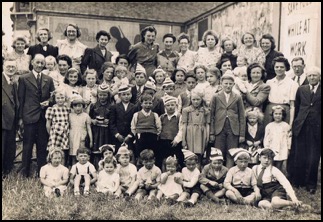
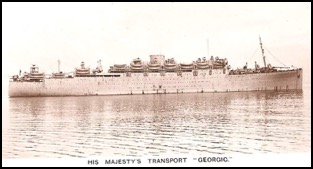
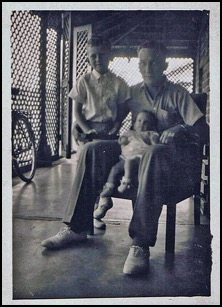
Above: Pictured in Kirkee, India, in late 1947: my father, Sub-Conductor T D Bridge, RAOC; me, aged six; and my sister, Sheila, who was then only a few months old.
THE 1950S AND 1960S: POSTINGS TO (WEST) GERMANY, THE CANAL ZONE, CYPRUS AND ENGLAND
On 24 April 1950, my father was posted to headquarters, British Army on the Rhine [BAOR], and we all moved to Bad Oeynhausen, staying at 28 Stein Strasse. Whilst in (West) Germany, we went twice on holiday to British forces summer-leave centres at Norderney (one of the East Frisian Islands) and Scharbeutz (on the Baltic, near Lübeck) and once to a winter resort at Ehrwald, in Austria, near Garmisch-Partenkirchen.
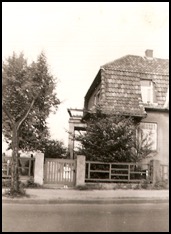
Below: The NAAFI at Bad Oeynhausen.
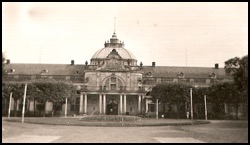
We left Germany on 20 August 1953, when my father was posted back to England for onward deployment to the Middle East Land Forces at Moascar, Ismailia, Egypt. We went to stay at Westbourne Transit Camp near Emsworth, Hampshire, to await a passage to the [Suez] Canal Zone. My father went to Egypt on 6 October 1953, and we then followed him, leaving Southampton on the troopship Empire Ken in early 1954, and arriving at Port Said via Algiers on 26 January 1954.
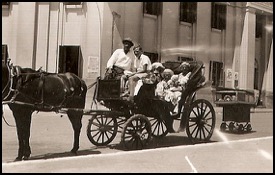
Below: 9 Gallipoli Road, one of our homes in Moascar.
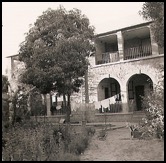
Below: The NAAFI, on Moascar’s main road.
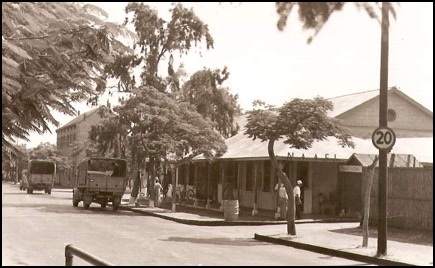
Below: Moascar garrison’s sports field.
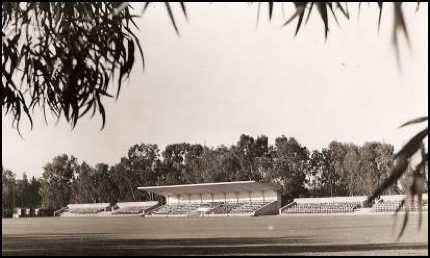
Below: The garrison swimming pool in Moascar.
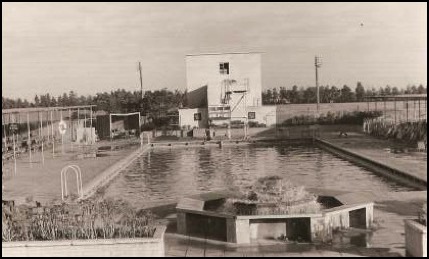
In Moascar, we stayed in two houses, the last being 9 Gallipoli Road, until 20 October 1955. We went on holiday to the Sea View Holiday Camp at Port Fuad.
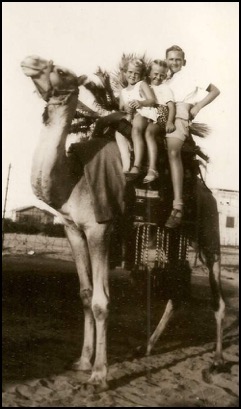
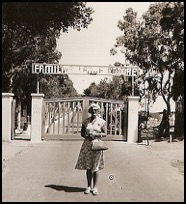
Above: My mother outside the entrance to Sea View Holiday Camp, at Port Fuad, in 1955.
Left: Me and my sisters, Sheila and Barbara, on a camel at Sea View Holiday Camp, in August 1954.
Below: The Bridge family at Lake Timsah in 1955, with the Anzac war memorial in the distance.
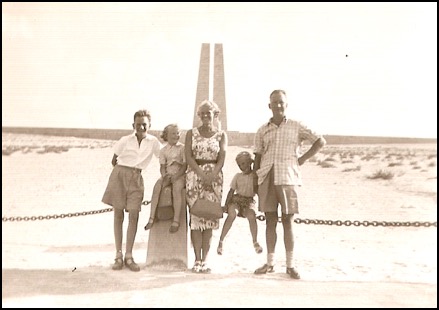
With the running-down of the forces in the Canal Zone and the closure of the British bases in Egypt, my father was transferred to headquarters at Fayid, on the Great Bitter Lake, and then immediately to Episkopi, in Cyprus. We left Fayid by aeroplane (it was my first air journey) for Nicosia, arriving on 20 October 1955. In Cyprus, we lived in a hastily constructed village of pre-fabricated houses at 11 Jacaranda Drive, Berengaria Village, Limassol.
Below: 11 Jacaranda Drive (left), our married quarter in Berengaria Village (right).
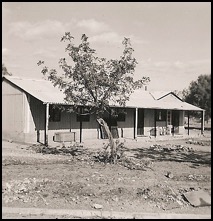
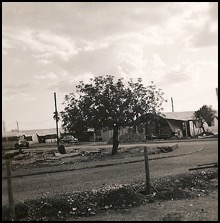
We arrived in Cyprus just as the independence movement, enosis, and its terrorist arm, EOKA, was getting into full gear, and my father had to go to and from work at Episkopi in an armed convoy. Berengaria Village was surrounded by barbed wire, but we were used to this because so were Bad Oeynhausen and Moascar. However, I did not like Berengaria Village. As a growing teenager, I felt restricted after the life in Moascar (school until 13:00 hours, then the afternoon spent at French Beach, at the northern end of Lake Timsah, swimming and watching the ships pass up the Suez Canal) and became rebellious. Also, the threat to teenage English boys from EOKA was quite real: you could be shot, for a fifteen-year-old schoolboy looked rather like a seventeen-year-old national serviceman. So my parents decided that I should go to England to start a career, and I was asked what my choice would be. After watching the ships on the Suez Canal, my answer was the merchant navy, so on 24 August 1956 I left Famagusta on the troopship Dunera for Southampton, arriving there on 3 September 1956. The Dunera was returning empty to England, having brought troops out for the 1956 Suez landings. I was sent to the training ship HMS Worcester, off Greenhithe, in Kent, spending two years there until July 1958, when I was apprenticed to the Ellerman & Bucknall SS Company, with which I spent eight years at sea. My time at sea was spent travelling to the Persian Gulf, India, Ceylon [Sri Lanka], Pakistan, Malaya [Malaysia], Hong Kong, the Philippines, Japan, Australia, South Africa, South-West Africa [Namibia], Angola, the Congo, the USA and Canada, (West) Germany, the Netherlands, Belgium and France.
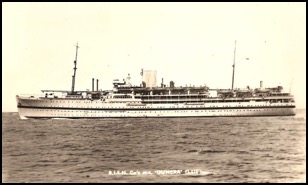
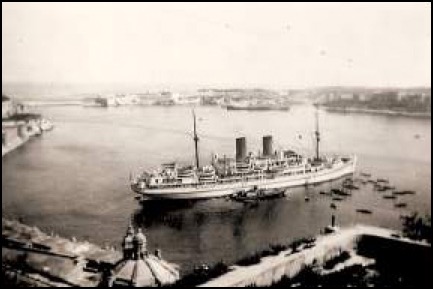
In the meantime, the family left Cyprus on 18 March 1957, when my father was posted to the ordnance depot at Bicester, in Oxfordshire, and they moved into married quarters at 6 Ernicot Close, Ambrosden. They stayed there until some time in 1961, when my father, by now having been commissioned, was transferred to the base ordnance depot at Viersen (near Rheindahlen), in (West) Germany. We lived at first at 35 Hugo Eckener Strasse, in Mönchengladbach, and then moved into one of a group of seven newly-built married quarters amongst the German population in Viersen. During this time, I was at sea either with Ellerman Lines or at college in London.
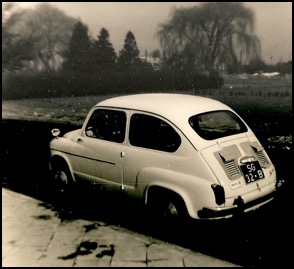
In mid-1965, my father was posted back to Bicester, and the family returned to Ambrosden, where we lived at 1 Quinton Avenue until 1971, when my father retired from the army with the rank of lieutenant-colonel. By that time, I had emigrated to South Africa and was living in Cape Town. My sister Sheila had married a soldier (who later worked as a civilian at the Bicester ordnance depot) and was living in Bicester; my other sister, Barbara, followed me to Cape Town in 1970. When my father retired, he bought a house in Launton Road, Bicester, and he and my mother lived there for about a year before coming out to Cape Town for a six-month holiday in 1972 and staying for four years. They sold the Launton Road house to Sheila and her husband, Eddie, and when they returned in 1976, they went to live in Portslade in the house that my grandfather had left to my father on his death in 1973. My mother died in Portslade in 1983, and my father, in Brighton in 1984, and there is a memorial to them in the gardens at Wakehurst Place in Sussex. Sister Sheila is still living in Bicester, and sister Barbara is living in Barrydale, near Swellendam, about 250 kilometres from Cape Town on the way to Johannesburg.
CONCLUSION
I agree with one of TACA’s contributors that returning to England from overseas was always something of a disappointment. England, especially during the 1940s and 1950s, seemed poor and somewhat backward in comparison to where we had been living in army bases overseas. All of the houses that we lived in in Germany had central heating, which was a rarity in England after the war. I also remember the crisp, clear winters in Germany, especially in Viersen, where it snowed in November, the snow then staying on the ground for the next three or four months, with blue skies overhead on most days. There were none of those rainy, foggy days of the UK. Good times. I loved it. All my mother wanted was a home of her own without moving, though, and she ended up at 20 Fairfield Gardens, Portslade, Brighton, which she disliked, and died there. I ended up in Cape Town. I couldn’t settle in the UK after all of the travelling. I hope that I haven’t bored you with this travelogue.’
Donald Bridge (b.1941).
PERSONAL STORY: MEMORIES OF AN ARMY CHILDHOOD
Roger Hall has already made guest appearances through his brother on TACA, in Richard Hall’s contributions to the archive (‘PERSONAL STORY: HAPPY DAYS IN HONG KONG, 1953’ and ‘PERSONAL STORY: MEMORIES OF MÜNSTER, 1958–60’). So it is fascinating to have the opportunity to read Roger’s wonderfully detailed side of the story, which begins in Woolwich, during the 1940s, and continues, following a long sea journey, in Hong Kong during the early 1950s, before moving on to England and (West) Germany.
‘My earliest memories of being an “army brat” date from the late 1940s, when I was living with my mother and father in married quarters in Woolwich, south-east London, which was then the headquarters and depot of the Royal Artillery. My father was a staff sergeant who had joined a Royal Engineers Territorial Army unit in 1938. At that time, the unit to which he belonged was a searchlight detachment working in conjunction with the anti-aircraft guns of the Royal Artillery. The two elements were then merged, and so my father became a gunner. He served in North Africa and Italy and was mentioned in despatches.
I was born in 1943, but did not see my father until I was two years old. I was told later that I was distinctly hostile to him. He returned to Italy after the German surrender and finally came back to the UK in 1947 and left the army. He was not happy in civvy street, however, and rejoined the army and was posted to Woolwich. The quarter that we lived in was in one of two Victorian tenement blocks, one called East Block, and the other, Old Block. The accommodation was very basic, had stone staircases with iron railings, and was very cold in winter. I recall huddling around an open fire trying to keep warm during a particularly cold winter (probably 1947).
London at that time suffered from smog during the winter months, and I recall walking to and from my first primary school, just off the Plumstead Road, in those conditions. Occasionally, the journey was taken by tram before they were withdrawn in 1952. I can still hear the distinctive clang and rattle that they made. At lunchtime, we were walked to an annexe down the road for school dinner, where the prevailing smell was of boiled cabbage. Woolwich was a place full of military history, and I recall captured artillery pieces displayed at the edge of the parade ground in front of the main barracks. There was also the Rotunda artillery museum containing many historic pieces of artillery. Visits to the barracks were not uncommon, and I can recall the 25-pounder guns lined up for inspection. They were towed by a Morris “Quad” vehicle, with an ammunition limber attached between gun and tractor. My father had become a quartermaster, and I was treated to visits to the stores and armoury, where I was offered “tea and wads” (buns).
My father worked with a civilian transport contractor known as “Pop” Barnes, and during the school holidays I travelled in the cab of one his lorries all the way to Isleworth, which, to me, seemed like the other side of the world. Another Woolwich attraction was the free ferry across the Thames. It was fascinating to watch the great cranks of the engine working from a viewing platform on the passenger deck. Sunday walks were taken across Woolwich Common, passing the former Royal Military Academy and the Herbert Hospital, which, I believe, was a military hospital. My brother was born in 1948, and coincidentally, or not, his first two initials are R A. Furthermore, he was christened in the Royal Artillery chapel.
In early 1952, my father was posted to Hong Kong. He travelled on the troopship MS Dunera. The three remaining members of the family remained in the UK, with a promise that we would follow in due course. We then moved into an army-requisitioned semi-detached house in Welling, Kent. I attended Little Danson Primary School, which I enjoyed. After nearly a year of separation, my mother – who had tired of waiting for news of our travel arrangements – took my brother and me to the War Office in Whitehall and made it plain that she would not leave until she was told when we would leave for Hong Kong. It did the trick, because some six weeks later we boarded the troopship HMT Empire Orwell at Southampton for a twenty-eight-day voyage to the Far East. Before I left my primary school, I was presented with a pop-up cowboy book, to wish me bon voyage, which had been bought with contributions from the whole class. The money was collected while the teacher, Mr Rush, sent me out of the classroom on spurious trips to measure the distances from the various school buildings to the oak tree in the middle of the playground! It was not every day that someone left for Hong Kong. I still have the book.
SAILING TO HONG KONG
We sailed in December 1952, and made our way down channel and into a very rough Bay of Biscay. We passed Gibraltar, and continued into a relatively calm Mediterranean. The first port of call was Port Said, but we were not allowed ashore due to civil unrest and anti-British rioting. However, this did not prevent Egyptian entertainers, called “gully gully men”, from coming on board. They were conjurers and illusionists, which I had never seen before. The ship was also besieged by “bumboats” on the seaward side of the dock, holding floating vendors selling Egyptian souvenirs. They held up items for sale and there followed the ancient art of haggling and bargaining for the best price. When a deal was concluded, the seller threw up a basket on a rope into which you placed the agreed sum and then wound it back down, all the time hoping that he would honour his part of the deal. I still have the leather purse I that bought that day.
We then proceeded into the Suez Canal, which was where we experienced the heat of the tropics for the first time. The desert was stretched out on either side of us, as far as the eye could see. At one point, I recall an old steam train running parallel to the canal, with locals sitting on every available space on the roof of the carriages. Next came the Red Sea, a much broader expanse of water, which, I thought, really did have a red colouration. The next stop was Aden, which was even hotter, and here we were allowed ashore. My mother had made friends with a navy wife and her son, who shared her cabin, and who were travelling to Singapore. I shared a cabin with two other boys. We were down on “F” deck, right down near the waterline. When it was rough, you could see the sea swirling past the porthole. One very hot night, with the porthole open, I was awoken suddenly to find myself soaked from head to foot. A storm had blown up, and sea water was coming in through the porthole. I trudged around to my mother’s cabin in my bedraggled state to dry off and get some dry pyjamas.
On our arrival in Aden, the two families took a taxi ride into the Crater district. The taxi driver sported a large, curved dagger in his waistband, and my mother later said that she thought that we were all going to be murdered by him! As we left Aden, an Arab dhow collided with the bow of our ship, snapping off its bowsprit. I can still see the crew gesticulating and hurling abuse as we continued on our way. We then crossed the Bay of Bengal on our way to Ceylon (now Sri Lanka), and docked at Colombo. On the way, a children’s tea party was held, of which I have no recollection, but I do still have the menu. I shall always remember the warm, sweet aroma on the breeze as we neared the land. It seemed very inviting. We had a short tour of the island by bus, and called at the Mount Lavinia Hotel. Outside the hotel, a native boy asked if we would like a coconut. We said that we would, and he promptly shinned up a nearby tree and knocked one to the ground. An older man sliced the top off the coconut with his machete, and we all drank the coconut milk, something that I had never tasted before. We had some refreshments in the hotel where, also for the first time, I drank freshly squeezed orange juice from a glass, the rim of which had been dusted in sugar. I can still taste it today. Nectar! It should be remembered that we had not long left England, which was still in the grip of post-war rationing, so this was luxury beyond our wildest dreams.
I recall that the children on board ship were given some rudimentary lessons, but that these did not take up the whole day. The one class comprised all ages. It was more of a token effort, which no one took very seriously. There was a small ship’s cinema, which had regular cartoon shows, which usually took place in the afternoon. After leaving Colombo, we crossed the Indian Ocean and sailed on down through the Straits of Malacca, with Sumatra on our right and Malaya [Malaysia] on the left. Our next port of call was Singapore, which seemed even more exotic. This was our first taste of the Orient proper. We toured the city, calling at “Change Alley”, the famous market, where souvenirs were bought. I was conscious of the different races living and working cheek by jowl: there were Indians, Malays, Pakistanis and Malay Chinese. There was also a large British naval and military presence. We left Singapore on the last leg of our journey up the South China Sea. This was very rough, and my mother suffered from severe seasickness, alleviated by something prepared by the ship’s barman, which, I believe, included champagne and brandy.
OUR ARRIVAL IN HONG KONG
Our arrival in Hong Kong Harbour is also something that I shall never forget. We docked in Kowloon, almost adjacent to the Star Ferry terminal, which was overlooked by Hong Kong Island and the towering Peak. The harbour was full of ships from all over the world, interlaced with large sailing junks and small sampans. The whole place had an energetic bustle. My father met us off the ship, but because we had jumped the gun, no married quarter was available. (As far as I recall, quarters were allocated on a points’ system based on the length of separation.) So we moved into temporary accommodation in Austin Apartments in Austin Road, Kowloon, just off the main shopping thoroughfare of Nathan Road. Our apartment looked out over a cricket pitch – very English! One balmy evening, we watched, from our balcony, a floodlit military tattoo on the pitch, which included pipes and drums with marching and countermarching.
We did not stay in the Austin Road apartment for very long, however, then moving into a two-bedroom first-floor flat at 132 Boundary Street in Kowloon Tong. There was a balcony on two sides of the flat, which faced north, looking towards Lion Rock. It was directly under the flight path for Kai Tak Airport, which was no hardship as flights were fairly infrequent. I seem to recall that there was only one BOAC [British Overseas Airways Corporation] flight a week from England, which took four days to get there. The approach to Kai Tak has passed into legend as one the best white-knuckle rides outside of an amusement park. Aircraft flew in parallel to Lion Rock, down to 500 feet, and then turned sharp right to land on a single runway that jutted out into Hong Kong Harbour.
EXPLORING HONG KONG
We soon set about exploring this exotic place. As any old China hand will tell you, Hong Kong was then an incredible mix of East and West. The main shopping street in Kowloon was Nathan Road, which ran due north from the Peninsular Hotel, more commonly known as “The Pen”. In those days, it was the most luxurious and exclusive hotel in the colony. The shops in Nathan Road were an eclectic mix of Chinese and European, selling everything from fake Japanese copies of cameras to Indian silks and everything in between. I recall a pastry shop selling what I assumed were French bread and cakes, where you could buy freshly baked bread until 10 o’clock at night. It was called Chanticler. There was an English-sounding chain of grocers’ shops called Lane Crawford, which was just like a branch of Sainsbury’s in an Eastern setting. All the classic English staples could be bought there, including Marmite, Weetabix, McVitie’s biscuits & Tate & Lyle golden syrup. I also recall a café/restaurant chain called Dairy Farm, where the locally bottled orange drink, called Green Spot, was always a favourite. Its rival was Chocolate Soldier, a chocolate-flavoured milk drink that was always served ice cold. Every public place had ceiling-mounted three-bladed fans to try to keep the temperature at a reasonable level.
Yet you only needed to turn off down any one of the side streets to step right back into old China. There were vegetable stalls selling a whole range of items that I had never seen before. The Chinese bargained for everything at the tops of their voices, oblivious of those around them. One shop specialised in “hundred-year-old” eggs, which sounded quite unpleasant to me. The Chinese like to shop at least twice a day to ensure that the ingredients are fresh, and livestock, such as chickens, was sold live and throttled by the vendor as you completed the transaction. My mother was horrified when one such vendor rang the doorbell at our flat to offer a chicken from one of the rattan cages that he carried balanced on a bamboo pole, which he would have despatched there and then if she had said yes. She did, however, like shopping at Chinese vegetable stalls just off Nathan Road, and opened an account at one. The proprietor and his staff (his family?) were all very deferential, and nothing was too much trouble for them. My mother was not, however, a fan of the NAAFI shop, which was in Whitfield Barracks, where I went to school. (During the 1990s, the buildings that comprised the school became the Museum of Hong Kong.) I remember little of my schooling there, which took place in single-storey colonial buildings, with the inevitable ceiling fans constantly revolving to mitigate the heat. Air-conditioning would come later. I remember only one teacher: Mr McKinnon. I recall that we had no lessons in the afternoon during the summer, which enabled us to go to the beach.
My father’s battery was stationed above Silver Strand Beach, on the road to Clearwater Bay. The other two batteries were at Stanley Fort, on Hong Kong Island, and Stonecutters Island, in the harbour. The views from the camp were spectacular. To the north-east was the Sai Kung Peninsula, with numerous islands in between. To the south-west, looking over Junk Bay, was Hong Kong Island itself. The small, sandy beach was reached down a steep cliff path, and never seemed to be crowded. The journey to the beach was usually taken by single-decker bus, which we caught from just outside our flat. It was always filled with local Chinese people, many of whom carried livestock with them. We usually sat at the back of the bus, and, at a point about halfway to our destination, the bus would come to halt and the driver would walk down the length of the bus to offer my father a cigarette! We could only assume that we were regarded as honoured guests. The cigarette having been lit, the journey continued. The afternoon was then spent swimming, fishing and generally skylarking. It really was an idyllic existence. On certain afternoons, the battery would fire its 3.7-inch anti-aircraft guns right over our heads at one of the adjacent islands, or at a drogue towed by a small aircraft. This resulted in a harvest of stunned fish floating on the surface of the sea. At approximately 4 pm, the sergeants-mess waiter, who was nicknamed “Chicko”, would descend to the beach bearing a large tray with four cups and saucers and a large pot of tea, which was taken laced with lots of tinned Carnation milk – ugh! Later on, we abandoned the bus and instead used a brand-new Hillman Minx taxi, which had just arrived in the colony. The taxi rank was right beside the nullah (storm drain), which could smell pretty unpleasant during hot, dry spells.
I recall journeys to school in the back of an army 3-ton Bedford lorry, complete with an armed soldier. At weekends, we explored further afield, with trips to the other two batteries at Stanley Fort and Stonecutters Island. One visit to Stanley was to attend the children’s Christmas party. To get to Stonecutters Island, we travelled by small landing craft and simply ran down the ramp on arrival. On several occasions, we ventured up into the area known as the New Territories, north of Lion Rock up to the border with Red China. This was a totally rural area and looked much as China must have done for thousands of years. Small villages were surrounded by paddy fields ploughed by water buffalo. There was a beautiful inlet at a place called Shatin, where there were four tides a day. We usually travelled by train from the station beside the Star Ferry in Tsim Sha Tsui. The trains were hauled by large steam engines, which I assumed were American because they had a cowcatcher and a large headlamp on the front. The local women all dressed in black and wore circular coolie hats to protect them from the sun. Even further afield was Tai Po market, where the only sign of Western influence was the inevitable red Coca-Cola fridge. It was at Tai Po that we bought a pet rabbit, which I assume that we gave away when we returned to the UK.
As well as the beaches on the mainland, we visited some on Hong Kong Island. These included Repulse Bay and Shek O. Repulse Bay was clearly an upmarket location, with a smart hotel at the back of the beach. Aberdeen, with its floating restaurants, was visited, too, although we never ate there. There was also a beach at Stanley Fort, on the south side of the island. There were numerous ferries shuttling back and forth to the outlying islands to the west, one of which we took to Lantau Island, on which can be found Silver Mine Bay. On the return trip, a Chinese family insisted on sharing their crab picnic with us, without a word of English being spoken.
One benefit of service life in Hong Kong was the provision of an amah, amahs being local girls, usually in their late teens or early twenties, who worked as housemaids/cooks to the family. I particularly recall one girl, called Ah Gee. She spoke rudimentary English, but my brother and I were always addressed as “Lodger and Lichard”. Mother treated her like one of the family, and she was obviously upset when we had to leave, and presented us with a farewell gift of Chinese crockery and chopsticks. They are still in my possession.
The local Anglican church in Kowloon had a Scout troop and Scout pack, and I duly joined the 12th Kowloon (Christchurch) Pack. It was a league of nations, including as it did several boys from different European countries, as well as Chinese boys and other Asians. The annual camp was set to take place up in the New Territories under canvas, and I was really looking forward to what sounded like great fun. We were told to meet at Kowloon station to catch the train up to Shatin. I was proudly sporting my newly purchased rucksack when my father took me to the station, but as we stood waiting, we began to realise that something was not right, for there were no other Cubs or Scouts to be seen. Eventually, we returned home, and found out that the camp had been cancelled as the campsite had been washed away by the monsoon rains; I was the only Cub not to be told beforehand. I have never forgiven the Scout movement! Two other trips organised by the Scouts were, firstly, to the Coca-Cola bottling plant on the island, where we were allowed to drink as much Coke as we wanted, which started a lifelong addiction to that drink. Secondly, we visited Kai Tak Airport, where we were shown over a Boeing Stratocruiser and were each presented with a bag of airline goodies.
THE VOYAGE BACK TO THE UK
In late 1953, we started our return voyage to the UK, coincidentally also on the Empire Orwell (below). During our time in Hong Kong, we had seen other troopships come and go, amongst which I recall the Dunera, the HMT Asturias, the HMT Empire Windrush (which was later to catch fire and sink in the Med on her way back to the UK) and the HMT Empire Fowey. On the way home, we encountered rough seas in the Med and the Bay of Biscay. My mother suffered severe sickness, which could only be alleviated by the brandy-and-champagne concoction mentioned before! As far as I recall, neither I nor my brother suffered any ill effects, but it did make it very difficult to make your way around the ship. Meal times were also very eventful, with crockery sliding all over the tables every time that the ship took another plunge. Each table had a small, raised surround, which prevented anything ending up on the deck. We had a children’s Christmas party in the Bay of Bengal, the menu for which is still in my possession.
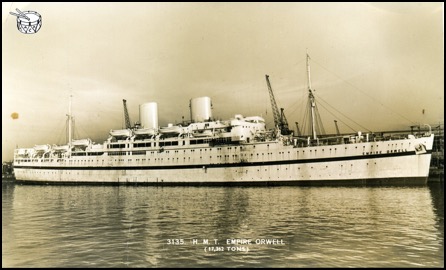
As well as the families on board, there were also soldiers of various units returning from Korea, the war having just finished there. One group that we became friendly with was from the 5th Dragoon Guards, who gave us their unwanted Korean and Japanese banknotes, which I still have. (I realise now that many of them were young national servicemen who had just endured a very unpleasant experience.) On one of the calmer days, a flying fish suddenly flopped on to the deck, and was promptly pinned to a piece of wood as an exhibit, with its “wings” spread out for us kids to examine. As we passed Gibraltar, I took a picture of the Rock and promptly dropped my plastic-bodied Brownie 127 on the deck, cracking the case and letting in the light.
I recall us making our way up Southampton Water, and, as we did so, we were shown the abandoned hulls of the Princess flying boats that had been cocooned at Calshot, Hampshire, pending a decision on their future. They were designed to be the future of post-war British civil aviation, but never flew again and were subsequently broken up. Just before we docked, we passed under the stern of one of the Cunard “Queens”. It seemed enormous compared to the Orwell. On our way through London, we stayed at the Union Jack Club beside Waterloo Station, which was a forces hostel providing subsidised accommodation for service people and their families. We then went to live in Hythe, on the Kent coast, in a high-class B & B, until we found our feet in the UK.
AN UNSETTLED STINT IN ENGLAND
My mother had decided that army life was not for her, and my father left the army for the second time since the war and took work as an assistant chimney sweep! The man he worked for was a con artist who targeted wealthy homes in Folkestone, Kent, where he would set up his impressive electric cleaner, plug it in (after closing the door to exclude the owner) and then run the machine for about twenty minutes without going anywhere near the chimney, after which he would charge an exorbitant fee, receiving the grateful thanks of the owner as they left. This was a revelation to my father, who had never encountered anything like that in the army. Six months later, he signed on again and was promptly posted to Cheshire. Meanwhile, we took a tenancy in the basement flat of a converted Martello tower on the seafront. It was very cold, had walls 8 feet thick, and was quite different from married quarters, even if it was a former military building.
My education then started to take a few twists and turns. I had taken the forces equivalent of the Eleven Plus (the Moray House exams) in Hong Kong, and had failed. In Hythe, Kent, I was told that I had to attend the local primary school and take the Eleven Plus, which I promptly failed, and in September 1954, I started at Brockhill Secondary School. I recall an embarrassing incident when the form teacher thought that it would be interesting for the class if I gave a short talk on my Far East adventure. In those days, I was painfully shy, and regarded the whole episode as a nightmare. A married quarter became available in Cheshire, and my parents, in their wisdom, decided that it would be better for me to finish my first year of secondary education by staying in the south. So I went to live with a farming family and enjoyed being involved with farming life, even learning to drive a small caterpillar tractor.
I rejoined the family in the village of High Legh, about halfway between Warrington and Knutsford. The regiment, the 56th Heavy Anti Aircraft (HAA) Regiment, Royal Artillery (RA), was based around the former manor house and was set in beautiful grounds, with lakes and woods – a wonderful playground. It was a lovely part of England, and the people were very friendly. Bizarrely, I was told that I was too young to attend the local secondary school in Knutsford, and so spent a term in the village primary school, where I took the Eleven Plus for the second time and failed again! In September 1955, I started my first term at Knutsford. Had I remained in the south, I would have been starting the second year. I made a lot of friends, but was becoming conscious of being thought of as an oddity because of my family’s service background. One of my contemporaries, on being told that my father was a soldier, asked, “Does he kill people?”
My father’s regiment would go on exercise for several months between March and September, when the whole unit would decamp to a small village called Tonfanau, on the Welsh coast near Towyn. The guns engaged in target practice, firing at a drogue towed by an aircraft. My father was able to come home for the odd weekend, but this only gave my mother further cause for complaint. The married quarters were newly built and reasonably comfortable by the standards of the time. (There was no central heating, just an open fire in the sitting room and a coke-fuelled stove in the kitchen.) I recall shopping trips to Manchester that involved walking 2 miles to the next village, a bus ride to Altrincham and, finally, an electric train into the city. With apologies to Mancunians, I thought Manchester much inferior to London. We had three enjoyable years in Cheshire and at the end of 1957, my father asked us whether we would like to go to Cyprus or Germany. I cannot remember what our choice was, but, knowing the perversity that governed army decision-making, if we had plumped for one, then we would have been given the other. We were told that it was Germany, and in the time-honoured fashion, Father left us for his new posting in mid-1957, leaving us to return south pending the allocation of a married quarter in Germany. The family returned to Hythe, where we took a private tenancy in a bedsit. I resumed my education at Brockhill, where I found myself in the fourth year, having left Cheshire at the end of the second year!
THE MOVE TO MÜNSTER
At Christmas 1957, my father came back to the UK and told us that we would be joining him in Germany early in the new year. At the time, he was stationed in Detmold, but then moved on to Minden, and by the time we joined him, he had been transferred to Münster. (The army was being downsized, resulting in many regimental mergers.) In February 1958, my mother, brother and I made our way to Harwich to board a troopship, which I am reliably informed was the HMT Empire Parkeston. We sailed overnight and docked at the Hook of Holland the following morning. The military train then took us straight to Münster, where we were allocated a modern, centrally heated quarter on the outskirts of the city, but within walking distance of the barracks, which had served the same purpose under the Nazis. Münster was a large garrison town, with many different regiments stationed there. I recall the Royal Scots Greys (the Duke of Kent was serving with them at the time), the 4th Royal Tank Regiment and the Seaforth Highlanders. There was a large military hospital, together with all the other support units, including the Royal Army Ordnance Corps (RAOC). Near our quarters was another small estate occupied by RAF families, the men serving at RAF Gütersloh.
I was told that I would attend one of three boarding schools for service children, the nearest of which was Windsor School, Hamm. However, we were duly notified that I would be attending Prince Rupert School (PRS), in the northern seaport of Wilhelmshaven. (The third possibility was King Alfred School at Plön, up near the Danish border.) I was told that I would start at the beginning of the summer term in April 1958, and so I again had to attend a primary school for three months in a class with children many years my junior. We then moved to a larger quarter around the corner, where we remained during our three-year posting. This was a luxury home compared to anything that we had experienced in the UK: we had full central heating, double-glazing and all mod cons.
My brother and I liked Germany. From day one, we were instructed to respond to Germans by saying Nicht verstehen – Engländer [“Don’t understand – English people”] (in perfect German). To explore Münster, we took the local municipal bus and, again, had been told to ask for Einbahnstrasse (“one-way street”), which clearly confused the conductor, and we soon realised that we should have asked for Eisenbahnstrasse (“Railway Street”)! We did gradually pick up rudimentary German, and were able to get by in the local shops. My mother was not impressed with the NAAFI shop, and preferred to shop for fresh vegetables in the market place beside the cathedral. Some service families made no effort to meet locals and never strayed from the NAAFI to try local shops, where Lebensmittel (“food”) was invariably cheaper. Regulations were still in force that advised against purchasing local milk. We ignored this stricture in taking our litre container to the dairy down the road, and never suffered any ill effects.
My parents got to know a German family whose daughter was employed as a nurse at the barracks. During the 1930s, she had been a member of the Hitlermädchen (the female equivalent of the Hitler Youth). She told us of her experiences working as a labourer on autobahn construction. She described the great optimism and pride that was felt by most Germans at that time.
Although we did not fully appreciate it at the time, Münster had been extensively bombed by both the RAF and the USAAF during the war, and yet it was clearly a prosperous, modern city whose medieval centre, including the old streets, the Rathaus [town hall] and the cathedral, had been rebuilt. This was the beginning of the post-war economic miracle, or, as it was known in German, the Wirtschaftswunder. There were a number of attractive places to visit in the surrounding countryside, including the village of Tecklenburg, high up in the Teutoburger Wald [Teutoburg Forest]. We often used to visit the Möhne-Damm [Möhne Dam], which was about an hour’s drive away. The village inns were great places in which to eat out, and there I developed a lifelong love of Wiener schnitzel and bratwurst. There were Canadian forces stationed in the towns of Werl and Soest, where we had access to the shop of the Maple Leaf services, which was the Canadian equivalent of the NAAFI, and which introduced us to a whole new range of goods and foods from North America, including the then unheard of maple syrup – lovely!
PRS, TWA, AND MY LATER LIFE
The prospect of going away to boarding school for the first time was quite a daunting one. Prince Rupert School would be the tenth and final school that I had attended since my education started! My mother spotted another boy living in an adjacent married quarter and asked him to keep an eye on me as I travelled north to Wilhelmshaven. I shall never forget the sight of the school train as it pulled into Münster station: it was like a scene out of one of the early St Trinian’s films, with kids hanging out of the carriage windows, waving their blue-and-white scarves and shouting to their friends to join them. The train was one of two laid on specially for the pupils of PRS, starting their journeys in Cologne [Köln] and picking up pupils from the major garrison towns as they headed north. For me, it was the beginning of a wonderful experience that I shall never forget. On the first night, I was homesick, but from then on, I loved it. I did, however, find myself back in the third year, having left my school in Kent in the fourth year.
Many ex-PRS pupils belong to The Wilhelmshaven Association (TWA), which holds biennial reunions at various UK venues. The school at Wilhelmshaven was closed in 1972 and moved to Rinteln, where it remains to this day. However, with the continued withdrawal of our forces from Germany, its future must be in doubt. For a detailed insight into what life was like at PRS between 1947 and 1972, I recommend reading a book compiled from reminiscences of former pupils and staff published by The Wilhelmshaven Association in 2004. Space does not permit me to recall all of my personal experiences there, but suffice to say that PRS was a school ahead of its time, being a comprehensive, co-educational boarding school. All of the pupils had one thing in common: they were all “service brats”. It was the first time in my school life when I felt at home, and not the odd one out: we had all experienced the disruption and uncertainty that service life brings to a military child. I wouldn’t have missed it for the world!
We returned to the UK in late 1960, and my father retired from the army in the spring of the following year. I did briefly consider joining the army because I knew that my father had enjoyed service life, but decided against it. Despite my disrupted education, I was able to make a career in the legal profession, and retired after almost forty years in 2002.’
Roger Hall (b.1943).
PERSONAL STORY: SOME SNAPSHOTS OF GROWING UP IN POST-WAR AUSTRIA AND BERLIN
Lorina Lumsden's father, a staff sergeant in the Intelligence Corps, was posted to Austria in 1948, and his family followed him there in 1949. They returned to the UK in 1952 before being posted to Berlin, in (West) Germany, from 1953 until 1957. Lorina recalls these postings below.
'My maiden name was Lorina Federl, and I had two brothers, Michael and Richard, and four sisters, Elizabeth, Mary, Georgina and my baby sister at that time (she was born in Austria), called Kathleen. In Austria, I went to school in Graz, and many of my siblings went to Klagenfurt School.
Below: A photograph of forces children taken at a birthday party in Austria in about 1951. Lorina writes: 'I am second from the left at the front; my brother Michael is on the far right at the front, and my brother Richard is standing to the left of the girl at the back who is wearing a strange-looking party hat.'
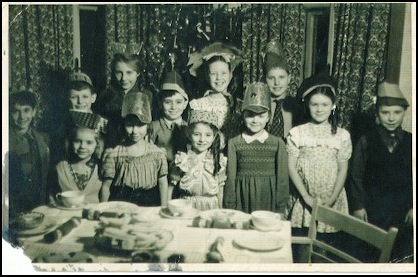
Below: The Federl family. Lorina, then about nine or ten years old, is sitting alongside her mother and their dog.
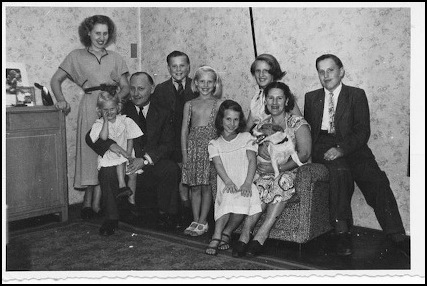
In Berlin, my school was in Hertha Straße in Grunewald. The property had belonged to a famous German musician. I went to school with my brother Michael and sisters Georgina and Kathleen. We lived in a lovely apartment in Charlottenburg. My brother and I were in the Boy Scouts and Girl Guides, and we assembled at a barracks that overlooked Spandau Prison, where Rudolf Hess was being held.'
Lorina Lumsden (née Federl, b.1943).
PERSONAL STORY: THE ARMY LIFE
Winifred Hamilton’s father, Thomas Lang Hamilton, served with the Royal Signals and was also seconded to the Malayan Army, which meant that Winifred and her family consequently lived in Scotland, Egypt and Malaya (Malaysia) during the 1940s and 1950s, as Winifred relates here. Winifred adds: ‘Looking back, I wouldn’t change my experiences for anything’.
‘I was born in Scotland in 1944. In the late 1940s, we joined my father, who was in the Royal Signals, in Egypt. First, we had to travel to London, and then to Harwich and the Hook of Holland, followed by a train to Trieste and a ship to Port Said. We lived in Ismailia for about two years, first in the downtown area, and then, after I contracted dysentery, moving into Moascar Garrison. We lived in three different houses: one, a block of apartments, then a tent-top building near the airfield, and finally another house for a very short time. I went to school in the garrison and also remember going to the cinema just outside the gates. We often went on my father's motorbike to Port Said, with my mother on the pillion behind and me in front, sitting on the tank!
We were evacuated to Scotland because of an emergency, in October 1951, I think it was – certainly before the king died [George VI died in February 1952]. It was very traumatic: we were all told to pack up, having been given only a day or so’s notice that we were being shipped back to Britain. Back in Scotland, I lived in barracks in Glencorse, just outside Edinburgh, and then in Dreghorn Barracks, near Colinton.
When my father was seconded to the Malayan Army, we joined him there in 1955, sailing out to Penang on the SS Canton (my sister had just been born by then). My father fought against the communist insurgents and was wounded several times. We stayed in Ipoh for a few months and then moved to Taiping, where I attended the army school. My father organised a motorcycle stunt team and performed many solo stunts, including jumping through a hoop of flames! I also remember a holiday taken in Singapore near Changi: we went down by train from Taiping, which was very exciting, but the holiday camp was a dump – just old Martello-type towers with bare light bulbs. I also remember the airport at Changi being very small and having a windsock – it's now the internationally acclaimed Changi Airport. I passed the Eleven Plus exam while out there, but we returned to Britain in 1956, which meant that I missed out on going to the boarding school in the Cameron Highlands [Slim School] and instead attended a Scottish academy.
I enjoyed the army life, but regretted having to leave friends and toys behind every time we moved. I also found that although I could keep up well with most subjects, arithmetic was always a problem because of the school changes. I think that I have been relatively successful, in spite of the fact that I had moved schools seven times by the time I was eleven! I was an academic teaching at university for forty-plus years, and have just recently retired.’
Winifred Hamilton (b.1944).
PERSONAL STORY: REMINISCENCES OF AN ARMY BRAT, 1946-65
Tim Roberts grew up after World War II as the son of 14522016 Warrant Officer II Frank Roberts, of the Royal Army Pay Corps (RAPC). In his detailed and evocative recollections of life as an army brat, he outlines the places where his father’s career took his family; the transportation that they used; the accommodation in which they lived; the domestic help that his family had while living abroad; his education; the extracurricular activities that he enjoyed; and such aspects of ‘mess life’ as children’s Christmas parties. Finally, he reflects on how growing up as an army child has affected him as an adult.
‘IN THE BEGINNING
My mother, Joan, was called up to the ATS [Auxiliary Territorial Service] in the middle of World War II and, after training in Pontefract, was assigned to the army pay office in Nottingham. There, she met my father, a corporal in the RAPC. They married when the war ended, and I was born in November 1946.
JOIN THE NAVY AND SEE THE WORLD – JOIN THE ARMY AND SMELL IT
Despite the well-known dictum [above], our family was generally fortunate with postings, although there was a hitch with the first one after I was born. Dad had been working at the War Office in London, and, in 1947, was promoted to sergeant and posted to Hong Kong via temporary assignments in India and Ceylon (Sri Lanka). My mother could not get a passage to accompany him, and we had to wait until June 1948 to go out and join him.
The major part of my father’s duties in the colony was dealing with currency exchange for forces personnel moving in and out. Many a night he would sleep with a large bag of Hong Kong dollars under the bed and a revolver under his pillow. One incident he recalled was being summoned to Government House one morning and being sent upstairs to a guest room, where he was greeted by a suave-looking figure in a silk dressing gown for whom he exchanged some sterling. On leaving, Dad enquired who this person was, to be told it was Mr John Profumo, later Minister for War, who would become embroiled with Christine Keeler, Mandy Rice-Davies, Stephen Ward and a Russian naval attaché, in what became known as the “Profumo Affair”. Older readers will recall that the minister was forced to resign – of course, such a thing would be unlikely to happen these days!
At the end of this Far East tour, Dad returned to Nottingham Pay Office. Eighteen months later, he was made staff sergeant and posted to BAOR [British Army on the Rhine], based in Düsseldorf [West Germany]. There, his job included being visiting paymaster to several units in the area. He was assigned a car, an oval-windowed Beetle, and a driver, who was a Czech ex-PoW [prisoner of war] awaiting resettlement. From time to time, my brother, Martin, and I were able to accompany them on their travels around the Rhine district. In 1955, it was back to Nottingham for another three-year stint.
My father’s final overseas posting, and promotion to WO II, came in 1958, when he was sent to Command Pay Office Nairobi, Kenya. He returned to the UK in 1961, assigned to Officers’ Accounts at Rogers House, Ashton under Lyne. Here, he taught the arcane art of army accounting to new recruits – the last of the national service boys and civilian clerks. He had hoped to wangle a further posting overseas, and Bermuda was spoken of, but, ho hum, his Ashton posting was extended and he served out his days as quartermaster (regimental quartermaster sergeant, RQMS) in charge of supplies, maintenance etc until his discharge in 1968. During this final stint, he received his Long Service and Good Conduct Medal from the general officer commanding the district: it promptly fell off as the general stepped back!
GETTING THERE
Travelling to postings could be viewed as a hassle, or as an adventure and an education. There was certainly an advantage for me later, when it came to geography exams, having experienced the places and not seen them solely through the pages of a dusty textbook.
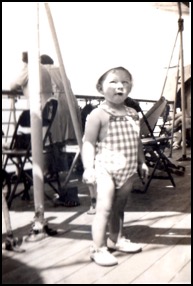
Above: Aboard the HMT Lancashire
in July 1948, en route to Hong Kong.
We returned from Hong Kong as a family, complete with my baby brother, in July 1950 on the HMT Empire Orwell. Life on board the troopship – which, incidentally, began its life as a German vessel – was fun for us children. There were no married cabins, and my father’s accommodation was with the troops. While the ship was in the tropics, many of the men opted to sleep out on the deck under the stars, and on some nights, I was allowed to join them. More entertainment was to be had in the mornings when the decks were swabbed, and I got a liberal hosing-down from the crew. My brother, who learned to walk during the six weeks of the journey, adopted the gait of a drunken sailor and had to relearn the skill once he was back on dry land.
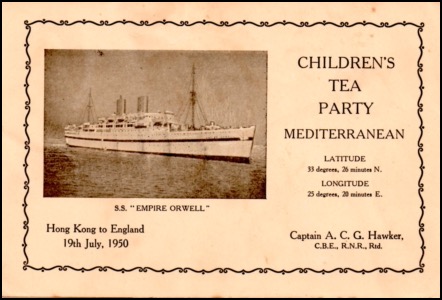
Above and below: Children’s parties were held aboard the HMT Empire Orwell during the voyage from Hong Kong to England in 1950.
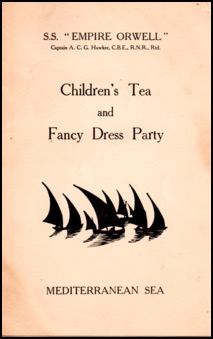
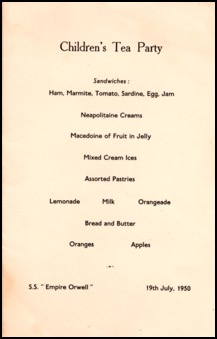
It would be another ten years before we had a family car, so travel back home in England was by public transport. Coupled with the fact that I had relatives who worked for the railways, travelling on the boat trains, in Britain and on the Continent, was probably what started my lifelong love of steam locomotives.
It wasn’t long before we were aboard a boat train again, this time bound for Harwich to connect with the Hook of Holland ferry. From there, it was on to the Blue Train and down the Rhine Valley to my father’s posting in Düsseldorf. Two memories come to mind from this journey: the beautiful springtime blossom in the Dutch and German countryside; and enjoying my first formal meal in a railway dining car. Eating soup on a fast-moving train was a particular challenge for a youngster, especially as its serving seemed to be timed to coincide with the crossing of many sets of points. During our three years in BAOR, we travelled home and back by this route annually when my Dad had leave. My mother’s parents also travelled out by this route to visit us one Christmas; it was my Nanna’s maiden overseas excursion and the first time that “Pop” had been out of the UK since being invalided home from Dar es Salaam during World War I. They were thrilled to be made guests of honour, seated at the garrison sergeant major’s table for the mess Christmas dinner, and, despite their protestations, were never allowed to pay for a drink throughout their holiday.
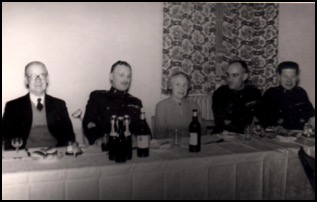
After our next spell in Nottingham, our move to East Africa [equivalent to modern Kenya] was made more exciting by giving us our first experience of flying. We flew out from Blackbushe Airport, on the Hampshire/Surrey border. The aircraft was an ancient Handley Page Hermes – belonging, I think, to RAF Transport Command – and we sat facing the rear. The route was via Rome, Benghazi (in Libya) and Wadi Halfa (in Sudan). Unfortunately, one of the plane’s engines failed at Benghazi, and we had to wait for twenty-four hours while spares were flown out and fitted. The combination of desert temperatures in the 100°Fs plus the serving of a foul-smelling soup, complete with fish heads, did little to improve the mood. However, the national-service boys soon found an old table-tennis table in the camp that was our temporary accommodation, and a twenty-four-hour tournament for all was quickly in progress. The routing via Wadi Halfa was because of repair work at Khartoum Airport. We landed in darkness, guided by petrol flares lining the approach and runway as there were no landing lights. It was a contrast to our final destination, Nairobi’s smart, new Embakasi Airport. During World War I, my grandfather had reached as far inland as Nairobi, which, at the time, was hardly more than a railhead, with a few corrugated huts.
My flying days continued when I was sent home to boarding school and returned for holidays. I flew on BOAC [British Overseas Airways Association] aircraft as a UM – unaccompanied minor – and greatly enjoyed, even at my young age, being fussed over by the attractive stewardesses. These days, we call them cabin crew, of course, and they are drawn from all sectors of society, with a higher proportion of male staff. But during the late 1950s and early 1960s, BOAC’s team seemed to comprise young women who were recent “debs” [debutantes]! To keep me occupied, I was encouraged to help with serving meals, and, during those pre-terrorist days, spent a lot of time on the flight deck – occasionally being allowed to watch a landing from the best seat in the house. About this time, the airline changed the equipment on the route: the supposed “whispering giant” turbo-prop Bristol Britannias giving way to the latest jetliners – De Havilland Comet 4s. Journeys became quicker and much smoother. I probably thought that I had joined the jet set, but I don’t think that membership was open to the brats of other ranks.
During these return visits to East Africa, I travelled twice on the (Beyer-Garratt-hauled) overnight train to Mombasa, where we stayed at the Silversands Forces Leave Centre on Nyali Beach, just north of Mombasa, for fabulous beach holidays. The site is now occupied by five-star hotels.
Below, left and right: Martin boarding the overnight train to Mombasa at Nairobi railway station in 1960 (left). My father with me and my brother at Silversands Forces Leave Centre, Nyali Beach, in 1960 (right).
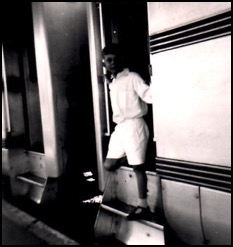
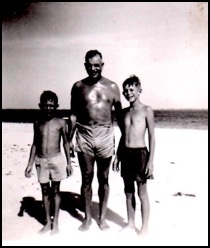
NO QUARTER GIVEN
Even in recent times, service families, especially those of other ranks, have complained about the standard of army accommodation. The state of some married quarters, where available, and the lack of facilities in some remoter camps, have been causes of dissatisfaction. Our family did quite well for housing. My mother and father had shared a flat in London while he worked at the War Office. She moved back to her parents’ home when ill during pregnancy, and, soon afterwards, Dad was posted to Hong Kong. In readiness for our arrival in Hong Kong, he had secured a flat in one of the army’s blocks on Kennedy Road (see, for example, “PICTURE: MARRIED QUARTER, KENNEDY ROAD, HONG KONG”). The location, halfway up Victoria Peak overlooking the famous harbour, would make the value of such real estate skyrocket in later years. My brother was born in the nearby BMH Hong Kong (see “PICTURE: BRITISH MILITARY HOSPITAL (BMH) BOWEN ROAD, HONG KONG”).
Returning to Nottingham, we lived in a pleasant semi on Williams Road in the camp surrounding COD [Central Ordnance Depot] Chilwell. (These street names may stir memories for other brats.) The house looked on to a green that had been an old orchard, with pear trees and apple trees, and that backed on to a wood (known locally as “Little Wood”), where there were damsons.
When we moved to Germany, we were allocated a house in the village of Lohausen, close to Düsseldorf airport. The whole street, Braedelar Strasse, had been commandeered by the army after the war. Number 63 was a two-storey semi, with extra accommodation in a basement kitchen, plus attic rooms. A connection between the kitchen and dining room was provided by a dumb waiter, which afforded hours of fun for my brother and me: one of us would squeeze himself into it, while the other hauled him up and down. The house also had central heating – something that few people in Britain enjoyed in those days. The fruit theme continued in the garden, where we had a peach tree that seemed exotic to us, and a massive cherry tree. At first, the cherries were a treat, but as time wore on, cherries and cream, cherry pie, cherry jam etc began to pall.
Lohausen village had a good range of shops: a butcher, baker, greengrocer, barber etc, and a bar. The licensee of the bar was Kurt Hausen, and his name was displayed over the entrance. When visiting us from England, my grandmother took this to be the name of the “pub” and proudly interpreted it as “Cart & Horses”, which, of course, was how it was known from then on. Some twenty-five years after leaving Lohausen, my parents made a diversion from their Rhine cruise to visit the village, and found that they were recognised in most of the shops, which were by now being run by the children of the proprietors that they had patronised. The houses had been returned to their German owners, and number 63 had changed little.
Despite the recent memory of the war, relations between the locals and the army families were generally good. There was some socialising in the bar; we were well received in the shops; and we joined in the local festivals – St Martin’s Day, St Nicholas’s Day and Christmas Eve being particular memories. One exception, however, was an extended snowball fight, resembling trench warfare, between the brats and the local youths, with both sides accusing the other of escalating affairs by putting stones in the middle of their snowballs.
After Germany, it was back to Nottingham, but not without some difficulty. In the first place, my father was posted to Weedon, Northamptonshire, but as there were no married quarters available, my mother, brother and I were accommodated in a Blackpool guesthouse. This was a fairly common practice at the time – indeed, the whole of “Sandilands” and other nearby B & Bs on the North Shore had been taken over for forces families. After a short time, a quarter became available, and we were taken down to Weedon in a staff car. On arrival, though, we found a dingy flat with, literally, coal in the bath and two squaddies on “jankers” [punishment] applying distemper to the walls. My mother was having none of this, and in short order we were back in Blackpool. It suited my brother and me. It was outside the holiday season, so we, and our fellow service children in the B & B, had miles of promenade as our playground and loved riding to school on the town’s iconic trams.
In the meantime, Dad had secured a transfer back to the RPO [Regimental Pay Office] Nottingham and found a quarter in Chilwell, this time in Church Crescent. The “bungalow” was a converted barrack hut, with rooms off a long corridor. My mother described this to her parents as being “long enough to play cricket in”, a thought that, until then, had not occurred to Martin and me. A couple of broken light fittings later, and our “cricket pitch” was declared out of bounds. While stationed here, my affection for Nottinghamshire County Cricket - my Dad had played for Notts Seconds during the war – and Nottingham Forest Football Club was implanted.
After eighteen months or so, we moved again, this time to a house in a newly built development in Chilton Close, Kimberley, to the north-west of Nottingham. Although this was a modern house, it still did not have central heating or fitted carpets, and on icy mornings “Jack Frost” painted pictures on the inside of the windows, while the lino was freezing to the feet as you tiptoed to the bathroom.
Our next house was in warmer climes. Dad was posted to Kenya in 1958, and rented a house for the family in the (now fashionable) Westlands area of Nairobi. It was a rambling property built from shipping crates, and in places on the walls you could read stencilled markings like “Ford Motor Company”. The roof was made of corrugated iron, which entertained the local troupe of monkeys, who would raid the fruit trees in the garden, and, after eating the avocados or pawpaws, would throw the stones at the roof just for the effect of the resulting “clang”. At the bottom of the large garden was a stream, with “bundu” (jungle-like woodland) on the other side. We would often find the tracks of antelope and, occasionally, leopard, in the mud beside the stream. Before we moved to Kenya, wiseacres advised that it was unlikely that we would have electricity, and that wood stoves, plus storm lanterns, would be the norm. So I gave away my treasured electric train set, only to find that Nairobi, for Europeans, at least, was a modern city and had a reliable electric supply.
After twelve months or so, we were allocated a flat in a newly built block off the Ngong Road in Kibera. The name is now synonymous with Africa’s largest slum, but it was quite a smart area beside the Royal Nairobi Golf Club at the time.
My father’s final (double) posting found us living in a flat in Ladysmith Barracks, Ashton under Lyne. The barracks was built in Napoleonic times, and was certainly showing its age. Indeed, our move to a modern semi on nearby Hillside Close was hastened when my bed fell through the rotten floorboards in my room. Hillside Close was our last army quarter, and fairly typical of the reasonable standard of accommodation and furnishing that we had been fortunate to enjoy.’
UPSTAIRS, DOWNSTAIRS
It was an odd feature of army life abroad that we had domestic help; the army must have paid an allowance for this (others can probably confirm it). Having servants was an unlikely circumstance for a family like ours, from a working-class background, and there was a particular irony in that my maternal grandparents had both been “in service”. My grandfather had been a chauffeur, and my grandmother had started as a buttery maid, working her way up to housekeeper before stopping work to look after her own family.
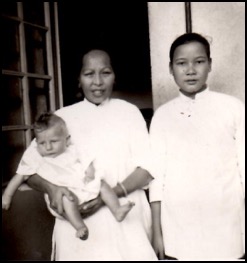
Right: Ah Ling, holding my brother Martin, and her niece, 1950.
In Germany, a local hausfrau helped with the cooking and cleaning. I regret that I can’t recall her name, but she was a very warm woman, who often took me to stay with her family, especially when there was a local festival like St Martin’s Day or St Nicholas’s Day. Christmas Eve, when German families exchange presents, seemed magical, with many candles, much cake, and singing round the piano.
In Nairobi, East Africa, we had what were called “house boys” – perhaps they still are, but it doesn’t seem to be a very respectful term. The one in the Westlands property cooked our meals under a ramshackle shelter on a glorified barbeque, mainly constructed from corrugated iron. A “shamba boy” (gardener) came with the property, too, and his daughter, Selina, became our playmate.
In Kibera, we were served by Timona and his successor, Joseph, who were from the Luo tribe, and were good cooks and housekeepers. While glad of the employment and the accommodation provided, they probably earned a pittance – hardly enough to send much money back to their families. In Kibera, my mother was puzzled for a while as to why we had chips so often, despite her instructions to Joseph as she left for work. When questioned, Joseph explained that because she went out in the morning before my brother’s school transport picked him up, Martin would countermand Mum’s request by telling Joseph “mingi [lots of] chips”. A test of Joseph’s culinary skill came when Mum asked him to make pastry and left him the ingredients plus apples, jam, lemon curd and sweet mincemeat. The pastry was beautiful, but with all the fillings mixed into one big pie!
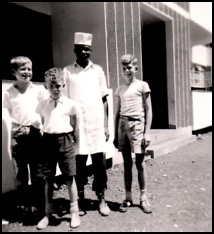
“THE HAPPIEST DAYS OF YOUR LIFE”
Schooling for army brats usually meant attending local-authority schools at home and British Families Education Service establishments whilst overseas. My first school, Meadow Lane Infants in Chilwell, close to the ordnance depot, was a civilian school with a large proportion of army children. I can clearly remember my first day, with Mrs Woods as my teacher, not least because I started after Easter, rather than at the beginning of the school year, and it was school-photograph day.
Then it was on to Germany, and to two schools there. The first was Lohausen Nursery School, which was in a converted grand house at the edge of the village where we lived. Among my memories are playing the role of Father Christmas in the school play. In the photo taken at the dress rehearsal [see below], Santa is clean-shaven because the teachers wanted to make a beard by sticking cotton wool on my face with glue. Perhaps wisely, I balked at this, and before we performed in front of parents, they came up with a Mark II beard in which the cotton wool was attached to a wire frame. From the nursery, I went on to attend Ratingen School, a little further away. Miss Fencing was my class teacher, and Mrs McGrath, the mother of a classmate and friend, Sean, was also on the staff. Once a week, a local housewife would take members of the class out to “help” with her shopping. The aim was to teach us a few basic German phrases.
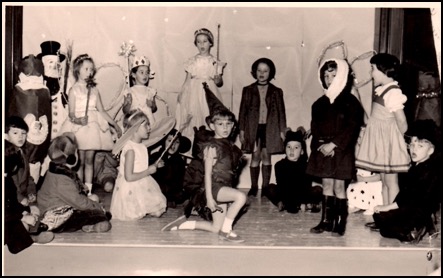
Above: A photograph dating from December 1952 of a Christmas-play rehearsal at Lohausen Nursery School in Germany, in which I am Father Christmas.
After that, it was back to Chilwell, and to the nearby Toton Primary School. Soon, though, our move across Nottingham to Kimberley meant a transfer to Church Hill C of E, an all-boys’ school. The teaching staff here was excellent: strict, but encouraging. My first-form teacher was Mr Kettle (yes, he was always “boiling over” and “letting off steam”), and when I moved into the top class, I was taught by the headmaster, “Freddie” Farnsworth. It was here that I took and passed my Eleven Plus – important for a future move. Freddie got twenty-six of his thirty-two pupils though the exam, with six of us being in the top fifty in the county – quite an achievement in a mining community with a smattering of squaddies’ offspring.
Soon afterwards, it was off to East Africa and Westlands Primary School, Nairobi, under headmaster “Pa Paxton”. This was in 1958, before independence for Kenya (in those days we pronounced it “Keenya”), and the school was racially segregated, although I was too young to appreciate all the implications at the time. My brother attended the army school on Langata Road, opposite Wilson Aerodrome. In the Kenyan school system, children transferred to secondary education at the age of thirteen, although the primary timetable included subjects, such as French and Latin, for the older pupils. It was a happy time for me socially, enjoying as I did the warm climate and being in a mixed-sex school again. My academic progress, however, gave my parents cause for concern, and in 1959, having earlier passed my Eleven Plus, I was sent home to boarding school in Bridlington, East Yorkshire.
Below: Martin is in the back row, fifth from the right, at the school on Langata Road, Nairobi, in 1959.
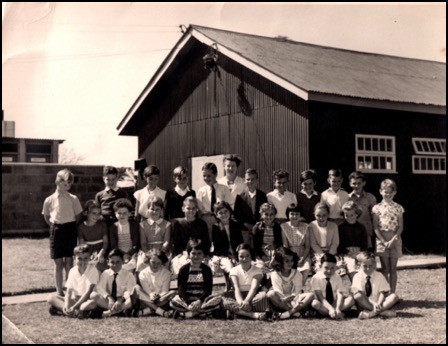
Despite my early homesickness, I thrived in “Brid”. The school had a firm-but-fair regime, and an inspiring teaching staff. Also, being sports-oriented, I fitted in easily with the ethos, and my experience was shared by several boys with army or Royal Air Force (RAF) parents. I left school in 1965, by which time my parents were in Ashton under Lyne, and, after a temporary job – ironically, in an army and navy surplus store – I found a job as a management trainee with a large firm in Trafford Park, Manchester.
EXTRACURRICULAR ACTIVITIES
Being part of a military garrison, especially overseas, afforded plenty of opportunities not available to “civvy” children. Transport was one area. Our school “bus” was usually a truck, an iconic Bedford 15 cwt or a 3-tonner fitted with wooden benches. Our transport would have two young servicemen, a driver and a conductor, to supervise us. Often, they would encourage singsongs to keep us occupied, though some of the songs we learned were not suitable for family occasions.
The only place where we had proper buses to take us to school was in Germany. Following the typical schoolchild hierarchy, it didn’t take long for the older girls to take control of the back seat, there to giggle and gossip and sing the latest pop songs. The music seems old-fashioned now, but at the time, artists like Petula Clark and Frankie Laine were popular. Also, the film Calamity Jane, starring Doris Day, had just been released, and so the girls led us in singing “Take Me Back to the Black Hills”, “The Deadwood Stage”, and “Secret Love”. My brother, still too young to attend school, would take delight in waving the bus off from the end of the road each morning, amusing himself with a shout of “Fahrt auf” (“ride on”).
The use of military vehicles was good for family outings, too. In Hong Kong, there were Jeep trips up Victoria Peak, and with groups of families in the back of 3-ton trucks to Shek O Beach. Land Rovers with a driver could be signed out for weekend safaris through Nairobi National Park, where we were thrilled by the excitement of seeing the wildlife, especially the big cats and crocodiles, from very close quarters.
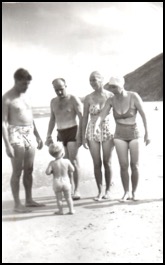
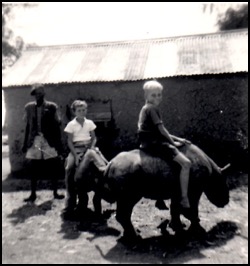
Above, left and right: My parents and their friends at Shek O Beach, Hong Kong, in October 1948 (left). Martin and a friend ride a pair of baby rhinos at the Carr-Hartley Ranch in East Africa in 1960 (right).
Below, left and right: Here I am at the wheel of Jeep on Hong Kong’s Victoria Peak in 1949 (left). Pictured at Kibera in 1960, Martin, I and a driver from the King’s African Rifles (right) are ready to go on a safari to Nairobi National Park.
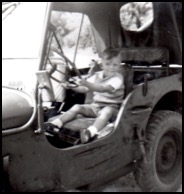
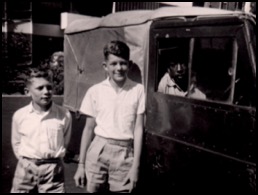
Playing with “big boys’ toys” was another opportunity for us. In the era of national service, it was usually easy to persuade young soldiers to let you do things the “regulars” would frown upon. In our younger years, we would thrill at the chance to ride in all manner of vehicles. When Land Rovers and 15-cwt trucks were no longer a challenge, we would hitch lifts in scout cars and tanks – sometimes being allowed to take the wheel. On one memorable occasion, a parade at Kahawa Camp, near Nairobi, in honour of a visiting brass hat, was interrupted by a Saracen armoured car creeping hesitantly on to the edge of the parade ground. It was being driven, as it turned out, by my brother, aged ten. Fortunately, the incident was quickly covered up, and his identity was never discovered.
Another activity that would not happen in today’s health-and-safety-conscious culture was allowing minors to fire weapons. On indoor ranges, we could shoot .22 rifles and would later inveigle our way on to ranges and talk someone into letting us use firearms ranging from (the pre-SLR [self-loading rifle]) .303 Lee Enfields to Bren guns – pretending all the time that we were not frightened to death.
ANOTHER FINE MESS . . .
A major joy of being an army brat was mess life. At home – but especially overseas – the mess was the centre of social life, not only for the servicemen, but also for their families. The messes of the [Royal Army] Pay Corps’ (RAPC) often had a small membership, but we were always made very welcome in the messes of the other regiments and corps, and even in those of the Royal Navy (RN) and RAF units that my father served alongside. A great fuss was invariably made of us children. In addition to regular family Sundays, there were lavish Christmas parties, with entertainment and presents; receptions after such events as the Queen’s birthday parade; sports days; and pantomimes.
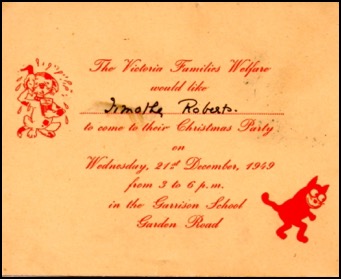
Below: The Christmas party itself; I am at the front, second from right.
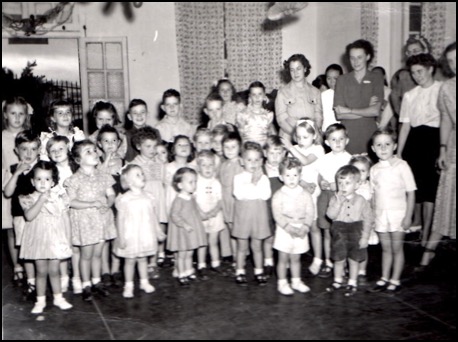
Two particular incidents involving Father Christmas at mess parties have stayed with me. The first was in Hong Kong, when a number of children were welcomed aboard a RN ship. We were lined up along the starboard rail and told to look out for Father Christmas; sure enough, we soon sighted him approaching in a motor launch. The launch came alongside and a rope ladder was thrown over the side of the ship. Santa, with his big bag of presents, began to clamber up the ladder – somewhat unsteadily. He was about halfway up when he lost his grip and plunged into the South China Sea, presents and all. He and the presents were safely recovered, much to our relief. On reflection, I suspect that this wasn’t the real Father Christmas, but rather a rotund petty officer (PO) who had been celebrating too well in the POs’ mess. The second incident occurred in Nairobi, where the RAPC mess was situated close to Wilson Aerodrome. This time, we children were assembled outside the mess and were told to look into the skies as Father Christmas had been spotted on the aerodrome’s radar. As we looked up, a light aircraft came over, and Santa bailed out, or so it seemed. However, his parachute failed to open, and he plunged earthwards – the children were in tears. Happily, a red-clad figure soon appeared from behind the mess building, dusting himself off, and was greeted with great joy by the children. I learned later that the cunning plan had gone wrong when the dummy that had been thrown from the plane had not been heavy enough to activate the parachute.
Below: The other ranks’ children’s Christmas party at the RPO [Regimental Pay Office] Nottingham, December 1957.
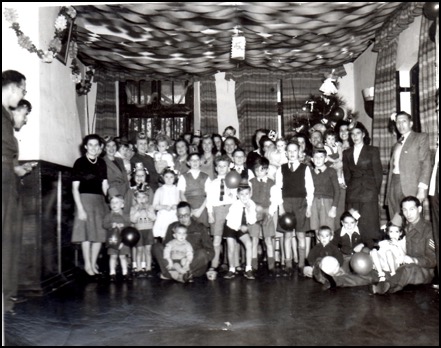
Being outgoing by nature, my parents served on the entertainments committee of the mess at several postings. They organised dances, games evenings, whist drives – drawing in the local community – and the ever-popular Christmas draw. Happy days!
AND FINALLY
So what did being an army brat do for me? It took me to fascinating places, broadening my education and giving me a lifelong love of travel. It introduced me to people of many colours, religions and cultures, reinforcing the knowledge that, one-on-one, we can get along with anyone in the world. Combined with my time at boarding school, it made me independent, able to fend for myself. And, perhaps less predictably, it did not make me want to join the military. On the contrary, these days, while I appreciate the sacrifice that so many British servicemen and women make – still lions led by political donkeys – I’m a pinko, pacifist, vegetarian!
I hope those of you with better recollection than me will forgive any inaccuracies that you may spot, and my self-indulgence in these notes. My aim has been to trigger memories for other brats who “served” in the same, or similar, stations. I should love to read your reminiscences.’
Tim Roberts (b.1946).
PERSONAL STORY: GEOFF JORDAN’S LIFE AS AN ARMY CHILD
Geoff Jordan’s father was in the Royal Army Education Corps, and his postings between 1950 and 1972 took the Jordan family from Bournemouth to Scotland, Egypt, Libya, Malaya and West Germany, punctuated by postings in the UK. You can read all about Geoff’s experiences on the ‘TACA drum’ blog: http://tacadrum.blogspot.com/2022/10/geoff-jordans-life-as-army-child.html. We are grateful to Geoff for his lively and interesting guest blog post and contribution to TACA.
PERSONAL STORY: MAGICAL CHRISTMASES IN GERMANY
Terry Friend and his brother, Chris, lived in Hohne, (West) Germany, from 1951 to 1961, when their father (who was in the Royal Horse Artillery) was stationed there. In this extract from his memoirs, Terry looks back on the magical Christmases that the Friend family enjoyed in Germany. (To read Terry's description of the camp at Hohne, click here; for his recollection of his family's married quarters in Hohne, click here; for his memories of how the Hungarian uprising affected him in 1956, click here; for an account of his schooldays in Hohne and Wilhelmshaven, click here; for his reflections on Remembrance Day, click here; and for more about Terry himself, visit his website: http://www.anothercountrysong.com.)

There was one particular thing that we used to do at Christmas in Germany that we would never have been allowed to do had Pop had the misfortune to have been stationed in the UK: we used to go out to the ranges and select and cut down the Christmas tree of our choice. With thousands to choose from, we always had the best. Can you imagine trying to do that in the UK without getting into trouble? We did it, though, every year, and what superb trees they were, too. We picked well-shaped ones that stretched from the floor to the ceiling and took up a whole corner of the sitting room. Pop used to do all the decorating, and he always did an excellent job. I shudder to think what the consequences might have been had something gone wrong, but in our earliest years, the candles on the tree were just that: real candles! They were placed in holders rather like the ones on birthday cakes, but these had a clamp underneath them and were attached by this means to the branches of the tree. Considering that there were between twenty and thirty of these candles, you can imagine how long it took Pop to light them all with his box of matches. Imagine also the fire risk! But it really did look a picture when the room's light was switched off. There is nothing quite like the flickering glow of a real flame to enhance the atmosphere – that, and the resinous aroma of the tree itself.
At Christmas, each regiment in Hohne held its own families' Christmas party at the Roundhouse. I suppose the evening's entertainment lasted a couple of hours. There was food and party games, decorations and a huge tree. The highlight of the evening was, of course, Santa's arrival, when he would make his grand entrance with a huge sack, ringing a bell (it was not unlike the school bell, as I recall). How we strained our ears for that bell! Each child had his or her name called out and then went forward to receive a gift. All in all, we attended nine of these events. Magical and memorable occasions they all were, too. The army really knew how to look after its own in those days.'
Terry Friend (b.1947).
PERSONAL STORY: 'THE HUMDRUM LIFE OF AN ARMY BRAT'?
John Legg's father served in the Royal Navy during World War II, and joined the British Army – the Army Catering Corps – after the war. This is the point at which John starts his story, which he describes as being 'mainly the humdrum life of an army brat being dragged around the world, attending seven different schools (Bourne was the last), followed by an adult life of drifting from place to place, trying to find "home".' Yet featuring as it does postings to Malta, Libya, Wiltshire, Cheshire and Malaya/Malaysia, 'insane acts', a boarding hostel in Kuala Lumpur and much more besides, John's army childhood would actually seem far from ordinary to most.
'My earliest recollection of what was to become my way of life happened when I was about four years old. We lived in a cottage on Mill Street, Dorchester, next to the Mill Stream. We had a front garden with a low front fence, and as I stood in that garden, I saw a strange man marching along in a khaki uniform. He was a tall man, and had to bend over to open the gate to our front garden. A moment of panic was replaced with happiness when I realised that this strangely dressed man was my father! After serving in the Royal Navy for five years during the war, he had tried civilian life, including a stint in the Fire Service, but obviously missed the military life, and now here he was: a soldier. My father loved (apart from his family) two things in life: travelling the world, and cooking. He saw the army as a way of combining the two, and so joined the [Army] Catering Corps. He had started his working life as an apprentice baker during the 1930s, and on joining the navy was made a cook on a destroyer escorting the munitions ships from Scapa Flow up to Murmansk. He never talked about those years.
PROPELLED FROM DORCHESTER TO BENGHAZI, VIA MALTA
Back to the plot. I had barely settled into a primary school close to Mill Street when the news arrived that we were being posted to Benghazi, in Libya. I remember sitting in the aeroplane and watching those propellers whirling around, and my next memory (I was only five) was of being in Malta. For some reason still not entirely clear to me, we stayed there for three months, and my father must have worked for the local British Army outpost because he went away each day and returned in the evening.
Eventually, we arrived in Benghazi some time in 1952. Of course, I was still very young, and memories of that time are sketchy. I do recall visiting the catacombs and the Egyptian pyramids, but my most vivid memory is of being swept away from the shore while swimming in the Mediterranean Sea! I remember my mother running frantically along the beach as I sank under the waves for what seemed like the tenth time. Then I was gripped in the strong hands of a young soldier, who took me back to the beach and held me by the ankles while the seawater drained from my lungs and stomach. After that, it was compulsory swimming lessons at the local NAAFI club! I know I must have gone to school there, but I have absolutely no recollection of it. Things I do remember include watching our "fridge" being repacked with a large lump of ice carried in on the shoulder of a local worker; living at one stage in a square "residential compound", with an armed guard at the gate; and attending the Salvation Army church. I still have the little Bible they gave me.
WILTSHIRE, CHESHIRE, AND CONSTANT PROBLEMS AT SCHOOL
My next most vivid memory was starting school in Corsham, Wiltshire. My father had been posted to the nearby Pioneer Camp in around 1955, and we were settled in a small group of army-owned houses in Priory Street. We were there for four years, some of the happiest years of my life, despite some problems at school. I was the "new boy" there and suffered a certain amount of bullying, that is, until I devised a way of fixing the problem, which was to "go insane" when attacked, lashing out at everybody in reach. The bullies decided that I was too much hard work and left me alone, but I let success go to my head, until one day I was hauled in front of the headmaster for "bullying" other kids! A bit of a turnaround. A stern lecture, accompanied by much waving of a cane, convinced me to amend my ways, but I never forgot the lessons learned… As a result of changing schools, I never did learn the alphabet, as my new school had done it the term before I arrived there. I still have trouble with it to this day.
My father bought his first car in Corsham: an old Hillman made in the 1930s, which, as often as not, needed to be started with a cranking handle. And, naturally, that was my job. All went well until one day the old motor kicked back and I was left with a severely sprained wrist, just on the eve of the Eleven Plus. I had to learn to write with my left hand very quickly, and managed to pass the exam, which was submitted with an explanatory note from my teacher about the "spider" that had crawled over my pages!
No sooner was the exam over than we were on the move again. This time, my dad would be working at BMH Tidworth, while we were housed in married quarters in Bulford, in a terraced house that was not nearly as nice as our neat semi-detached in Priory Street. And there was another problem: I was now a "grammar-school brat", and the nearest grammar school was Bishop Wordsworth's in Salisbury. That was a bit of a culture shock. I was now obliged to take a bus to Amesbury, followed by another to Salisbury. My cosy little world in Corsham was no more: I was out into the big, wide world, and a little confused by the hustle and bustle of busy Salisbury. And I was also between two worlds. The fairly rough-and-tumble life with other army kids in Bulford was in stark contrast to the "hallowed halls of learning" that was Bishop Wordsworth's, a school that catered mainly for more affluent families. I was like a fish out of water there, and, fortunately for me, our posting only lasted a year.
Then it was off to Cheshire, and Blacon Camp, an army-owned enclave, with nice houses really – much better than in Bulford. There was again a problem with schools because I had to go to Chester City Grammar, which was miles away on the other side of the city. (By now, I was beginning to hate grammar school.) My father bought me a racing-style bike with a fixed wheel, and I still have the muscles that I built up riding that bike!
AN UNHAPPY STAY IN SOUTHAMPTON, THEN BOARDING IN MALAYA
Into 1961, and there was talk of three years in Malaya [now Malaysia]. Totally sick of the constant moving, and of losing all my friends, I rebelled, saying "I don't want to go". The choices open to me were not many: I could go to an English boarding school or go to live with relatives. And so I was sent to Southampton, in Hampshire, to live with an aunt for a few months, where I experienced my first stint in a secondary modern school with a grammar class, at Green Lane Secondary Modern. There was no army anywhere. Beaten up on my first day by a small gang "in control", I did my insane act and they backed away. I was used to this by now. After one term, my parents were ready to go to Malaya – and so was I! ("Goodbye, Green Lane, hope I never see you again…")
Singapore. I still recall leaving the cool atmosphere in the plane and being blasted by the humid wave of heated, aromatic air that was the norm in "Singers". I don’t recall how we got to Ipoh [in Malaya/Malaysia] – it must have been by train. I do remember the great nasi goring (my first) that we had at the rest house there, before getting into a Land Rover for the climb up the hill to the Cameron Highlands, where my father was to work at the "change-of-air" BMH [British military hospital]. After the heat of the lower parts of Malaya, the highlands seemed almost as cold as England. There was talk of me going to the local Slim School as a day pupil, but once again, education got in the way. The nearest school with a grammar-school curriculum was Bourne, many miles away in Kuala Lumpur. And so I bade farewell to my childhood and travelled back down the mountain to Ipoh before taking the train to Kuala Lumpur, alone again.
Hello, Istana boarding hostel! At thirteen, I was labelled a "senior" boy, and the Istana hostel catered for all the senior boys who were boarding students at Bourne School. I was about the youngest there, and felt pretty intimidated mixing with all the older boys. In previous schools, no matter how bad I felt, there was always home at the end of the day, and weekends and holidays. Now, for the first time, I was at school for twenty-four hours a day, with no escape. I remember feeling that I may as well have gone to a boarding school in England, but at least here there were the holidays to look forward to. I have to say, though, that with one exception, I was treated well by the other boys, maybe because we were all "army brats", and understood each other because of that.
So I started at Bourne School in 3A (the grammar stream), but a combination of the trauma of dealing with the separation from my parents, the sometimes unkind and unfair discipline, and the mixture of curriculums from my varied schools took its toll, and I started to fail miserably. Fortunately, there were some smart teachers at that school, and because it was a "multi-level" school, I was downgraded the next year to 4B, but was allowed to continue with 4A in my good subjects (English language/literature and history) to GCE [General Certificate of Education] level, and I passed those exams the following year.
My father, meanwhile, had been posted yet again, to Taiping, and I spent some great holidays there, after a long train trip each time. I never liked being at boarding school, though I think it taught me independence, and tolerance of other people of all races and creeds, for which I will always be grateful.
I left Bourne and Istana (istana, by the way, is Malay for "palace" – yeah, right!) immediately after sitting my GCE exams in the summer of 1964. My best friend at the time was John Gribbin, whose parents were based at Butterworth, north of Taiping. We left on the same day, and caught the same train.
I NEVER SETTLED DOWN
In November that same year we returned to England, and my father had hopes of me staying on at school, but I had already decided that enough was enough! So I started work. My parents went to Devon for another year or so, then it was off to Catterick [in North Yorkshire], followed by Aldershot [in Hampshire], but I left home when they left Devon.
I never settled down. I wandered around England, then, in 1969, I left for Australia, and Brisbane, Sydney and eventually Perth.
In recent times, I have been researching my family tree, and maybe I have found the reason (other than the army) for my constant seeking of fresh horizons: I have ancestors on both sides of my family from the Smith and James Gypsy families!'
John Legg (b.1947).
PERSONAL STORY: A NOMADIC ARMY CHILDHOOD SPENT IN ENGLAND, WALES, JAMAICA AND SCOTLAND
Graham Alcock’s soldier–father was serving in the Coldstream Guards when he was evacuated from Dunkirk in 1940. Having later joined the newly formed 2nd Special Air Service (SAS) Regiment, he served in North Africa, Sicily, Italy and France. Graham is writing a book (Raindrops in Alsace) about his father’s role in Operation Pistol, in Alsace–Lorraine, France, in 1944, during which ‘He blew up a small German troop train and, very sadly, two fifteen-year-old girls were executed for feeding him and his three-man patrol in France’. His father was subsequently regimental sergeant major (RSM) of the 3rd Battalion, Parachute Regiment (3 PARA), in Suez at the time of the Suez crisis in 1956, later joining the 22nd SAS Regiment. Once Raindrops in Alsace is published, Graham is considering writing a book about his family’s army life; here’s a taster.
‘I was born in Aldershot in 1947, and have memories of Barry, in Wales, where we lived when I was four, while my father was serving with the 16th (Welsh) Parachute Battalion TA (Territorial Army). My brother was born at Cardiff in 1950, but died within hours of his birth; he was a blue baby. I visited his grave for the first time last year. We were in Jamaica for three years. As a guardsman, my father organised the trooping of the colour for Winston Churchill and the Queen’s visit to Jamaica in 1953. We sailed to and from Jamaica on the troopships Dilwara and Empire Clyde. I vaguely remember a boy dying on our sea journey home from Jamaica: he fell off his top bunk; he must have been a forces child. Then it was back to Aldershot, from which Dad was sent to Cyprus, and then to Suez in the 1950s. I went to a rough school during a Birmingham posting when I was about nine years old. We lived on the base of a TA unit at the back of some major football ground (could it have been Aston Villa?) At school, I remember asking a boy for a share of the biscuits that he was eating; he refused me, then the teacher caught him out. I learnt to fight and defend myself at this school.
When my father joined the 16th (Scottish) Parachute Battalion TA, our next posting was to Glasgow, where I attended my first private school and played rugby for the West of Scotland at Murrayfield. When Dad rose to become an officer with the 22nd SAS Regiment during the 1960s, I lived on the base at Hereford, in Herefordshire. I remember being taken into the officers’ mess and seeing photos on display of the SAS in Malaya [now Malaysia]. We had two American Special Forces officers over to dinner in about 1964 at our home in Hereford. While at Hereford, I boarded at Lucton School and played rugby for Hereford and Worcester Combined Counties’ under-eighteen side. I remember boarding at Salesian College, a Catholic school at Farnborough, near Aldershot; I boarded for only one term and then went up to Glasgow. My parents divorced after we left the forces. As a result of my army nomadic life, I went to teach in Australia for four years and also in Canada for nine months. I am now head of art at a top girls’ public school near York.
THE REAL EXPERIENCE OF SERVICE CHILDREN: POOR EDUCATION?
The dreadful thing about army life for us kids was that we were never given the chance to settle down and establish long friendships. We were always moving on every three or four years. This made me shy for years – into early adult life. My parents were my rock, and also my grandparents, to whose farm, in the village that I now live in, we went every holiday we could. Frequent moves caused problems for kids like me as we could never be ourselves fully because we had to fit in all the time with new circumstances, and our educations were ragged, to say the least. (Do you hear this said by other ex-forces kids?) Had my father not become an officer, which enabled me to go to public school for the last four years of my school education, I would not have been able to become a teacher myself as I would not have got the necessary qualifications. Remember, this was the period of the Eleven Plus entrance exams to grammar schools. I wonder what percentage of army children, whose fathers were ordinary rankers, had the chance of a grammar-school education back then. I made sure that my own sons had a stable family life and only went to a very limited number of schools. This, I feel, is the real experience of service children: they are poorly educated due to a nomadic life.’
Graham Alcock (b.1947).
PERSONAL STORY: AN ARMY CHILDHOOD SPENT IN LONDON, HONG KONG, KENYA AND (WEST) GERMANY
Stewart May has generously contributed a number of items to TACA, including photographs of army children’s graves (see below). We are also indebted to him for sharing his memories of his own ‘brat’s life’, which encompassed postings to Hong Kong, Kenya and (West) Germany. Read on for more.
‘I was born in Dover, Kent, in 1948, into an army family. My father, John (“Jock”) McCallion May, served in the Royal Corps of Signals for thirty-two years, including through World War II. His father had served in World War I, receiving the DSO (Distinguished Service Order) and bar. I had four brothers – Tommy, Johnny, Steve and Billy – all born into the army whilst my father was serving. We all joined the Royal Corps of Signals in turn and between us (not including my grandfather), our family served our country for seventy-one years.
LIFE IN HONG KONG
When I was aged two, we moved to Atkins Road, London, and we remained here till 1958, when we embarked for Hong Kong. At first, we lived on the island for about a year, and I attended school near the Peak tram. When I was old enough, I went to St George’s, in Kowloon, and had to take the ferry. The Duke of Edinburgh visited whilst we lived here, and we got pictures of his car from our eighth-floor balcony and from the street as he was on his way to leave.
Below and bottom: Our photographs of the Duke of Edinburgh’s car.
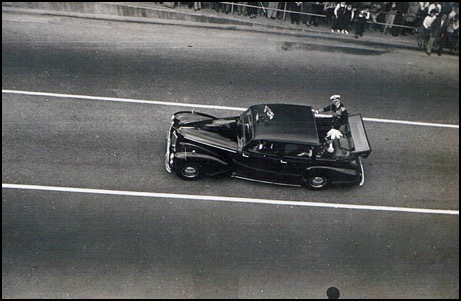
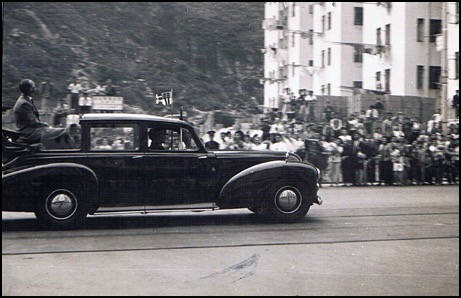
There was a large reservoir quite nearby, and to get there, we had to cross the road and climb the hill. At the back of the flats was the Ritz Hotel, which is where we would swim (and where I learned to swim). There was a large, open area where we would play and where boats would tie up at the end of a short pier. The Chinese seamen would sometimes throw us some fresh bananas from their overloaded fruit boats as they were leaving.
Below: A photo of the dock below taken from the roof of our flats.
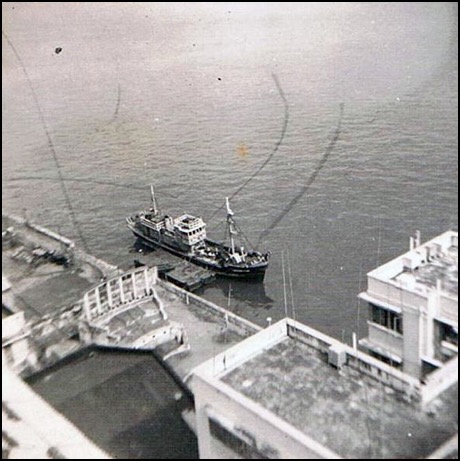
Below: Me in Sek Kong Village.
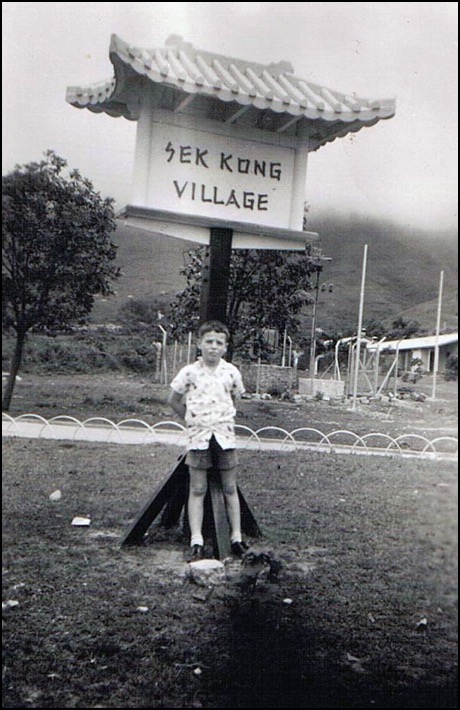
Then we were moved to Sek Kong Village (number 2b). I remember having to get the army bus at 5.45 in the morning to travel over Tai Mo Shan to reach school at St George’s. At break time, it was a race to get to the tennis courts where hot doughnuts were sold, and, if you were really quick, you could get a hot JAM doughnut. I must admit that I remember very little of the school as I never liked being there. I do, however, remember a visit from Princess Alexandra.
Below and bottom: Princess Alexandra visited our school. She is pictured with my classmates (below) and with me (bottom).
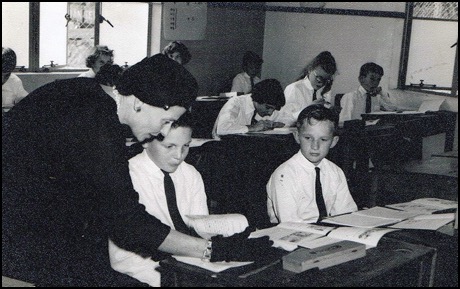
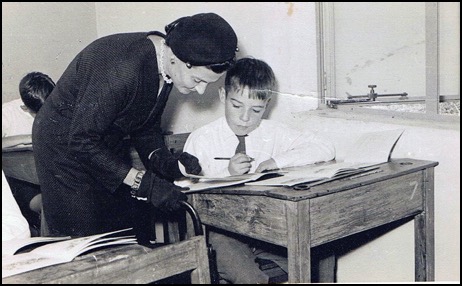
Below and bottom: Photographs of a couple of Christmas parties that we went to in Sek Kong Village.
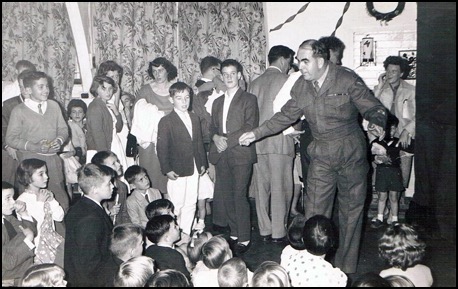
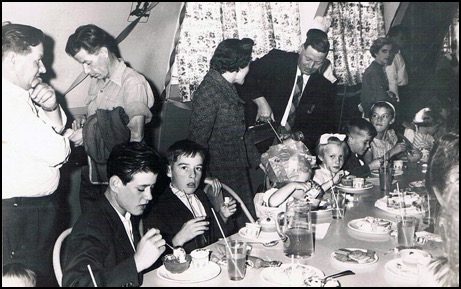
Below: Me at the front, with my brother, Billy, and our mother (Dorothy, “Dolly”).
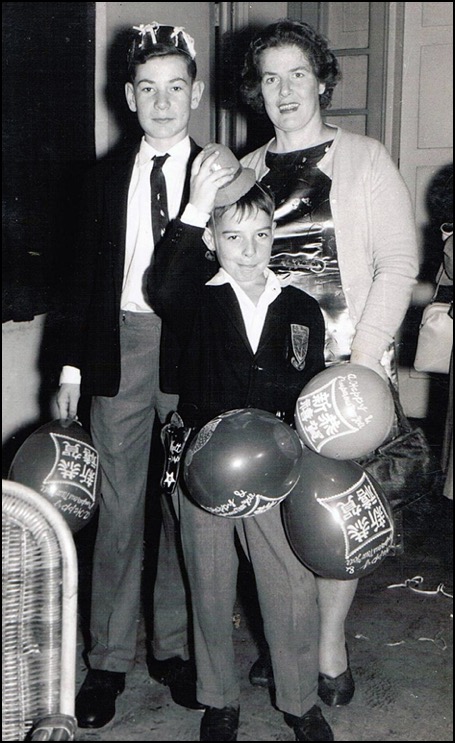
I remember one trip that we went on with my father to Stonecutters Island. I believe that he was doing some training or exercise, but Bill and I had a great time on the beach, fishing and playing. One day, we were sitting watching a soldier trying to teach his son to water-ski. We were laughing (that was a bit cruel of us), as the boy wasn’t very successful, when his father made a grab for us and caught me. He said that if we thought it was so simple then we were going to try it. I was in fits as I could not swim at the time, but he did not believe me and put me in the skis. Well, the boat took off with me following (with knees bent as I was too scared to stand up). We went around, and as we approached the beach, the man in the boat kept indicating to me to let go – let go!!!! But I couldn’t swim – why would I let go? Anyway, after going around again, my legs were so sore from being bent and from all of the shock-absorbing that I had no choice: I just aimed for my brother on the beach, hoping that he would rush out to get me. I let go and glided in till, luckily, I was standing in about 2 feet of water. I was never so scared in my whole life, and I never laughed at anyone trying to do anything again (lesson learned). I cannot remember much more of Hong Kong.
Below: Me, Dad and Billy in Hong Kong.
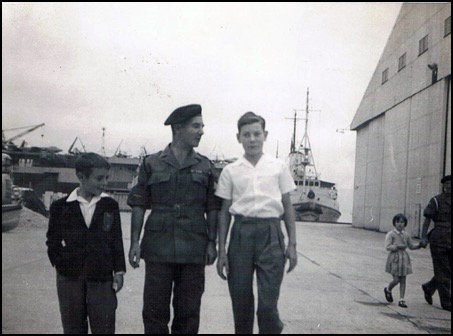
KENYA: NAIROBI AND NANYUKI
In 1961, we returned to England for three months. Then we were off again, this time to Kenya. We lived in Nairobi for a short time at first, before being told we were that moving to a town called Nanyuki. Nanyuki, we were informed, was right on the Equator, so, logically, we thought, “On the Equator: it is hot here, so it is going to be really hot there”, and jumped into the back of a Land Rover with no canopy on, wearing shorts and T-shirts. Did you know that there is snow on Mount Kenya? And Nanyuki is located near the bottom of it, so we were freezing.
At first, we were placed in a hotel that turned out to be the same hotel that owned “Treetops” (where the Queen was on holiday when she heard of her father’s death), which was basically a hotel built on sawn-off trees, with a manmade lake in front of it to bring the animals in to water. My brother Billy got a job as assistant “white hunter”, so we got to go there quite regularly, seeing a few film stars, among them Elizabeth Taylor and Richard Burton. Then we moved to what would be our house, with two African couples who were to be our house boy, cook, cook’s assistant and gardener. Next, we moved back to Nairobi to live and took our house boy and the others with us as we all got on really well.
Unfortunately, I have very few pictures of my time in Kenya, and I cannot remember the names of any of the schools that I attended whilst we lived in Nanyuki, but know that I went to Delamere Boys’ School in Nairobi. We returned from Kenya in 1961.
STARTING WORK IN GERMANY AND A CONFUSING RECEPTION IN SCOTLAND
Then it was off to (West) Germany. First, we lived in Lippstadt. I got a job with the NAAFI and a part-time job with the AKC [Army Kinema Corporation] cinema as a projectionist. Eventually, we moved to Düsseldorf, where I started work as a store man for the NAAFI. I and a few others managed to get the army to give us a building that we turned into a youth club, where we played table tennis and held dances, but it was mainly a get-together sort of place.
Then we returned to London where, after a short time, my father retired from the army. Just before this, I joined the Royal Corps of Signals myself, aged eighteen years. When my father did finally retire, we moved to Scotland (where he was born). This was my first encounter with bigotry. All my growing life within the army family, everyone always stuck together: we were “a family”, regardless of where you were born. So when I went to live in Scotland and became the butt of abuse simply because I was English, I was totally confused.
Anyway, that is the end of my “brat’s” life and none of my children followed me into the services.’
Stewart A May (b.1948).
PERSONAL STORY: 'I'M JUST SO GLAD I WAS AN ARMY KID'
Although both of her parents were from Northern Ireland, Joan McCartney (née O'Brien) and her twin sister, Toni, were born in (West) Germany, thanks to their father's army career. The O'Brien family later followed him (he was in the Intelligence Corps and Wiltshire Regiment) from Germany to Warminster, before moving to Cyprus, and then back to Germany. The family's next posting was to Hong Kong, which Joan describes vividly below. Joan concludes her story by reflecting on the effect that her childhood had on the person that she is now. For more, read on . . .
'My parents were both from Northern Ireland, and Dad joined the army in 1939. He went through the war in France, Germany and Holland, and then my mother travelled all the way from a sleepy little town called Larne to join him in Krefeld, [West] Germany, in 1947. No mean feat in those days, when the furthest she had probably travelled was to Belfast, about 20 miles away. My twin, Tonia, and I were born in BMH Wuppertal, and the parents had a large Silver Cross twin pram shipped out to them as a family gift! The German maid called it a "Klein Auto" ["small car"], which it probably was in comparison to the small, low prams in Germany at that time. We had a German lady who helped my mother with us – she was a German war widow and worked to keep her young son. We kept in touch until she died in 1980. We went back to visit her on another posting to Germany, at Herford, in 1960, and she still had a little pair of our baby boots, bronzed, hanging above her bed. The family all made us very welcome, and I have nothing but fond memories of that time – feeling half-German, I suppose, since Germany was the country of my birth and I had learned to speak the language.
From Krefeld, in 1949, my dad went to Palestine and Hong Kong, returning in 1953 to the School of Infantry at Warminster. This is where I started school, and I remember walking through leafy glades on the way home. I remember the big tiger's skin in the drill-hall store and the sashes that the soldiers wore. I remember taking a trip to Longleat and my mother hobbling all the way because her feet were killing her on the long walk to the house from the gate. We lived in army quarters at Imber Road.
LIVING A SOCIABLE LIFE IN CYPRUS
From there, we went to Cyprus in 1956, first to Nicosia and then to Famagusta. My first sight on arrival in Nicosia was the burned-out fuselage of a plane at the airport – it had been attacked by terrorists a week or so before we got there. We lived in Aretusa Sokagi, in the Turkish quarter of Nicosia, but our landlord, who lived in the other end of the house, was Greek. All of us children played together, and they taught me to speak some Greek and Turkish. They fed me their food, included us socially in everything, and even killed a chicken every Sunday for my mother to cook Sunday lunch with when we weren't at the mess! That's how I know what a headless chicken looks like. If we ever wanted something to eat, we simply plucked an orange, fig, pomegranate or a bunch of grapes to quench our hunger or thirst. We slept in camp beds on the floor below the level of the window since the threat from EOKA [Ethniki Organosis Kyprion Agoniston, or National Organisation of Cypriot Fighters] terrorists, who wanted union with Greece, was very high, and shots had been fired at previous occupants of the house. Water was rationed, so we got used to filling up the bath and using the water from it for cooking, washing and flushing the toilet. Maybe that's why I still hate to see water and food being wasted! I remember being out one night with my parents and some Turkish friends, and everyone was eating oysters – I found a pearl in mine, and can still remember the delight, feel the heat and smell the jasmine of that night.
Life continued pretty uneventfully for us kids. We got used to going to school with armed-soldier escorts, going for choir practice in the camp in a 3-ton lorry with armed soldiers – it was life, and it was fun. We learned to be very sociable, too: Sunday lunch at the mess and all sorts of beach outings were arranged. Thinking back, our parents must have hidden the dangers from us very well – the only time I was frightened in Nicosia was when we were told we had to pack and be ready to leave at a moment's notice for England. The Suez crisis had broken, and our dads were going to have to go to Egypt! I didn't want my dad to go, and I didn't want to leave Cyprus. Thankfully, that didn't happen, and we moved to Famagusta, to a beautiful house in Salamis Road. My dad, who was in the Intelligence Corps, was stationed about 2 miles up the road.
Our house overlooked some fields, which led up to the Old City walls, and my sister one day decided to burn some ants out their nest in the field. In tinder-dry conditions, the fields caught fire – all of them. Picture the scene: flames, mother trying to run a hose across the road from the fish pond in the garden, flames leaping up the telegraph poles that carried all the communications to the camps, my sister in deep, deep trouble and my father mortally embarrassed because his new boss was staying with us until his family arrived from the UK! Explain that one, Dad! Toni got thumped because in those days, unfortunately, it was politically correct to smack your children. I remember standing shouting at the parents as they took it in turns to berate her – that's where my rebel streak against authoritarianism comes in. But she lived on to light more fires, and is still fascinated by flames! It was in Cyprus that I learned never to let the sun go down on your wrath. My mother always made us kiss Dad goodbye, say "See you later", and make up for anything that had happened – just in case something happened and you didn't see Daddy again . . . I remember having to clean our sandals, to have them shining for Dad to inspect, and to this day I always have shiny shoes, and so do my grandkids. I can still see my dad, with his brass button stick, brush and yellow duster, cleaning his buttons and his medals and spit-and-polishing his boots and shoes.
Our Greek landlord welcomed us into his family, and I went out on many a trip with them, as well as with our Turkish friends. A grapevine grew up one side of the house, making a carport-like shelter, and it was under this that we had our birthday parties. I could lean out of the windows and pick grapes and, again, all the fruit I liked in the garden. Swimming lessons from school were held at Famagusta Beach, and we played in and on the Old City walls and in the moat for hours. I remember visiting a friend of my parents, who was a broadcaster on forces' radio. Willis Toogood was his name, and I remember asking my parents why Uncle Willis was so thin. Skeletal, in fact. They gently explained to me that he had been a prisoner of war in a Japanese concentration camp and still could not digest food properly – twelve years after the war had ended. From that arose my interest in the Japanese war atrocities that were committed.
I remember the day that two army wives were shot in Famagusta. They were out shopping for a daughter's wedding dress when they were attacked. Toni and I were visiting a friend when a Land Rover arrived to pick us up and bring us home before a curfew was imposed. I remember seeing trucks and trucks of Greek men being taken to Karalos Camp up the road for questioning, and the Turks from the Old City standing on the walls waving the Turkish flag. Some Greek villages were burnt out that night in retaliation for the killing of the British wives.
When we left Cyprus, we had to travel by army bus to Limassol to board the troopship [SS] Dilwara. We were unescorted, and all the soldiers had to check in their weapons before they left. I remember being frightened that we would be attacked by terrorists, and kept a nail file and a pair of scissors in a Cadbury's chocolate box – just in case! When we got to Limassol, we had to board an army landing craft, sail about a mile out to sea and climb up a rope staircase to board the ship – you had to synchronise the movement of the ship and landing craft and jump when the moment was right! There then followed a ten-day cruise to Southampton, which included school (on board, of course) and wonderful silver service in the restaurant at mealtimes. (Hence my love of fine dining!) We then stayed in Northern Ireland for a few weeks' leave before going to Germany. I certainly never felt at home there, even though my granny and family were there. After all, I really didn't know them very well: I'd lived abroad most of my life, and only knew them from letters and short visits every couple of years or so.
RETURNING TO GERMANY, THE COUNTRY OF MY BIRTH
That leads us quite nicely to Herford in Germany. We left the UK at Harwich and sailed to the Hook of Holland, where we joined the huge troop train that travelled all through Germany. It must have taken us a day or two – I know that the journey felt absolutely interminable, and that we slept on the train. We eventually got to Herford, where the train was delayed by my mother catching her heel in the foot grille of the train. The shoe fell off on to the track, and a gallant soldier went below the train and retrieved the very stylish, red, pearlised-leather, stiletto-heeled shoe. To the cheers and the shouts of the rest of the train, my mother, who had been standing with her foot on a case, had her shoe replaced like Cinderella, and we had arrived in Herford. We stayed in a families' hostel for a couple of weeks until our quarter in Eichenstraße was ready. There we had TV, central heating and all the things that you certainly didn't get in the UK, along with good schools, modern equipment and the best teaching you could have.
I remember having my tonsils out, travelling to BMH Rinteln and seeing these buildings built in the shape of a swastika. Apparently it had been a German Army HQ in the war. I remember the soldier–patients taking us kids out and having wheelchair races around the grounds. I passed my Eleven Plus in Herford, and was supposed to go to Plön or Hamm boarding school, but we moved to Rheindahlen instead, where we went to Queen's School, a forerunner of the modern comprehensive, I suppose. I was in the "A" stream, and my twin was in "C" since she hadn't passed the Eleven Plus. A good life was had in Rheindahlen, with sports days, corps days, kids' days out, Christmas parties, the cinema, tree houses in the woods and trips to Hameln and Steinhuder Meer. We lived in Norwich Walk, and the woods were just across the road. I remember the deep, deep snow and the bright blue skies in winter, and the lovely hot summers. We used to go to Holland on Saturdays – to Roermond and Helmond – and eat chips and mayonnaise out of paper cones. My dad had fought at Nijmegen, which wasn't too far away, during the war – I think that is why so many of my friends had fathers who were silent at times: their experiences and bad memories had made them like that. They also knew nothing but authoritarianism, and that's why we kids were so regimented. Products of our time, which probably led to a lot of us being free spirits, free-willed and independent-minded people, when we grew older.
LEARNING LESSONS IN LIFE IN HONG KONG
From Rheindahlen, we were posted to Hong Kong. We called in on the family in Northern Ireland for a few weeks, and Mum bought us some lovely new clothes to go to Hong Kong in. We flew from Heathrow, and after about twenty-seven hours and stops in Istanbul, Karachi, Bombay and Bangkok, as well as a lot of turbulence (I remember the plane just dropping for ages when we hit air pockets – thank goodness that doesn't happen now), we got to Hong Kong in one piece.
Once in Hong Kong, we moved to the first floor of a building in Blue Pool Road, Happy Valley. It was a beautiful flat, but I remember one night, when the parents were out, when a giant cockroach came to visit. My sister and I were terrified, and by the time that our screams had alerted the neighbour in the next-door flat, who came to our aid, we had filled the air with DDT [dichlorodiphenyltrichloroethane] from one of those old pump-spray contraptions that were around in the 1960s. When my parents eventually arrived home, the fumes were leaking out into the night air, and the cockroach lay dead below a pile of shoes at the foot of the TV. It had really showed itself off by walking slowly up the TV screen before one final shoe was flung and it met its demise! I remember our neighbours, from the Northumberland Fusiliers, adopting a little Chinese baby called Penny (my goodness, she must be about forty-nine now – aaargh!)
If we needed new shoes, we got taken to the shoe shop, where our feet were measured, and we collected our handmade shoes a few days later. Dad walked around in these fabulous, handmade bespoke suits, and Mum and we girls had a wonderful wardrobe of handmade dresses. Even St George's School's uniform was handmade. We moved to Kennedy Road, to a flat overlooking Victoria Barracks and the harbour – wonderful views, even when we had a typhoon, and ships would be lying up against the harbour walls. We used to go down to HMS Tamar, and were allowed to board navy vessels like [HMS] Ark Royal and the Australian Navy aircraft carrier [HMAS] Melbourne. How many kids in the UK had those opportunities or learning experiences? I remember when there were a couple of typhoons, going with one of the other mums and my friends to a typhoon shelter and helping to make up clothing and food parcels for Chinese people who had lost everything in the storm. We learned how very fortunate we were to have the lifestyle that we enjoyed, and learned to help and consider other people.
Every day, the school bus collected us and took us to the Star Ferry to travel to St George's School in Kowloon. We were not allowed to travel on the lower deck of the Star Ferry – that was for "Chinese and hawkers". We were "ambassadors for Britain", and had to travel in keeping with that status, so we had to sit on the top deck. Needless to say, we often sneaked on to the bottom deck, but it was pretty grungy and grubby, so we made our way back up to the first-class saloon! We would then queue for a bus at the ferry terminal, but queuing was not a thing that the Hong Kong Chinese espoused in any way at all, so we had to fight our way on to the bus up to Kowloon Tong – sharpened elbows and all that. I remember going to the China Fleet Club, on Hong Kong side, to the cinema, with its rows of rattan seats and crowds of American sailors from the US 7th Fleet on R and R [rest and recreation] from Vietnam, all fascinated by these British kids and their English accents. I remember my dad meeting a couple of sailors on Christmas Day on his way back from the mess and bringing them home for Christmas dinner! I also remember him jumping out of a taxi on Garden Road and dragging my sister and her friend home because he spotted them out walking with two US sailors – at the ripe old age of thirteen!
We soon settled into St George's School. I was on the hockey team, Toni being keener on netball. We had a music teacher – the Welsh Nationalist Mr James, or Jamison – who taught us all sorts of Welsh anthems to sing on BFBS [British Forces Broadcasting Service] radio for St David's Day. The choir's performance in Hong Kong City Hall was recorded, and I remember singing "Men of Harlech" and the Welsh national anthem. (To this day, I'm still word-perfect in it.) I remember the male teachers in their white tropical kit wandering around with their black academic gowns on – so incongruous a sight, yet so British! I recall speech days, when the grassy quad would have chairs placed on it and we would all sit there while the usual speeches, cups being handed out and so on were gone through, perspiring, with shiny brows and being eaten by mosquitoes. The day when Princess Alexandra came to visit and some wag hoisted a pair of pink boned corsets up the flagpole! Swimming at the Gun Club Hill swimming pool and playing hockey in what passed for winter. There was no air-conditioning then, just ceiling fans and floor fans all over the place, recycling hot air. Watching TV and the progress of the Vietnam War (all in black and white, of course), and wondering if it was going to come to Hong Kong. Going to Murray Barracks' mess and thinking, "My goodness, this is where the Japanese were during the war" – and then pondering on what had happened to the prisoners of war then.
Weekends were spent at Shek O Beach, Deepwater Bay or Repulse Bay, which, in those days, was a beautiful beach surrounded by green hills. Looking now at the skyscrapers and apartment blocks, I'm so glad that I enjoyed it in its unspoilt state. Sunday lunch was at the mess, and I will always see the buffets and the curries in my mind, as well as the obligatory stuffed pig's head, with the apple in its mouth, that featured at all army buffets! (My dad could cook a mean curry right up until a few years before he died.)
Victoria Barracks is now Victoria Park in Hong Kong. I remember walking down through the camp from Kennedy Road, past all the old blocks of army quarters – they were old buildings, of which a few have been preserved, with big, wide verandahs and fans – down through the vegetation to the swimming pool, passing on the way the Gurkhas who were stationed there. I remember seeing them parading at night when they were going off duty, before they left camp: they were so smartly dressed in their blazers and flannels, and were inspected before they went – the British squaddies went out in their Hawaiian beach shirts and whatever else. I’ve always had much admiration for the Gurkhas from that time.
We had an amah who lived in the flat with us, and she taught me quite a few Cantonese swear words, which I hurled at the parents occasionally – the rebel in me again. She used to encourage me to swear at the other amahs in adjoining flats, and they thought it was great fun – this mad, European kid swearing at them in their own dialect!
Living in Hong Kong taught me a lot about society and the haves and have-nots. It taught me to appreciate what I had, and to help and share with other people who did not have what I did. I loved the heat, the smell of the ground and foliage after a downpour of rain and the steam rising up from the ground. I still have a deep fear of creepy-crawlies and become hysterical if I see a cockroach when I visit my sister in the States. I feel a little bit cheated in that she is living abroad and I am not. I married, and my husband is not interested in travelling. I, however, feel that travelling is in my blood, and know that I will end my days in the sun. It's my promise to myself. Why else would I have a couple of potted palms about the house? Wherever I hang my hat is my home.
I SEE THE ARMY-KID LIFE AS BEING AN ALTERNATIVE LIFESTYLE
I have noticed that some contributors [to TACA] have commented on feeling "rootless". I see the army-kid life as being an alternative lifestyle to that which is rooted in one place, and kids adapt. Why hanker after something that cannot be – and is it necessary to be rooted in one particular place or society? Surely it's a question of how you adapt and accept your own circumstances?
I am so glad that I had the childhood – to the age of sixteen – that I had. I experienced wonderful situations, places and people, and am adaptable, resilient, independent and free-spirited, with an openness to new experiences that always amazes others. I will agree that when we finally came back to the UK I certainly felt "out of it". It was like landing on another planet – the life that I had experienced was totally at odds with what it was like here in Northern Ireland at the time. I was accused of being a snob and of speaking in a posh accent. I overcame all that, made friends and have had very successful life. I still feel a little bit different – at the age of sixty! I’m still up for a challenge, looking over the horizon, not wanting just to sit down, retire, do the garden and look after the grandkids. Thank goodness my friends think along the same lines as I – some a little bit more so than others. I'm thankful for my education, which I think was second to none – it was run along public-school lines, and that gave me the grounding for everything that I have become. I'm just so glad that I was an army kid.
OUR DADS HAD BEEN SCARRED BY THEIR WARTIME EXPERIENCES
A generation of army kids grew up in an authoritarian atmosphere, with dads who had been physically and mentally scarred by their wartime experiences. It wasn't fashionable in those days to talk or to be counselled – you just had to get on with it. It wasn't until my father was in his late seventies and eighties that he began to tell us of his experiences and fears. I know now why he always had to have a light on at night – it was for when he woke with the terrors and thought that he was back in his dugout in Germany, France or Holland and felt that he was going to die. It was totally incomprehensible to all of us then – it is only now that I have begun to realise what made him the man he was, and why. At his funeral service in Belfast, he at last received the honours that he was due. We gave him a "mini" military funeral after his years of undignified old age in a nursing home. He was "suited and booted" to the nth degree and "Looked just like himself". The only music we had was the Call to Arms of the Wiltshire Regiment, the Last Post and, at the very end, "Killaloe", the regimental tune of the Royal Irish Rangers, a jig that raised everybody's spirits as we imagined Dad jigging along to it. Buglers from the 4th Rifles in Ballykinler played, and were much appreciated. It was a humanist service, and we talked about Dad and his life, telling tales that were poignant and funny. Everyone was in awe and in tears – it was a good sendoff for "An old soldier gone to his rest".'
Joan McCartney (née O’Brien, b.1948).
PERSONAL STORY: MY LIFE AS AN ARMY CHILD
On contacting TACA, Sheila Danks (née Wayman) wrote, 'Father seemed to serve in so many different regiments: 40th Field Regiment, Royal Artillery; 49th Field Regiment, Royal Artillery; 50 Missile Regiment, Royal Artillery; 51st Highland Division; and he also served in Anglesey with the Honest John missile'. As a result, Sheila lived in Dortmund, (West) Germany, from 1951; Cyprus, from 1954 to 1956; Colchester, from 1956; Hong Kong, from 1957 to 1960; Anglesey, North Wales, from 1961; Perth, Scotland, from 1962 to 1965; Menden, (West) Germany, from 1965 to 1967; Devizes, from 1967 to 1968; Lippstadt, (West) Germany, from 1968 to 1969; and Dorchester, from 1970. Sheila shares her memories of her childhood as an army child here.
'I was introduced to this world at BMH [British Military Hospital] Iserlohn, in (West) Germany, in 1951. Dad had been posted to Napier Barracks, Dortmund in 1949; he was only twenty years old, and in the same year my mother was expecting my brother.
Cyprus was the first posting that I remember significantly. Triptotolomew Street, Famagusta, was a child's dream for a playground, but with all the bombs, bullets and explosions going on, Mum was very wary not to let us out on "bad" days. My first memory is of going shopping in the square in Famagusta, with Mum pushing my little canvas pushchair – all of a sudden, someone shouted to her "Get the hell out of here", and seconds later, a bomb went off! EOKA [Ethniki Organosis Kyprion Agoniston, or the National Organisation of Cypriot Fighters] terrorists were always doing this. To this day, I can't stand sirens, ambulances, police cars and so on: they send shivers down my spine and just remind me of those times. With Makarios and Grievas slogging it out between them, the island maintained an uneasy peace. We visited Karalos Camp with Dad quite a few times, and my brother and I were both struck by all that we saw.
Our next posting was to Corsham, in Wiltshire, but we weren't here for very long, and I really can't remember much about it. We had quite a few "short-burst" postings: the next one was to Catterick Camp, Yorkshire, and then to Colchester, Essex, where Dad was stationed before being sent to Hong Kong. Colchester was a typical army town, and all the army families knew each other, sometimes personally. The NAAFI was the mainstay of the community, with the medical officer next on the agenda. Colchester was my first experience of "handing over" a married quarter: every knife, fork, spoon, blanket, carpet, pot and pan, chair, plate and ironing board, plus all the other household items, had to be signed for when moving in and signed for when moving out. Mum seemed to be quite good at this, but the procedure was always taken over by Dad, just to make sure that everything was shipshape.
I was six years old when we left on the troopship Nevasa to go to Hong Kong. Gibraltar, Port Said, Aden, Ceylon, Singapore and, finally, Hong Kong was the itinerary. My brother and I both thought, "Whoopee! No school", but there was a form of school on the boat that went over all the old work that kids had done just to keep their noses clean and them out of trouble. We had all the usual fancy-dress competitions and children's play groups to keep us occupied. As Dad wasn't an officer, but merely a sergeant, we shared our toilet facilities with other families – bath time was fun when splashing the other kids. Only officers' kids got their own facilities – it was very much a case of them and us.
Hong Kong was another world, and like an adventure land for us kids, with Fanling Market, Yuen Long, Castle Peak Beach and so many other places to see. Dad was in the 49th Field Regiment, Royal Artillery, and was based at Sek Kong Camp. We lived at 31A Sek Kong Village, which was a two-bedroomed, semi-detached bungalow (Sek Kong Village was full of these bungalows, which were allocated according to rank). Our amah, Ng Sung, was a little petal. She didn't understand much English, so we'd teach her English words (but sometimes the wrong ones), and she'd teach us Chinese. She lived in a little room off our bedroom, and to this day I have never understood why her toilet (Elsan) was never part of the sewerage system, as ours was; every week, the lorry would come round and empty the amah's toilet, which never made sense to me. I also remember that Mum was terrified of the gigantic cockroaches that would visit the house.
Sek Kong School was run by the BFES [British Families Education Service], and was my first introduction to an army school. At the bottom of the village was the ABC store, run by the locals (ABC went bust shortly after 1997). The army life was like living in a community village. Mum and Dad seemed to go most weeks to the sergeants' mess, where an endless round of summer balls, parties, get-togethers and so on took place. Dad would often return home a little worse for wear from the mess. One day, some squaddies from the camp in Sek Kong stole a 3-ton army truck and took it over Route Twisk (Tai Mo Shan). They ended up upside down in a ditch halfway up the mountain – needless to say, they were both court-martialled. The airfield at Sek Kong would hold an annual get-together for all army families, and the children could take part in a mule pack transport with a Gurkha soldier.
I have such fond memories of Hong Kong, and of photographs being taken outside the old Bank of China (now no more) in Nathan Road, the old Tiger Balm Garden, Kai Tak Airport and Hong Kong Island. Hong Kong Island had buildings along the edge of the harbour, but that was about its lot in those days: there were not many high-rise blocks or hotels, and there was a population of just 3 million (now it's nearly 7 million). The rickshaw wallah would pester you to have a go in his rickshaw, and many a photograph was snapped with my brother and me sitting in one of these. The rickshaw, again, is no more. One thing that is still going strong, though, is the good old Star Ferry. You can still see the ferries ploughing backwards and forwards from the mainland to Hong Kong Island all day, every day. They haven't changed much over the years, and are still the same old green that they always were. I have not so fond memories of the medical officer in the army clinic dishing out booster jabs for typhoid and yellow fever. I took one look at the huge needle coming towards me and ran down the hill to the bottom of the village.
I last went back to Hong Kong in 2008. Sek Kong Village is now paraded by Chinese soldiers, who watch every move you make. No cameras are allowed, and if you walk off the main road on to a side road (the old Middlesex Road), they're on to you like a ton of bricks. The school is closed, but still has "British Forces Army School Sek Kong" in bold letters on the outside – quite moving, really. A lot of the bungalows are no more and have been replaced by high-rise flats in an attempt to rehouse people.
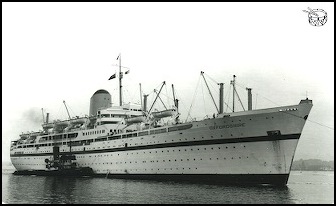
We left Hong Kong on the troopship Oxfordshire, and again took the same old route back to the UK. I cried my eyes out when we left, and wondered what the next place would bring us. Little did I know what a contrast this would be.
THEY THOUGHT WE WERE FROM A DIFFERENT PLANET
In 1961, Dad was stationed at Ty Croes Army Camp (Trials Establishment Guided Weapons Royal Artillery, or TEGWRA), in Anglesey, North Wales, and we were living in married quarters near the camp. An Honest John missile with a notice saying "Caution Children" welcomed you on your entrance to Ty Croes Camp. As Dad was still a sergeant, we lived in the old Nissen huts just at the entrance to the camp. Having an Honest John missile greeting you every morning when you looked out of the window was something different! (The Nissen huts are no more, and everything was flattened in the mid-1960s.) Going to a Welsh school after a BFES school was something else again: Welsh assembly, Welsh language, Welsh kids! Some of the kids thought we were from another planet after living in Hong Kong. Dad wasn't here very long before being posted again to Perth, in Scotland, in 1962.
Perth was another culture shock! Lots of children lived in tenement blocks, six flats to a block, with just rows and rows and rows of them making up the whole district where we lived. We were allocated quarters in a three-bedroomed, terraced house, with no heating and a small front and back garden, and were again given an inventory book handing over all the "army gear". Lots of the kids thought we were snobs because we lived in a terraced house, and again, considered us to be from another planet after living in Cyprus and Hong Kong. Many of the kids had never been outside their county, let alone the country. Perth knocked the shoulders off me, and we quickly learnt to stick up for ourselves as Sassenachs. We soon picked up the accent, and everything was "Ye cannae dae this" and "Ye willna dae that". We were introduced to the leather strap at school, but to be honest, the schooling was the best we had. Winter 1962/63 was spent living in Perth, and it was freezing! Dad was stationed at Queen's Barracks, Highland House, 51st Highland Division. We lived in Perth for the maximum three years, when Dad was told that his next posting would be to Germany. I couldn't wait to leave Perth, but little did I realise what Germany was like in the mid-1960s.
Northumberland Barracks in Menden, in (West) Germany, was our next abode from 1965 to 1967. A three-bedrooomed, end-of-terrace house with a cellar was allocated to us as a married quarter. The battery quartermaster sergeant (BQMS) and his sidekick were there with an inventory book, handing over all and sundry to Mum. Cornwall School, in Dortmund (now no more), was another BFES school that we attended. Wednesday evenings would be spent at the Youth Club in the barracks, and Dad introduced my brother and me to a lot of local sights, including Hanover, Hamburg, Berlin and countless military cemeteries in and around West Germany. Dad was a stickler for timekeeping, and the house was never a home: it was a barrack room, bless him! Little did we realise how this sort of life would shape our future lives forever.
Yet more postings followed, the next time to Prince Maurice Barracks in Devizes. We lived in Ferozeshah Road, whose houses, I believe, are now privately owned. The barracks were flattened in the late 1980s. I had left school by now, and was going to Trowbridge Technical College, but wasn't there for too long before there was another posting, this time, back to Germany. Waldenburger Straße, where we lived next, was situated just down the road from Churchill Barracks in Lippstadt. I disliked the German people, and didn't really want to go, but had no choice in the matter. I did not enjoy the posting and couldn't wait for Dad to be moved on again. I was now seventeen years old and beginning to flap my wings a bit. Dad was soon posted back to the UK, to Dorchester, and we moved into the near-derelict buildings known as Poundbury Barracks. The flats there were near the old Territorial Army headquarters, and were damp, dismal places in which to live. There was no heating, just electric fires on the walls – even in the height of summer, it was still cold.
Dad left the army in January 1970. He never really got used to civvy street, and obtained a job working in the stores at Blandford Camp in Dorset. He was told, aged forty-eight, that he had multiple sclerosis (MS). He died aged fifty-eight – what a waste. He would drum into our heads that we were never to give in and to fight on regardless, but when he was told about his MS, he gave up the next week.
REFLECTIONS ON MY MILITARY HERITAGE AND UPBRINGING
My treasure from all those years ago in Hong Kong is a heavily carved camphor-wood chest that Dad bought. It's not worth a great deal, but has been everywhere that I've been. I grew up with it. It sits in the conservatory, and I'll always keep it, despite the lack of room. I have one photo of Dad in his army kit, aged twenty-six, taken in Malta, and I cherish it. I come from a very military background: my great-great-grandfather, great-grandfather and grandfather all served in India. I've been doing a family tree and have just found out that my grandparents, great-grandparents and great-great-grandparents were all in India from 1875 onwards, in summer camps near Bangalore, north of Delhi, Meerut and Kasauli.
Being an army brat is certainly a different way of life; it's got its drawbacks, but offers more variety, openings in life, chances and opportunities than are available to the ordinary kid in the street. I went to eight schools in all, but to this day can't really say that it affected my education – if anything, it enhanced it! When I speak to parents who insist on sending "little Johnny" to the "best private school" in the area, I often have a chuckle and think to myself, "There's no way they will get the education and opportunities we did". Army life teaches you a certain way of life: you learn to stand on your own two feet, and quickly, too. Army brats were a different breed of kids and, to date, still are.'
Sheila Danks (née Wayman, b.1951).
PERSONAL STORY: 'IT SURPRISES LISTENERS WHEN I SAY THAT I WAS AN ARMY BRAT'
Chris Crowcroft's father was Captain Edward Crowcroft, MBE (1912–91), late director of music of the Women's Royal Army Corps (WRAC), who served in the British Army from 1940 to 1969, rising to become bandmaster/director of music within both the Yorkshire Brigade and the WRAC, as well as for the Singapore Regiment during a secondment. Born in 1952, Chris writes that he was adopted by Bandmaster and Mrs Edward Crowcroft, of the West Yorkshire Regiment, while they were stationed in York. The years 1952 to 1955 saw the family in Malaya [Malaysia] during the Emergency, based at Penang, Taiping, Ipoh and then Singapore. After their return to York, a posting to Northern Ireland followed on a minor outbreak of the troubles, with the Crowcrofts living in Omagh and Ballykinler from 1955 to 1956. Next, there was a move to Colchester, Essex, between 1956 and 1958, on the amalgamation of the West and East Yorkshire regiments, and then to Pontefract from 1958 to 1959 and to York (Strensall) from 1960 to 1963. In 1963, Chris became a student at the Duke of York's Royal Military School, Dover, Kent, the family living in hirings in East Grinstead (West Sussex), Lingfield and Guildford (Surrey) between 1963 and 1969, when his father was with the WRAC. Chris sums up his army-brat experience as follows.
'On the face of it very civilian, with an Oxford degree, a received accent and a professional career in the arts, it surprises listeners when I say that I was an army brat travelling the world in late Empire, living in barracks until I was ten, where many "old sweats" were veterans of World War II, and, indeed, of pre-war India service, while veterans of World War I were men barely in their sixties (the Chelsea Pensioners had men from the Boer War and previous North African campaigns). All in all, I lived in a military environment (because of going to military school) until the age of eighteen, and would most likely have applied for RMA Sandhurst [the Royal Military Academy Sandhurst] had it not been for the semi-civilianising of the school in the mid-1960s and the huge explosion in university education in that decade. In the event, I studied law at Oxford from 1971 to 1974, went to Verona, Italy, to TEFL [teach English as a foreign language] and then made a career in London in sponsorship and fundraising for the arts, as a professional from 1976 to 2003, and as a board volunteer from 2003.
I guess that I had the unusual experience of life in both male and female regiments, in sergeants' and officers' messes, due to the unusual career of my father, who, before joining up in 1940 as a bandsman, was variously a Bradford working man, an industrial chemist (a career cut short by the Great Depression), and thereafter a travelling musician (he was a trumpet-player) during the 1930s in brass bands, variety theatre and dance and cinema bands, ultimately in London, where he met his wife. Having joined the army during World War II as a bandsman in the Royal Artillery (RA), he undertook active service as a sergeant of the gun, RA, fighting at El Alamein and therefore being a Desert Rat in the Eighth Army. He then became acting bandmaster of the RA Band in the Middle East, after which he was a student bandmaster at Kneller Hall [the Royal Military School of Music in Twickenham, Middlesex] between 1946 and 1949; he was a member of the fanfare team for the wedding of HRH Princess Elizabeth in 1947. Between 1949 and 1962, he was variously bandmaster of the West Yorkshire Regiment, and then the Prince of Wales's Own Regiment of Yorkshire, and senior bandmaster of the Yorkshire Brigade, serving in the UK, Austria, Malaya and North Africa. From 1962 to 1963, he was seconded as acting captain/director of music (invalided home) to the Singapore Regiment. And, finally, between 1963 and 1969, he was director of music of the WRAC. I have a fifty-page memoir of his life.’
Chris Crowcroft (b.1952).
PERSONAL STORY: MY ARMY LIFE, AND THE CONSEQUENCES OF MY PERIPATETIC UPBRINGING
An army child between 1953 and 1965, Julie Hewitt moved with her parents and sisters from Sussex to County Durham and then to East Yorkshire before spending three years in Cyprus, thereafter living in Sussex and North Yorkshire following the family's return to the UK. After sharing her story below, Julie reflects on the influence that her army childhood – and particularly 'going to too many schools and living in too many houses' – had on the adult that she later became, concluding that 'While you cope with it at the time, it does immeasurable damage'.
'My father was born in 1912, in very impoverished circumstances, and knew at a very early age that he had to get away from the poverty and make something of himself. He was the eldest son of twelve children. He joined the Royal Artillery in 1931, going to India in 1932. He returned to the UK in order to be available for active service for the war in 1939, marrying my mother in 1944, three months before being involved in the Normandy landings. He obtained his commission in 1955 and retired from the army in 1965.
I was born in 1953, when my father was forty-one, and my mother, thirty, at the TA [Territorial Army] Centre in Upper Brighton Road, Worthing, Sussex. I have three older sisters and one older brother, who died. My eldest two sisters were born at my mother's parents' house in Otterburn, Northumberland, in 1946 and 1947. My brother was born in Glasgow, when my parents were stationed at Maryhill Barracks, in 1949. He also died there six weeks later. No one ever went back to his burial ground until last year, when I finally found it. As my mother had been very ill for the whole of his life, she could not remember where he was buried, and memories are difficult to retain when one moves about so much. My nearest sister was born in 1952 in Rustington, Sussex. My mother was born in Otterburn, Northumberland, and my father was born in Barrow Hill, Chesterfield, Derbyshire. Both of their families were from those areas.
Following the TA Centre, my family moved to Longfellow Road in Worthing. I don't know when or why, and, in fact, it is only in the past year that I discovered that I had lived there. I thought the family were there before I was born.
When I was about six months, so probably still in 1953, we moved to Barnard Castle in Durham and then to Sutton upon Hull in East Yorkshire, probably in 1955. It was while we were in Hull that I started at infants school.
In February 1960, when I was nearly seven years old, we moved to Cyprus and lived in a house in Nicosia for ten days. I was split up from my sisters, who all went to a different school while I was still at the infants school for a short time.
Within the three years that we spent in Cyprus (we left in February 1963), we lived in six houses (in Nicosia, Famagusta and Dhekelia) and I went to four different schools, my sisters going to three. I have never understood this as it is a small island and we could easily have lived in one house, going to one school, while my father moved around the island. For all of us, the years in Cyprus were the best as a family. My parents got on well, they had a good social life, we went to the beach nearly every day, we lived in nice houses and it was warm most of the time.
On our return to the UK I was nearly ten years old, and we spent four months in Lancing, in Sussex, while my father negotiated an extension to his army career. I went to a school in Lancing, along with one other sister. Our time in Lancing was miserable. It was the winter of 1963, which was one of the worst on record, and we had just spent three years in a warm climate and had no winter clothes. The house we were renting was heated by solid fuel, and the country had run out of solid fuel, and then my mother's mother died suddenly on her seventieth birthday, when my mother was only forty years old.
We then moved to York, later in 1963, where we had two different houses, situated in the barracks, and I went to two schools, one a junior and then on to a secondary modern, a different school from my sister as she passed her Eleven Plus and I did not. I was a borderline pass, and when my mother and I went to the grammar school for an interview, my mother told the school that we would be moving again, and so I did not get a place.
MY FATHER NEVER CAME TO TERMS WITH HAVING TO RETIRE FROM THE ARMY
My father was then required to retire from the army, but still needed to work, and, I think, found it difficult to know what to do. We moved to Louth, Lincolnshire, in 1965, to a pub that my parents managed for some friends, and I moved school again. This arrangement didn't really work out, and so we moved out into a rented house in the next village while my parents found something else. To my regret, we persuaded my parents not to have another pub as my nearest sister and I were just into our teens and felt we needed to have more time with our parents, and they were busy in the pub during the day and at night, so they bought a post office instead. My mother has since told me that the time in the pub was one of her happiest.
So in 1967 we moved to a village outside Retford, Nottinghamshire, and I moved to my final secondary school. This again did not work out, partly as my father's health was deteriorating due to acute chronic bronchitis, which he developed as result of having been born and brought up in a mining area and briefly working in the mines before joining the army. He moved to a desk-based job for a while.
I went on to do O' and A' levels at a college of further education in Worksop, Nottinghamshire, and we moved house again. My eldest sister married in 1969 and my other older sisters started to move away to college. My parents had one further move together and then my mother moved out and my parents separated in 1977. My father never came to terms with having to retire from the army: it had been his life and had "made" him as a person, and civvy street was never good enough for him. He died a very sad man in 1995.
After my college of further education, I moved to Hull to go to Hull College of Commerce, and since then have lived in a further fifteen houses, in Doncaster, Sheffield, Leicester, Edinburgh and Newcastle upon Tyne. I have lived in my current house for sixteen years.
IT IS NOT THE MOST SENSIBLE LIFE FOR A CHILD
In total, I have lived in thirty-two houses, and I will move again when we retire in three years' time. I went to nine schools and two colleges. I have lived in fifteen towns.
It is as a result of this peripatetic upbringing that I find it difficult to make and keep friends, and that my three sisters are my best friends and the only women that I really relate to. I did not marry until I was forty, and that, I think, was because men could not understand me, and I am a very strong character. The man I finally married is very calm and accepting, and seems to have an understanding of why I am who I am. He helped me settle down, as I also had a wanderlust, and couldn't settle in one place. I am now fifty-six and have very few friends of my own, but I do not feel that I really need them now.
I have come to accept my upbringing. I do not agree with it, and for a long time I was very bitter about it. I now understand that my father, due to his childhood, was desperate to better himself and for us to have a better childhood than he did. My mother, unfortunately, was quite weak and accepted everything that was thrown at her, so we just packed our bags and moved again. My other sisters all have the same feelings, but not all have accepted it the way I have. It is not the most sensible life for a child, constantly being made to move to new towns and always being the new girl at school. While you cope with it at the time, it does immeasurable damage, which doesn't really surface until one's teens and twenties. My parents were both not in favour of boarding schools, and, I think, felt they could not afford it, but I feel it would have given us stability, and a better education, and we sisters would still have been together and could have come home regularly; then, when my parents went to Cyprus, we could have gone with them. Many children did not go to Cyprus with their parents and only visited in the holidays, and I do feel we got the best deal by living there.'
Julie Hewitt (b.1953).
PERSONAL OBSERVATIONS: 'ARMY LIFE CERTAINLY FORMS PART OF A PERSON'S CHARACTER'
Leslie Rutledge's father served in the Royal Engineers from 1948 until 1970, and you can read Leslie's interesting and informative account of the years that his family spent in England, Europe and the Far East as a result after clicking here. As an army child – and one of eight Rutledge youngsters – Leslie is certainly well qualified to reflect knowledgeably on the advantages and disadvantages of being brought up as an army child, and, speaking for his siblings, as well as for himself, he sums up his conclusions as follows.
'Looking back on an upbringing in army life, I have to say that it certainly forms part of a person's character that would not have been formed in civilian life. It certainly made us fiercely independent and streetwise people, with an awareness of what is going on around us and in the world generally. It also made us more tolerant of other people's culture and traditions.
We all feel that we were well educated, and although none of us left school with any qualifications, five of us went on to gain college degrees or similar qualifications later on in life. We three boys all joined the army, although none of us made it a full-time career, and the two eldest girls married serving soldiers. Five of the grandchildren have also either served, or are still serving, in the army.
Growing up as an army child also has a negative side, as there is nowhere that you really recognise as home – is home where we were born, or where our parents grew up?
Service children are brought up entirely by their parents, which creates a stronger bond, but can be a problem if you need someone else to talk to if you are having difficulties with your father and mother.
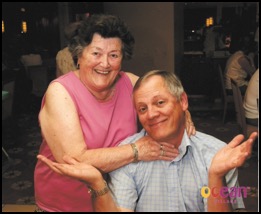
And the constant urge to keep moving on is still in your blood years after army life has ended. My childhood dream of visiting every country in the world is still very much alive, and at the moment my total stands at ninety-two countries visited so far. Hopefully, I will pass the halfway mark soon.’
Leslie Rutledge (b.1953).
PERSONAL STORY: 'A COUPLE OF YEARS AFTER THE CLASS PHOTO WAS TAKEN, WE WERE ON A SIX-WEEK VOYAGE TO JAMAICA'
Seeing the class photograph taken at a primary school in Sennelager, (West) Germany, that Leslie Rutledge included in Part IV of his story ('LIFE AS AN ARMY CHILD, 1950–70', and click here to view it) prompted Barbara Rayner (née Messenger) to contact TACA with two more photographs and the following message.
'I have read the site with interest, being a former army brat, and noted the photo posted by Leslie Rutledge of the primary school in Sennelager. What a coincidence that I was there at the same time and also have a photo of my class, probably taken on the same day!
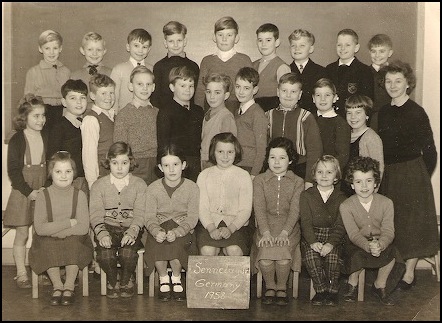
Above: Barbara's picture of her primary-school class in Sennelager, which dates from 1958. 'I am in the front row, second from the right,' Barbara notes, 'wearing Rupert Bear's trousers, according to my daughter!'
I have also seen several troopship photos, and just a couple of years after the class photo was taken, we were on the troopship MS Dunera, on a six-week voyage to Jamaica.
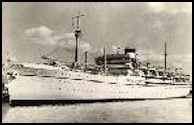
My father was in the REME [Royal Electrical and Mechanical Engineers], attached to the Royal Hampshire Regiment, and we stayed in Jamaica up to their independence day in 1962. What great times. We lived in married quarters in Up Park Camp, and I had the opportunity of going back there in 1989; I managed to access the camp and to revisit the house we had lived in almost thirty years previously.
After Jamaica, we returned to Germany and lived in Münster, where I attended Edinburgh School when it was just a few classrooms in a barrack block! Happy days.
Just to follow up, I also married an army child, and we have kept up the tradition of constantly moving, having lived in places such as Brazil, Botswana, the Philippines (twice), Cambodia, Hong Kong, Singapore, Dubai and Qatar!'
For more of Barbara’s mementoes and memories, click on the links: ‘PICTURES: TROOPSHIP TIPS, BOAC TICKETS AND TRAVELLING TO AND FROM TRIPOLI, LIBYA, 1950S’; ‘PICTURES: MEMENTOES OF A JOURNEY TO JAMAICA ABOARD THE MS DUNERA, 1960’; ‘PICTURES: ‘A GUIDE TO FAMILIES GOING TO THE CARIBBEAN’, 1959, AND REVISITING JAMAICA’S UP PARK CAMP IN 1990’; ‘PICTURES: ‘OUR HOUSE IN JAMAICA, PICTURED IN 1960 AND IN 1990’; and ‘PICTURE: A SCHOOL PHOTOGRAPH, UP PARK CAMP, JAMAICA, EARLY 1960S’.
PICTURE: A CHRISTMAS PARTY FOR ARMY CHILDREN AT THE CAMBRIDGE MILITARY HOSPITAL, ALDERSHOT, IN 1967
Peter Goble, who served in the Royal Army Medical Corps, has generously contributed ‘another little gem’ from the Goble family’s photograph album to TACA, along with some background information about the photograph reproduced below:
‘Taken at the Christmas party for the Cambridge Military Hospital, in Aldershot, Hampshire, in December 1967, this shows my then wife and our son, the same boy that you have in his cowboy kit at Dhekelia [see “PICTURE: MARRIED QUARTER IN DHEKELIA, CYPRUS, 1969”]. At the time, I was with 2 Casualty Clearing Station, at Aldershot, and living out at Inkerman Quarters, Knaphill, Woking.’
For more of Peter’s photographs, see: ‘PICTURES: SNAPSHOTS OF DHEKELIA, CYPRUS, 1968–72’.

A 1960S’ PRODUCTION OF CINDERELLA AT BICESTER, OXFORDSHIRE, AND OTHER CHRISTMAS PANTOMIMES AND TRADITIONS
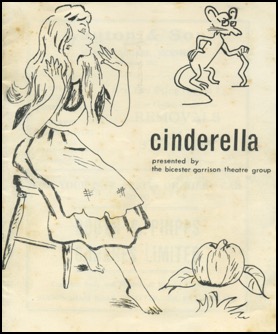
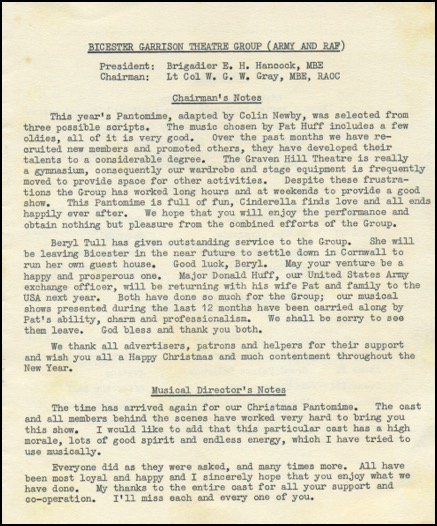
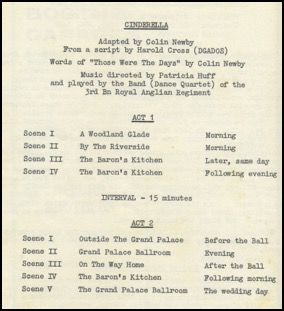
‘In most large forces bases, a Christmas pantomime was produced annually by husbands, wives and children for the entertainment of the garrison, with many wives and children being included in the audience. There was always an amateur dramatic society in large garrisons as some national servicemen had had some theatrical experience at school before being called up and many officers had been to university where there were amateur dramatic societies.’
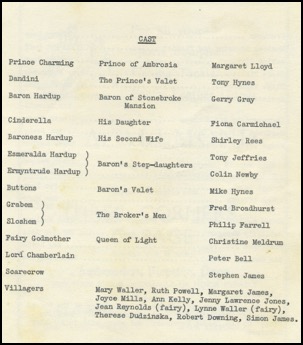
‘Regarding Cinderella, remember that I sent you a photograph of me appearing in a production at the Garrison Theatre in Bad Oeynhausen when I was eleven years old. This production was directed by Pat MacGregor of the YWCA [Young Women’s Christian Association], so it would appear that if a garrison was of one army unit (e.g., Bicester was RAOC [Royal Army Ordnance Corps]), then the local corps or regiment personnel put on the production, but if the garrison was of all regiments and corps, as at Bad Oeynhausen, then it was put on by an organisation like the YWCA.
I have remembered that it was customary at Christmas for the officers to serve the troops at a festive meal. In Mönchengladbach, in Germany, when I was 19, I assisted my father at one such event, wearing my merchant navy (midshipman/cadet’s) uniform. There was nothing unusual about a naval uniform at an army base, and with national service, most young men were in uniform in those days.
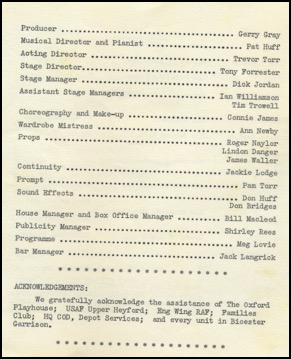
Your site has made me search back into my memory and all sorts of events keep popping up.’
PERSONAL STORY: 'I LOVE MY PARENTS AND THE ARMY FOR "DRAGGING" ME AROUND THE WORLD WITH THEM'
Kerry Millward's father was serving in the Royal Electrical and Mechanical Engineers (REME) when she was born in the British military hospital in Hanover (or Hannover), in what was then still West Germany, and later postings would take her family to Wickrath and Rheindahlen, also in Germany, as well as to Northern Ireland, England, Scotland and Gibraltar. Here is Kerry's lively and thought-provoking account of growing up in an army household.
'I was born in 1973, in BMH Hanover, West Germany, the youngest of three. My eldest brother was born there four years previously; my other brother was born in Reading, in the UK, in between. Dad was a corporal in the REME, always attached to so many different regiments that I lost track. Dad was with a corps, see, and I grew up believing that we were a bit better as Dad had a trade! We never had the luxury of travelling with other families, like the regiments did, but once in a blue moon we met up with families we had met years before – not for long, though, as we, or they, would soon be off again. I think the longest I ever knew anyone was two years, max. Army life was great then. Whilst abroad, we had free medical assistance, free dentists, everything. The UK was the problem.
We weren't in Hanover long, and then we moved to Northern Ireland. During this time – and we were there for two years – we hardly saw Dad, but from what I remember, it was fantastic fun. Here, I learnt to swim at two years of age – well, I got thrown in! We were all christened here, and it was the day before that that I cut off my fringe – well, I was bored! I also remember the house we lived in, the coal man delivering coal into the coal shed, and the "blue shop" from which we used to go and get sweets. Mum worked in the club on site, where I used to hold on to the buffer whilst she cleaned the floor – couldn’t do that now, eh? What with Health and Safety. Those days, all of the kids went to Sunday school (I think it was so that our mums could have a bit of peace and quiet, really).
"WE WERE SAFE IN GERMANY"
From Northern Ireland, we moved Blandford, Dorset. I don't remember that much, as we were not there for long: less than a year before moving to Rheindahlen, West Germany – well Wickrath, actually, then Rheindahlen. I went to the same school, though. Here, I had a teacher who would rap our knuckles if we wrote with our left hands. I used to cheat when she wasn't looking and would cry if I was caught as I knew what was coming. Apart from that, I loved it here. I loved the travelling and going to Austria on holiday, or going back to the UK – I mean, what child got that opportunity then? Visiting the UK was so strange to me as I had hardly lived there, so going back to where the family was from was like one big adventure. I always thought of UK schools as being like Grange Hill, and I was right when I eventually came back in 1987.
We were safe in Germany as we stayed within our "army" community and went to an "army" school. The only thing I regret was not being taught German, as this was only taught in senior school. (It can get really confusing now, as when people ask where I am from and I say "Germany", they expect me to be fluent in German!) We were typical kids, going out in the morning and only coming home when we were hungry, or catching the chip van when it came around, living on bratwurst or schnitzel. We met lots of interesting families out there – we are still in touch with one now – even Americans, as Rheindahlen was the biggest garrison town outside the UK. This was great for us kids as it was something new – strange, in fact, as we never really mixed with anyone from a different background: we all understood each other and never had to explain what was going on when we got posted to another place; they were all family to me, dysfunctional and naïve maybe.
We then moved to Aberdeen, Scotland. What a dump! Here, for the first time, I had to go "out" to a local school, and hated it. I was never bullied, but got sick and tired of trying to explain why I wouldn't be there long and trying to make them believe it when I told them of the places I had been to. I got really stuck into my swimming here, but this wasn't to last as we were only there for ten months before going to Gibraltar.
"GIBRALTAR: MY FAVOURITE!"
Gibraltar: my favourite! When Dad came home and told us that we were leaving, he first told us that it was for Hohne, Germany, but our destination was changed at the last minute. This was typical of the army, although I suppose that we were quite lucky that they only did it to us the once. I was made up that we were going back to Germany, back to people we didn't know, but had something in common with, but when Dad said, "No, it's not Germany, it's Gibraltar" weeks later, I remember a silence, then a "where"? Once mum (she was the intelligent one!) had told us where it was, I don't think any of us really knew what to expect. So we packed our MFO [military forwarding officer?] boxes, but ended up using them as furniture, they kept us waiting that long and messing our moving date around. This was great fun for us as we tried to get on to the highest box to have our tea, or wrote our new address on them with stencils.
We eventually moved, and when we stepped out onto the tarmac in Gib and the heat hit us, I thought, "Wow! I've moved to the other side of the world" (I was only ten). Then we saw the flat that we were to live in. It was right on the main street, next door to the church where John Lennon married Yoko Ono, and didn't we know it every Sunday morning when the bells got going! We moved four times, once every year, whilst in Gib. The first time was because the flat was too small for us three brats, and the other three moves were because they were doing up the flats. We were in Gib for four, nearly five, years, the longest posting ever, and I so wish that I could have finished my schooling here as I reckon I would have got better results if I had. But then you can't argue with the army. This also became apparent when Dad got called in and was reprimanded for me getting sunstroke! (Well, they saw it as parents not looking after their kids properly, but I mean, if I was out enjoying myself all day, how were they supposed to know in the days before mobile phones?)
We used to have summer activities every summer in Gib, organised by the forces (the navy, RAF and army were all together here). We all frantically filled in our timetables before the summer hols started to make sure that we got what we wanted. You could do anything from rock climbing through canoeing to ten-pin bowling – it was great. Mums didn't have to worry, and they knew where their kids were. Mum even helped at the Youth Club, but then my mum was the mum that all the kids went to. All mums were the same in the army: if one had to go out or go shopping, another mum would step in and keep an eye on their kids for them – this was the norm. Mum also used to organise shopping trips and days out by coach to Spain, as the borders were closed then. These were great: the kids used to go just to watch the adults get drunk and have a good time. Mum and Dad always threw parties as well, everywhere we went – Germany, Gib – we used to have such a laugh in our little community. It would be a real culture shock when Dad left the army to return to civvy street, where he had to return after twenty-four years' service. Even though we went to the local comprehensive school in Gibraltar, the locals were great. Because Gib isn't that big, they accepted our way of life – they didn't understand it, but they accepted it – and I'm still in touch with a lot of them today.
"IN SOME WAYS, I STILL CRAVE THE LIFESTYLE"
From Gibraltar, we moved to London, which is where it all turned, well, bad. I had never wanted to come back to the UK permanently, but knew that one day, maybe, I'd have to. I was fourteen, had two more years to go at school, and moved back at the wrong time. The only school I could get into was in Hendon, and I hated it. No one wanted to know me, which was very strange for me. In the end, the army suggested that I go to an army girls' boarding school in Hampstead. So I did, and it was worse than Holloway [prison]. The ironic thing is that I still had to be educated during the day at a local school as this boarding school didn't have the facilities to teach us academically. Still, the sports were quite good!
In 1991, Dad left the army, bought a house in England, has been here ever since and is now a prison officer (I suppose you get so used to working for an institution like the army that craving that security becomes a way of life). The army doesn't do enough for the men leaving, and does nothing for the families. I feel that it took years for Mum and us kids to adapt, and in some ways, I still crave the lifestyle. We couldn't get used to the fact that no one relies on or trusts others in civvy street, and that everyone is selfish.
All three of us kids left school with O' levels, GCEs or GCSEs. None of us stayed on for further education, but then no one did then: everyone wanted a job! All of us have good jobs now, so we didn't do that badly. My eldest brother joined the army and served for twelve years; since leaving, he has worked in the telecommunications market. My other brother is now in the RAF. As for me – well, I have a good job with the council, but oh, what I wouldn't give to travel again.
I have the fondest memories of growing up in the forces and would never change a thing. Kids then would otherwise never have had the chances that I had, and I love my parents and the army for "dragging" me around the world with them.'
Kerry Millward (née Taylor, b.1973).
PERSONAL STORY: BROTHERS IN ARMS
This army child's father was in the Royal Corps of Transport (RCT) until he left the army in 1992. Daniel reports:
'As a child, I lived in Hereford between 1980 and 1981; Münster, Germany, between 1981 and 1984; Bielefeld, Germany, between 1984 and 1987; Donnington (Telford), between 1987 and 1990; Fallingbostel, Germany, between 1990 and 1992; and then Donnington (Telford) again in 1992.
My brothers and I made Dad proud by following him into HM Forces:
I joined the Royal Navy and served between 1999 and 2004, seeing service all around the world, including during the last Gulf War (Op TELIC);
Matthew (b.1982) joined the British Army and served between 1998 and 2005, seeing service in the UK and Germany, as well as during the last Gulf War; and
Andrew (b.1984), who joined the RAF in 2003, is still serving, seeing service in Scotland and Cyprus.'
Daniel Phoenix (b.1980).
. . . & MISCELLANEA
SHOWING SUPPORT FOR THE ARMED FORCES, THEN AND NOW: ARMED FORCES DAY
In honour of Armed Forces Day, which most recently took place on Saturday 26 June 2010, and whose theme was 'Show your support', here's a World War I-era postcard showing a group of patriotic British children (dressed as Britannia, a sailor, a nurse and a soldier) demonstrating their support for the armed forces of their time.
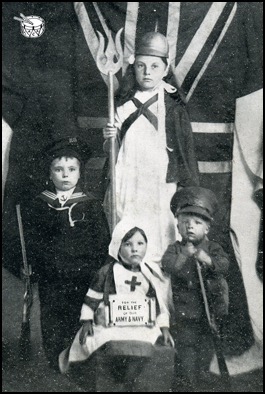

Supporting a service charity is a good way of backing the armed forces all year round. An A to Z of some of the charities that support today's armed forces is listed on the Armed Forces' Day website. Some, such as ABF – The Soldiers’ Charity, SSAFA Forces’ Help, the RAF Benevolent Fund, the Royal Navy & Royal Marines Charity and the Royal British Legion, also support the dependants of past and present military personnel. There are a few charities dedicated to forces' children, too, such as the Forces Children's Trust and the Royal Navy & Royal Marines Children’s Fund.
BACKGROUND INFORMATION: THE BRITISH FORCES POST OFFICE (BFPO) AND BFPO NUMBERS
The history of the British Forces Post Office (BFPO), whose mission statement is 'to provide an efficient and effective postal and courier service in order to sustain the fighting power of UK armed forces worldwide', can be traced back to 1808, when the first army post office was established. Having been reorganised and renamed many times since then, the twenty-first-century incarnation of the British Forces Post Office continues to provide mail and post-office counter services to forces personnel, their dependants and authorised civilians serving outside Britain. Visit the British Forces Post Office website, http://www.bfpo.mod.uk, to learn more about its services; to read a summary of its history, click on http://www.bfpo.mod.uk/aboutbfpo.htm; and for lists of early BFPO numbers and BAOR postcodes, see below ('TACA CORRESPONDENCE: BFPO, BTA AND MELF NUMBERS' and 'TACA CORRESPONDENCE: BAOR POSTCODES').
Many army children have received letters addressed to them care of a BFPO number, while those at boarding school have similarly written a BFPO number, along with 'Forces Mail', on envelopes containing their letters 'home', that is, to a soldier parent's current posting. The following alphabetical list of locations and corresponding BFPO numbers gives an indication of where army children were living, or their parents were serving, in 2008.

Belgium > Brussels: 49; Casteau: 26
Belize > Belize City: 12
Brunei > Seria: 11
Canada > Suffield: 14
Cyprus > Akrotiri: 57; Ayios Nikolaos: 59; Dhekelia: 58; Episkopi: 53
Denmark > Karup: 150
Falkland Islands > Byron Heights; South Georgia; Stanley; Mount Alice; Mount Pleasant: all 655
Germany > Berlin: 30; Bielefeld: 39; Celle: 23; Dulmen: 44; Elmpt: 35; Fallingbostel: 38; Gütersloh: 47; Hamburg: 30; Hameln: 31; Herford: 15; Hohne: 30; Mönchengladbach: 19; Münster: 17; Osnabrück: 36: Paderborn: 22; Rheindahlen: 40; Sennelager: 16
Gibraltar > Gibraltar: 52
Italy > Milan: 61; Naples: 8; Rome: 65
Kenya > Nairobi: 10
Nepal > Kathmandu: 4
The Netherlands > Brunssum: 28; Maastricht: 18
Northern Ireland > Aldergrove: 808; Ballykelly: 802; Ballykinler: 805; Holywood: 806; Lisburn: 801
Norway > Stavanger: 50
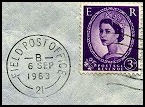
Portugal > Lisbon: 6
Sierra Leone > IMATT (SL): 622
Spain > Valencia: 62
Turkey > UK SUPU (Izmir): 599
USA > Virginia: 63; Washington, DC: 2
TACA CORRESPONDENCE: BFPO, BTA AND MELF NUMBERS
A brief outline of the history and purpose of the British Forces Post Office (BFPO) appears above (see 'BACKGROUND INFORMATION: THE BRITISH FORCES POST OFFICE (BFPO) AND BFPO NUMBERS'), along with some relevant links and a selection of BFPO numbers current in 2008. Peter Watson, whose nearly complete list of British Army of the Rhine (BAOR) postcodes can also be read below (see 'TACA CORRESPONDENCE: BAOR POSTCODES'), has suggested compiling a list of BFPO numbers following their introduction in 1957. A list of BFPO numbers pertaining to BAOR locations can be seen on the BAOR Locations website (to read it, click on http://baor-locations.co.uk/BFPO.aspx), but forces' personnel and their families were posted elsewhere in the world, too.
Peter has made a start by providing the following numbers and locations, and please contact TACA if you can add any more. Peter writes in addition: 'I also believe that in parallel with the BAOR system there were BTA (British Troops Austria) and MELF (Middle East Land Forces) numbers covering, at various times, Cyprus, Egypt and Libya'. Again, please contact TACA if you can supply any more information about BTA and MELF numbers.
BFPO 1: Hong Kong
BFPO 2: Washington, DC, USA
BFPO 57, 58: Cyprus
BFPO 69: Aden
TACA CORRESPONDENCE: BAOR POSTCODES
Further to the items on BFPO numbers above (see 'BACKGROUND INFORMATION: THE BRITISH FORCES POST OFFICE (BFPO) AND BFPO NUMBERS' and 'TACA CORRESPONDENCE: BFPO, BTA AND MELF NUMBERS'), Peter Watson has kindly provided TACA with a list of the British Army of the Rhine (BAOR) postcodes that were used in the immediate aftermath of World War II until 1957. You'll see some question marks in the list, and Peter also points out that the postcodes corresponding to the following locations have either not been identified or confirmed: Aachen, Bad Salzuflen, British Troops Belgium, Bünde, Dulmen, Göttingen, Hameln, Hilden, Husum, Münsterlager, Recklinghausen, Schleswig, Soltau, Wulfen and Wuppertal. If you can supply the missing name of the place, or places, that correspond to the numbers in question, or can confirm a tentative guess, please contact TACA.
BAOR 1: Bad Oeynhausen/HQ BAOR
BAOR 2: Berlin/RAF Gatow
BAOR 3: Hamburg
BAOR 4: Düsseldorf/Duisburg/Essen/Hilden (?)/Mülheim/Wuppertal(?)
BAOR 5: Hannover [Hanover]/Hameln [Hamelin] (?)/RAF Wunstorf
BAOR 6: Kiel/Plön/Neumünster
BAOR 7: ?
BAOR 8: Lüneburg
BAOR 9: Wuppertal (?)
BAOR 10: Osnabrück
BAOR 11: Braunschweig [Brunswick]
BAOR 12: Münster
BAOR 13: RAF Sylt
BAOR 14: Dortmund/Hamm/Witten-Annen/Wetter
BAOR 15: Detmold
BAOR 16: Paderborn/Bad Lippespringe/Sennelager
BAOR 17: Herford
BAOR 18: Hook of Holland
BAOR 19: Köln [Cologne] /Bonn/RAF Wahn/Wahnerheide/RAF Butzweilerhof
BAOR 20: Soltau (?)/ Münsterlager (?)
BAOR 21: Frankfurt/Baden-Baden
BAOR 22: Lübeck
BAOR 23: Celle/Hohne/RAF Fassberg
BAOR 24: Iserlohn/Menden
BAOR 25: Oldenburg/Wilhelmshaven/RAF Jever
BAOR 26: Hildesheim
BAOR 27: ?
BAOR 28: Delmenhorst (?)/RAF Ahlhorn (?)
BAOR 29: Minden
BAOR 30: Fallingbostel
BAOR 31: Schleswig (?)/RAF Schleswigland (?)
BAOR 32: Verden/Liebenau/Nienburg/Rotenburg
BAOR 33: Goslar/Bad Harzburg
BAOR 34: Krefeld/Willich/Brach/RAF Laarbruch/RAF Geilenkirchen
BAOR 35: RAF Eindhoven
BAOR 36: ?
BAOR 37: ?
BAOR 38: Bad Eilsen/HQ RAF (G)*/RAF Bückeburg
BAOR 39: Bielefeld/HQ 1 (BR) CORPS/RAF Gütersloh/RAF Sundern
BAOR 40: Mönchengladbach/Rheindahlen/HQ BAOR/HQ RAF (G)**
BAOR 41: Lippstadt
BAOR 42: Lübbecke
BAOR 43: ?
BAOR 44: Hilden (?)
NOTES
* Bad Eilsen/HQ RAF (G) originally BAOR 1? Allocated separate postcode in an as yet unconfirmed year due to the volume of mail.
** HQ BAOR/HQ RAF (G) moved from Bad Oeynhausen/Bad Eilsen to Rheindahlen in 1954 and were reallocated to BAOR 40.
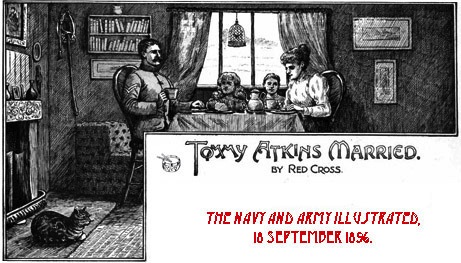
'EVEN THE WEEK-OLD INFANT IS SUPPLIED WITH A GOVERNMENT RATION': CHILDREN OF THE REGIMENT IN 1896
In the article 'Tommy Atkins Married', which was published in The Navy and Army Illustrated on 18 September 1896, its author ('Red Cross') explains that when on an overseas posting (in India, for instance), army children were issued with government rations, but when stationed in England, their mother bought most of the family's food, a common feature being a vegetable patch supplying home-grown produce. (Click here for Red Cross's description of the children of the regiment in 1896; here for a description of how they were accommodated; and here for observations on their schooling and musical proficiency; and see below for some official guidelines concerning food extracted from A Guide for Families in Germany, dated May 1954.)
'It is a source of good-humoured amusement to the soldier's wife going to a foreign station for the first time, to find, that when in England with good healthy appetites, with the exception of the husband's pound of bread and three-quarters of a pound of beef, all food had to be purchased, in their new home not only the wife but even the week-old infant is supplied with a Government ration. If we suppose a family of five children, we find a joint weighing 5½-lbs. laid on the table every second day. A very good thing, you say! Yes, it is, but when the heat makes you feel with Douglas Jerrold that you would like to throw off your flesh and sit in your bones, a large joint of meat does not appeal to one quite in the same way as it would at home in England.
In most garrisons, both at home and abroad, each married soldier has a piece of ground in which he cultivates potatoes and other vegetables sufficient for his family, a small space being almost always reserved for flowers, without which no soldier's wife would be happy.'
SOME CHRISTMAS RECIPES FOR THE FAMILY: CHRISTMAS FARE 1949
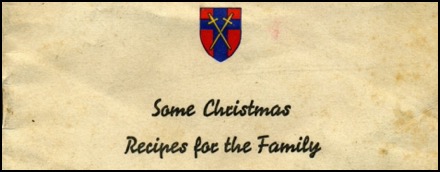
December 1949 saw army families preparing for Christmas in much the same way that they do today, sixty years later, including planning and making an array of traditional dishes for the festivities. The extracts that appear below are taken from a small booklet entitled Some Christmas Recipes for the Family: Christmas Fare 1949, which was issued by the Army Catering Corps and printed by the Royal Army Ordnance Corps, British Army of the Rhine, for 'married families' stationed in West Germany. Many of the recipes given (they are only listed here) are for dishes that are still being enjoyed today, but there are some subtle, but telling, differences, too. For example, certain foodstuffs that we now take for granted were then presumably considered either luxury items, unobtainable or unsafe to eat when living in an occupied country only four years after the end of World War II, as suggested by the inclusion of the 'mock marzipan' and 'mock cream' recipes. (See 'A GUIDE FOR FAMILIES IN GERMANY, MAY 1954: FOOD', below, for advice on the consumption of fresh German milk and cream that was given to families posted to West Germany five years later, and note that the booklet’s introduction states that all of the ingredients could be obtained from the basic ration or the NAAFI). And what 'lady of the house' would today consider making potato crisps rather than buying them? Space does not allow the recipes themselves to be reproduced, but if anyone is interested in reading the instructions given for making 1949-style 'Camperdown Sauce', or any other dish listed below, please contact TACA for further details. (And see below for details of a similar booklet dating from 1950.)

'Introduction
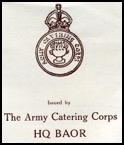
In selecting these recipes, consideration has been given to the variety and availability of supplies, in the British Zone. All commodities specified are supplied with the RASC [Royal Army Service Corps] basic ration, or may be purchased from the NAAFI grocery shops.
Army Catering Corps advisors are attached to all formations, and they will be pleased to give any additional assistance to married families that may be required. They can be contacted through the local RASC Supply Officer.
[Soups]
Chicken Broth; Cream of Leek Soup; Giblet Soup; Cream of Tomato Soup
Poultry
To Truss a Fowl for Roasting; The Christmas Turkey; Roast Fowl or Chicken; Roast Pheasant; Baked Stuffed Hare; Chicken or Turkey Cutlets
Stuffing for Meat and Poultry
Force-meat Stuffing; Mint Stuffing; Apple and Celery Stuffing; Sage and Onion Stuffing; Chestnut Stuffing
Puddings and Cakes
Christmas Pudding; Brandy Butter; Camperdown Sauce; Christmas Cake; Rich Mincemeat; Charlotte Russe; Puff Pastry; Mock Marzipan; Short Paste; Pumpkin Pie; Mock Cream; American Frosting; Bourbon Type Biscuits

Small Cakes
Small Sponge Cakes; Brandy Snaps; Short Bread; Almond, Petit Fours; Sponge Suitable as a Basis for Trifles, Russian Squares, Charlotte Russe, etc; Lady Finger Biscuits; Basic Small Cake Mixture; Rock Cakes; Raspberry Buns; Sultana Cakes; Tea Scones; Chocolate Scones; Bordeaux Tartlets; Royal Icing; Fondant
Suggestions for a Buffet Supper
Apart from the family Christmas dinner, the highlight of the festivities is usually the Christmas party, when often a large number of friends are invited. It is not always possible to have the normal "sit down" supper and the catering often causes the lady of the house a severe headache. From commodities available from the rations and those that can be purchased from the NAAFI Families Shop quite a reasonable spread can be produced.
From NAAFI:–Tinned Herring Roes, Anchovies, Shrimps, and Prawns, Salad Dressing, Bottled Olives, Pickled Walnuts, Gherkins and Sliced Ham. From the ration, left over bacon trimmings, cheese, cooked liver, sausages and an egg or two. Perhaps a tin of sardines or salmon you saved. The major part of the buffet can be made up into "finger" items canapes, cheese straws, crisps, brandy snaps and fudge. Sandwiches of course are ideal if they are kept in damp cloths until the last moment.
The base of the canapes can either be toast or short pastry, cut into fingers, rounds or diamonds.
A good idea for serving attractive sandwiches is first to remove crusts, slice thinly, and cut into various shapes. The top slice being cut out with various pastry cutter shapes, so that the filling can be seen.
All there is to do now is to make the cheese straws, little sausage rolls, potato crisps, brandy snaps and fudge and there is quite an attractive spread with the minimum of cost. Finally a word of advice on serving up. A good idea is to mix the savouries, it is always more attractive to make a selection when the plate is handed round, and try to lay up your buffet table as late as possible, food soon deteriorates in a rather hot humid atmosphere.
Anchovies on Toast; Sardines on Toast: Liver Pate on Toast; Cornets of Ham; Anchovy Eggs; Stuffed Bacon on Toast; Herring Roes on Toast; Vol-au-Vent; Potato Crisps; Cheese Straws.'

CHRISTMAS RECIPES FOR THE FAMILY 1950
A few Christmases ago, we posted a piece, above, based on a booklet published by the Army Catering Corps for service families living in BAOR (British Army of the Rhine) entitled Some Christmas Recipes for the Family: Christmas Fare 1949. A similar booklet was issued in 1950 ‘for the use of married families’, with food rationing and availability again having been taken into consideration.

The recipes that appear under the headings ‘Soups’, ‘Poultry’, ‘Stuffing for Meat and Poultry’, ‘Puddings and Cakes’ and ‘Suggestions for a Buffet Supper’ are essentially identical to those of 1949, but with a few additions, as follows:
Soups: Potage Garbure;
Poultry: French Rabbit Stew; and
Puddings and Cakes: American Angel Cake.
Although most of the recipes are for classic English dishes and Christmas fare, the lack of certain traditional ingredients is notable – butter, for example, being replaced by margarine. Nevertheless, no doubt the brandy snaps created by the recipe printed below still went down a treat with the army children of 1950.

A GUIDE FOR FAMILIES IN GERMANY, MAY 1954: FOOD
A Guide for Families in Germany (including 41 Garrison, Hook of Holland), a BAOR Publication dated May 1954, provides a detailed insight into how the army accommodated, catered and cared for and entertained army families posted to BAOR (British Army on/of the Rhine) fifty-five years ago, nine years after the end of World War II. 'Produced with the object of answering many queries which will arise during your stay in Germany', a paragraph in the pamphlet's introduction sets the scene:
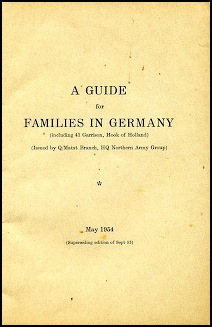
Reproduced below (complete with idiosyncratic punctuation) is a selection of information on 'food for families' given by the pamphlet. (Click here for the advice given on medical services; here for travel regulations; and see below for details of shopping and the NAAFI, and entertainment.)
'Part 3 – Food
1. General
Food for families is now available from three sources: The Army (RASC Rations), NAAFI, and German shops.
At one time families were almost entirely dependant upon Army rations, due to the fact that Germany was not self-supporting in food, also because of the international financial problems involved. Thus, families received a fixed ration which, being inflexible, was not the ideal basis for family catering.
With foodstuffs becoming increasingly plentiful on the German market, and with a greater range in NAAFI shops, the Army ration scales have been revised to provide greater flexibility.
There are five main scales which provide a full ration. These are known as Scale 1 (Husbands and Boys over 14); Scale 2 (Wives and Children over 12); Scale 3 (Children 5–11 years; Scale 4 (Children 1–4 years); and Scale 5 (Infants 0–1 year).
In addition, there are now two alternative scales to each main Scale except Scale 5. These provide the main foodstuffs, but exclude various items which the family may prefer to purchase from NAAFI or German shops.
The first alternative scales exclude oatmeal, cereals, macaroni, tinned fish, onions, dried vegetables, cocoa and condiments, but include fish, fruit, vegetables, jam and flour.
The second alternative scales provide main items only, viz, bread, meat, bacon, eggs, tea, sugar, milk, butter, margarine and cooking fats.
Thus a family has the option of taking the higher Army scales which provide a complete but rather rigid diet, requiring only a few extras to be bought outside; or of taking the lower alternative and cheaper scales supplemented by purchases from NAAFI or German shops, which give greater scope and variety.
Q10: Is it safe to eat food obtained from German shops or in German restaurants?
A: Yes. Certain worm diseases are commoner in Germany than at home, but can be prevented by thorough cooking or food. Thorough cooking is especially important in the case of pork and pork products, such as sausages. Fresh pork should be cooked so that it is white all through and no red portions remain; smoked ham should not be eaten uncooked. Fresh vegetables, which are to be eaten raw should first be washed thoroughly in running water for five minutes. All kinds of fresh-water fish should also be well cooked.
Q11: Is German ice-cream safe?
A: Do not let your children eat ice-cream, except from NAAFI sources. German ice-cream is not subject to British medical supervision.
Q12: Is it safe to drink milk and cream from German sources?
A: Fresh German milk and cream is not controlled by the military medical authorities, who cannot therefore guarantee that its consumption will not lead to serious infectious disease. Pasteurised milk and cream, bottled in the dairy and sold in sealed bottles is the safest on offer to the German public. Milk distributed in churns or cans is liable to contamination in distribution and cannot be considered safe unless boiled before consumption. All milk can be made safe by boiling.
German cake fillings made from milk or cream should not be eaten as they are liable to contamination in distribution and cannot be sterilised after manufacture.
Tinned milk from a sound tin is safe.
Part 13 – The Family Meat Ration
The meat issue is one of the most important items in the family ration, and no effort is spared to ensure distribution on the basis of 'fair share'. Complaints received often indicate a lack of knowledge of the system of supply, and the method by which the Quartermaster computes his families' entitlements. Frequently the causes of complaints can be attributed to the actual cooking process.
Q1: Where does the meat come from?
A: The supply of meat is regulated by the Ministry of Food in London. The main part of the meat ration for the Army is imported from Australia, New Zealand and South America. The meat is received direct from the producer and the quality is equal to that supplied to the civilian population in the UK. . . .
Q2: What weight of meat should my family receive?
A: The ration issue of meat is scaled for the various members of the family as follows:–
Husband: 5 ozs per day = 2 lbs 3 ozs per week
Wife: 4 2/7 ozs per day = 1 lb 14 ozs per week
Child 5–11 yrs: 3 ozs per day = 1 lb 5 ozs per week
Child 1–4 yrs: 2 ozs per day = 14 ozs per week
Children of 12 years and over receive Scale 2 rations. A boy on reaching the age of 14 years will receive Scale 1 rations.
As an example a family of four comprising husband, wife, and two children aged eight and three, would be entitled to 6 lbs 4 ozs meat per week. This may be issued once weekly if the family so desires, but it is usually more convenient to receive two days' rations on Tuesdays and Thursdays, and three days' rations on Saturdays. In this case the family would receive 1 lb 12 1/2 ozs on Tuesdays and Thursdays, and 2 lbs 11 ozs on Saturdays. It is, of course, obvious that a delivery twice a week would produce a more satisfactory joint.
The scales quoted above include bone.'
CHRISTMAS IN BAOR
The advertisement below, for Christmas toys sold by the NAAFI, dates from the time when BFG (British Forces Germany) was BAOR (British Army of the Rhine), and probably from the 1950s.
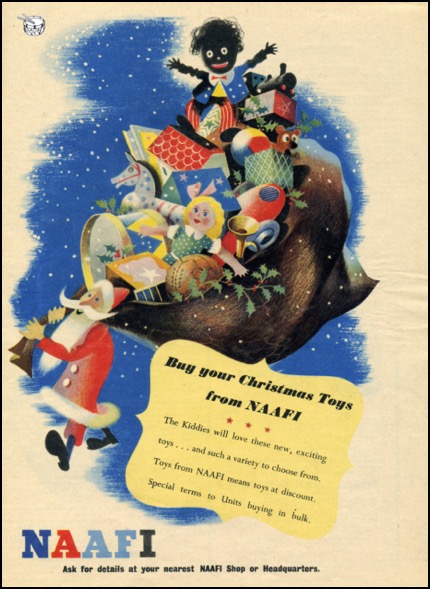
There were, in fact, two BAORs. While the second was established in 1945, at the end of World War II (it existed until 1994, when BFG replaced it), the first came into being in 1919, following World War I, and was disbanded ten years later, in 1929.
The following treasures in the British Pathé archive transport us back in time and give us a flavour of how British army children experienced life in both BAORs, including at Christmas.
‘All home for Xmas’, a video newsreel film dated 1929, features ‘Tommies’ kiddies’, who were all born on the Rhine, being prepared by their teacher for their imminent departure for ‘Blighty’. Also shown is their ten-year-old garrison school (a sign outside says ‘the Rhine Army Central Schools’). Click on the link to view this fascinating piece of film: http:// www.britishpathe.com/record.php?id=21196.
Two further video newsreel films show army children celebrating Christmas in 1953. In ‘Christmas in Hamburg’ (http://www.britishpathe.com/ record.php?id=81821), children sing a carol in a chapel, conducted by an army chaplain. ‘Christmas in Hanover’ (http://www.britishpathe.com/ record.php?id=81822) includes the Whitehouse family decorating their married quarters, as well as soldiers’ families leaving the NAAFI toy shop.
For more information on the NAAFI in (West) Germany, such as what it sold and where its shops were located, see below, ‘A GUIDE FOR FAMILIES IN GERMANY, MAY 1954: THE NAAFI’.
A GUIDE FOR FAMILIES IN GERMANY, MAY 1954: THE NAAFI
Published in May 1954, the pamphlet A Guide for Families in Germany (including 41 Garrison, Hook of Holland) was intended to give the families accompanying British servicemen on postings to BAOR (British Army on/of the Rhine) an idea of what to expect on their arrival in (West) Germany in the way of, for example, food (see above for more information), entertainment (see below), travel regulations (click here for more) and medical services (click here for further details), and to advise them on other practical issues. While NAAFI-run canteens and clubs were open to service families for purposes of relaxation and entertainment (see below for more), there were also (and still are) a number of NAAFI shops in Germany, as described and listed below in extracts from the pamphlet, which was presented in question-and-answer format.
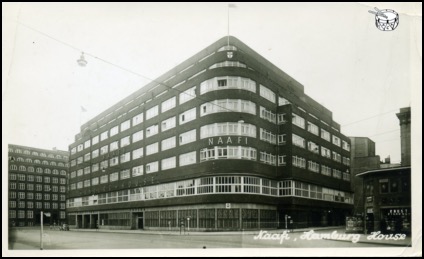
Above: The NAAFI at Hamburg House, Hamburg, (West) Germany.
Founded in 1920, 2010 marks the NAAFI's ninetieth anniversary; you can read more about the Navy, Army and Air Force Institutes and the organisation's history by visiting its website: http://www.naafi.co.uk.
'Part 4 – The NAAFI
1. General
NAAFI (Navy, Army and Air Force Institutes) is the official canteen organisation for HM Forces in peace and war.
Its main task is to provide a permanent Canteen service for HM Forces at home and overseas. In addition NAAFI operates shops for Service families, bulk stores for units and messes and clubs for Officers, Warrant Officers and Sergeants and Junior Ranks.
2. Questions and answers
Q1: What can I buy in NAAFI Family Shops?
A: As explained in Part 3 of this Guide, your basic food items such as meat, bread, eggs, butter, etc, are issued by the RASC. So far as foodstuffs are concerned, the primary function of NAAFI Shops is to supplement the basic RASC entitlement, thus providing a more varied diet for families.
Family Shops sell the following:–
(a) Groceries, provisions and baby foods.
(b) Tobacco, cigarettes and confectionary.
(c) Beers and wines: mineral waters, squashes and other soft beverages.
(d) Fresh fruit and vegetables.
(e) Cakes, pastries, bread rolls and other bakery products.
(f) Soaps and hardware.
(g) Gifts, toys and stationery.
(h) Cosmetics, toilet requisites and medical sundries.
Many of the larger shops also supply footwear, drapery, haberdashery, babywear, clothing and piece-goods.
Q2: Where are the NAAFI Shops?
A: NAAFI Family Shops are divided into three general categories:–
Class 'A' – which carry the whole range of goods including footwear and seasonal Fashion Clothing.
Class 'B' – which carry the whole range of goods excluding Footwear and seasonal Fashion Clothing.
Class 'C' – which operate in smaller premises and carry a limited range of items (a) to (h) above plus some haberdashery.
In Germany these Family Shops are located as follows:–
Class 'A'
HAMBURG, HANNOVER, MUNSTER, HERFORD, CELLE, BAD OEYNHAUSEN, OLDENBURG, BERLIN-CHARLOTTENBURG, DORTMUND, LUNEBURG, ISERLOHN, DUSSELDORF-STOCKUM, COLOGNE, BUCKEBURG, BIELEFELD, OSNABRUCK.
Class 'B'
MINDEN, VERDEN, BAD SALZUFLEN, FALLINGBOSTEL, DELMENHORST, HOHNE-LOHEIDE, GUTERSLOH, HOOK OF HOLOLAND, BAD LIPPSPRINGE, GOSLAR, WILDENRATH, DETMOLD, WUPPERTAL, LIPPSTADT, BRUNSWICK, MUNSTER-LAGER.
Class 'C'
NIENBURG, LEMGO, MUNCHEN-GLADBACH, BAD EILSEN, FASSBERG, SYLT, JEVER, BUTZWEILERHOF, AHLHORN, TROISDORF, BUXTEHUDE, GOTTINGEN, BAD GODESBERG, WAHN, UTERSEN, NEUMUNSTER, SOLTAU, KIEL, SOEST, WESENDORF, GEILENKIRCHEN, KREFELD, HUBBELRATH, HILDESHEIM, HILDEN, BUNDE, CUXHAVEN, LUBBECKE, BRUGGEN.
Families that usually deal at Class 'B' or 'C' shops are given transport facilities for visiting their nearest Class 'A' shop once per month.'
A GUIDE FOR FAMILIES IN GERMANY, MAY 1954: ENTERTAINMENT
Perhaps the most important subjects addressed by A Guide for Families in Germany (including 41 Garrison, Hook of Holland), a booklet published in May 1954 in question-and-answer format to prepare army families for a posting to (West) Germany, were those concerning medical care and food (for more, see TACA's 'HEALTHCARE & HOSPITALS' page and above), as well as travel (click here for more). The following extracts from the booklet cover the types of entertainment available to British service personnel and their families less than a decade after the end of World War II. They included NAAFI-run canteens and clubs (and see above for more on NAAFI shops); sports clubs; radio programmes broadcast by the British Forces Network (BFN); films screened by the Army Kinema Corporation (AKC); shows put on by the Combined Services Entertainment Unit (CSEU); and Boy Scouts and Girl Guides groups for army children.
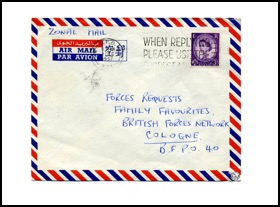
'Part 4 – The NAAFI
Q4: Are there any clubs or restaurants open to families in Germany?
A: Yes. In addition to many canteens operated by NAAFI for units in which visitors' rooms for the use of families of men in the units are provided, NAAFI also operates a number of Officers' Clubs, Warrant Officers' and Sergeants' Clubs and Clubs for Junior Ranks. At the discretion of the Services' Committee of each club these may be used by families according to the rank of the husband. Clubs all include a bar, a restaurant, light refreshment service, and nearly all have lounges, games rooms, reading rooms and a gift shop.
Clubs for Junior Ranks are operated at:
BAD OEYNHAUSEN, HAMBURG, CELLE, MUNSTER, MINDEN, DUSSELDORF, LUNEBURG, OLDENBURG, OSNABRUCK, SYLT, MOHNE SEE, BERLIN,
and in nearly all of these NAAFI/WVS [Women’s Voluntary Service] members look after recreational amenities. WVS also work in some fifty canteens.
Clubs for Warrant Officers and Sergeants are operated at Dusseldorf and Mohne See. In addition, separate Warrant Officers’ and Sergeants’ sections of the Junior Ranks Clubs are operated at:
BERLIN, CELLE, HAMBURG, MINDEN, MUNSTER, ISERLOHN, OSNABRUCK, SYLT.
Clubs for Officers are operated at:
BAD OEYNHAUSEN, BERLIN, CELLE, COLOGNE, BUCKEBURG, GUTERSLOH, HAMBURG, DUSSELDORF, ISERLOHN, MUNSTER, LUNEBURG, HANNOVER, OLDENBURG, MINDEN, VERDEN, OSNABRUCK, BIELEFELD.
Part 12 – Miscellaneous
Q6: What facilities are there for sports and games?
A: All ranks and their families serving in BAOR have ample opportunity for taking part in a wide range of sports and games. In addition to the usual synopsis facilities for football, rugby, hockey and cricket there are tennis courts in nearly all garrisons, squash courts at the larger centres and polo racing and riding for horse lovers. There are sailing clubs on various large inland lakes throughout BAOR and at KIEL and a gliding club for those who indulge in this sport. There are also zonal shooting and fishing committees through whom individuals can obtain permission, on payment, for game shooting and game and coarse fishing. In short, all ranks and their families are fully catered for.
Q7: What other entertainment is available?
A: The following are provided:––
a) The British Forces Network (BFN) provides everyone serving in Germany with local weather forecast and news in addition to UK news bulletins and a wireless programme every day on the lines of the BBC Light Programme.
b) The Army Kinema Corporation (AKC) supplies excellent full size cinemas in all the large garrisons. In the smaller stations 16 mm cinemas are provided in most cases. The programmes consist of up-to-date films and the prices for admission compare very favourably with those in the UK.
c) The Combined Services Entertainment Unit (CSEU) provides during the year a regular flow of theatrical companies who visit all the main garrisons in Germany. They consist of plays, musicals, variety, etc, and many are West End companies. In addition a number of small mobile shows visit the smaller garrisons
CSEU aims at providing everyone in Germany with access to live theatrical entertainment at least once each month. For the amateur actor there are a number of unit and garrison theatre clubs who always welcome new talent.
Q9: Are the Boy Scouts and Girl Guides in Germany?
A: Yes. Full particulars can be obtained from:––
The Organising Commissioner
Boy Scouts Western Europe
c/o HQ British Forces Education Service
BAOR 15
and/or
The Zonal Commmissioner
British Guides in Germany
c/o The Services Relations Adviser
WAHNERHEIDE, BAOR 19'
PICTURE: RHEINDAHLEN DISTRICT SCOUT BADGE
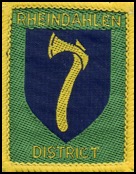
FICTITIOUS ARMY CHILDREN
Army children, real or imaginary, make appearances in literature, on the silver screen and in all manner of situations, some more predictable than others. Some fictitious army children have been immortalised in literature and the arts. These include:
- the daughters of Major-General Stanley, including Mabel, Edith, Kate and Isabel, in W S Gilbert and Arthur Sullivan's comic operetta, The Pirates of Penzance (1879);
- black-haired Cris Delighan, the thirteen-year-old Colour-Sergeant's daughter and sweetheart of Lew in Rudyard Kipling's story 'The Drums of the Fore and Aft' (1889);
- chiropodist Elen Grass, an adult character in Nicola Barker’s novel Darkmans (2007); and
- the comatose Silvia Shute and her sister, Jo, adult characters in Dawn French’s novel Oh Dear Silvia (2012).
QUESTION: BARRACK RATS, ARMY BRATS AND PADS' BRATS
Although army children have attracted many nicknames over the centuries, a few in particular seem to have stuck, including 'barrack rats', 'army brats' and 'pads' brats' (i.e., children living in married quarters, or 'pads'). Do you know when they started to be used? And was 'army brat' borrowed from American terminology?
Alan Greveson suggests:
'In his book Army Apprentices Harrogate [Halsgrove, Devon, 2002, ISBN 1841142182, p.14], Colonel Cliff Walters has this to say on the history of nicknames: ". . . Those in adult service have used terms of endearment such as jeeps, badgies, rats and brats. The latter two probably derive from the initials of the Boys' and Army Technical Schools. Even today the ex-brat is a well used reference to the Harrogate 'old boy' and there were badgies in Harrogate when the Barracks were occupied by the Royal Artillery. Apprentices from Chepstow [Boys' Technical School] have always been known as robots". It seems the names, though, are much earlier than the 1920s' shoulder badges of junior leaders.'
For more ideas, see 'NEW RESEARCH: THE ORIGINS OF THE TERM 'BRAT''.
QUESTION: AN INFLUENTIAL START IN LIFE?
A former army child contacted TACA with the observation that, on reflection, being an 'army brat' had had a significant influence on his life (particularly, in his case, as it gave him a public-school education). It would be interesting to know whether, looking back, other former army children would agree, and, if so, whether the experience had a positive or negative effect on their later lives.
QUESTION: 'WHERE IS MY HOME?'
A former army child has contacted TACA with a question that will strike a chord with many others, whenever, and wherever, they were born:
'My Dad was in the army for over thirty years. Lived all over the world.
When he retired, he came home. My Mum came home. Often wonder, where is my home?'
Peter Anderson (b.1956).
PERSONAL OBSERVATION: THE PSYCHOLOGICAL EFFECTS OF A FORCES' CHILDHOOD
The peripatetic military life can have long-lasting consequences for army children – negative, as well as positive. For example, a former army child, who was born in 1942, has contacted TACA with the following message: 'suffering from depression at present. Need to consider childhood disruption'.
PERSONAL OBSERVATION: 'I HAVE NO MEMORIES'
Marie O'Brien, who was born in 1965 in Iserlohn, (West) Germany, has contacted TACA to highlight one of the negative consequences of the peripatetic army lifestyle. Marie writes:
'One thing I feel is that I don't know where I come from. All my family have memories of where they were brought up, but because of issues in my life, I have only vague memories. My dad was in the Royal Artillery and served in Germany for seven years (he left the army in 1972). When we left Germany, when he was posted to Barton Stacey, I was only three years old. According to my mum, we lived just within walking distance of the barracks in Menden – she thinks it was Bismarck St. We have no pictures of where I stayed, so I don't know what it looks like or where to look on a map, which gets very frustrating. I look at all these pictures of Iserlohn and wonder, "Is that where I stayed? Did I play in that area? Did I go to a nursery there? Where did my brother and sister go to school?" (Daniel and Yvonne are older.) It is a horrible feeling, especially when I can go on the internet and look at the streets and area that my mum and dad grew up in.'
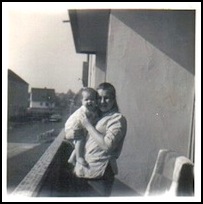
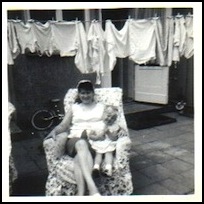
Above and below: Marie and her family pictured during her early years.

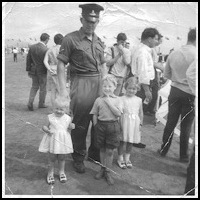
TACA CORRESPONDENCE: THE PROS AND CONS OF AN ARMY CHILDHOOD
Anne Miller has contacted TACA to share her thoughtful views on the pros and cons of growing up as an army child.
'I read about TACA in the New Cavalier and was interested in looking at the website. I was an "army brat" until I was 18, living in many countries. It was an interesting life and made me very self-reliant, but it is a life that does leave you with no definite roots, although I would not have changed any of it. I do look at my friends and realise that although they have a remembered past history, I have a life of blurred memories and changing friends that I might possibly bump into again but probably would not.'
'CONFLICTS OF INTEREST': AN EXHIBITION AT THE NATIONAL ARMY MUSEUM
'Conflicts of Interest' opened on 12 September 2009 at the National Army Museum in Chelsea, London. The exhibition's dual focus is on the British Army's global role over the past thirty years, and the conflicts in which British service personnel have been involved on the one hand, and, on the other, on the impact that their involvement has had – and continues to have – on the personal level.
The international conflicts covered by the exhibition include those in the Falklands, Bosnia and Herzegovina, Kosovo, Sierra Leone, Afghanistan and Iraq, while the 'Conflicting Communities' section shines a spotlight on Northern Ireland. The various issues examined in the 'At Home' area include the effect that being a serving soldier has on home life; the consequences of post-traumatic stress disorder; problems experienced by military veterans; and the implications inherent in the 'military covenant'. In addition, the 'Conflicting Opinions' space is an interactive area that provides a forum for debate, to which visitors are invited to contribute.
For further information on the exhibition, click here: http://www.nam.ac.uk/exhibitions/permanent-galleries/conflicts-interest-1969-present.
TACA CORRESPONDENCE: SEEKING OLD FRIENDS, HONG KONG, 1956–58
David Rumford is keen to re-establish contact with any friends who knew him in Hong Kong between 1956 and 1958, when he attended St George's School, or from Stanley Fort, also in Hong Kong. David writes: 'We were with the 1st Battalion, Green Howards, and my dad, WO2 Frank Rumford, was the provost sergeant. We were in Richmond, North Yorkshire, before that'. You can e-mail David either directly (d.rumford@hotmail.co.uk) or through TACA.
TACA CORRESPONDENCE: LOOKING FOR OLD FRIENDS
Helen Posaner (née James) would like to hear from anyone who remembers her when she was an army child. Her father, Arthur (Alec) James, served in the Royal Electrical and Mechanical Engineers (REME), and Helen lived in Fallingbostel, (West) Germany, between 1965 and 1967 (when her father was with 7 Armoured Workshop) and then in Colchester (when he was with 36 Command Workshop). Helen’s e-mail address is: helen_posaner@hotmail.com.
TACA CORRESPONDENCE: SEEKING A SCHOOLFRIEND, (WEST) GERMANY, 1978–81
TACA has received the following message from Linda McIver, who is trying to trace a friend from her schooldays – 1978 to 1981 – in Sennelager and Gütersloh, (West) Germany. Linda, whose father was in 39 Heavy Regiment, Royal Artillery, writes: 'We went to John Buchan Middle School [in Sennelager] and then went on to King's Secondary School in Gütersloh. We used to live across the road from each other, then her father was moved to somewhere else for a short time; then they came back, but moved to another part of the area. Her name is/was Sharon Spence, and her father was at the time a warrant officer. Can you help? Her last address would be great, thanks.' Linda can be contacted through TACA.
TACA CORRESPONDENCE: LOOKING FOR LOST FRIENDS
Nathan Williams has e-mailed TACA listing the places where he lived as an army child. His father, who was in the 1st Royal Regiment of Wales, was based in Lemgo, (West) Germany, at the time of Nathan's birth in Rheindahlen, (West) Germany, in 1985, and Nathan later lived in Hong Kong (1989–1990); Bridgend (1991–95); Twickenham (1996–98); and Paderborn, Germany (1998–2000). Nathan says that he's trying to locate friends who attended school with him in these locations, particularly anyone who went to King's School, in Gütersloh, Germany, between 1998 and 2000 and Whitton School, in Twickenham, between 1996 and 1998. To contact Nathan directly, e-mail swimfan2k@googlemail.com.

